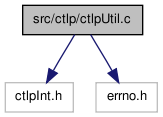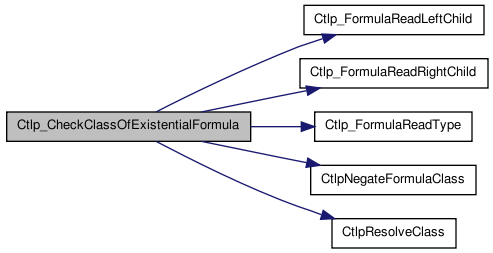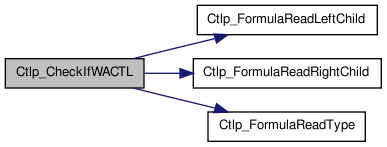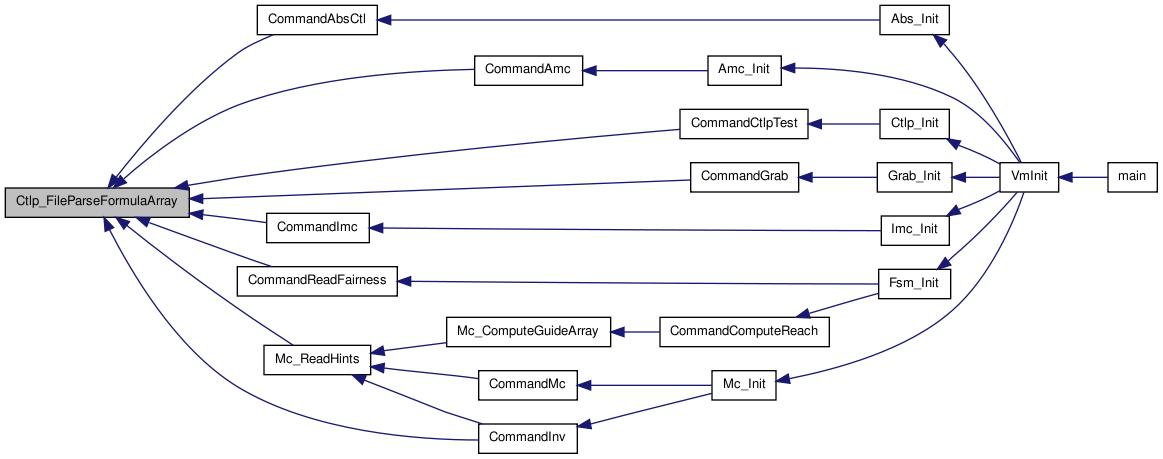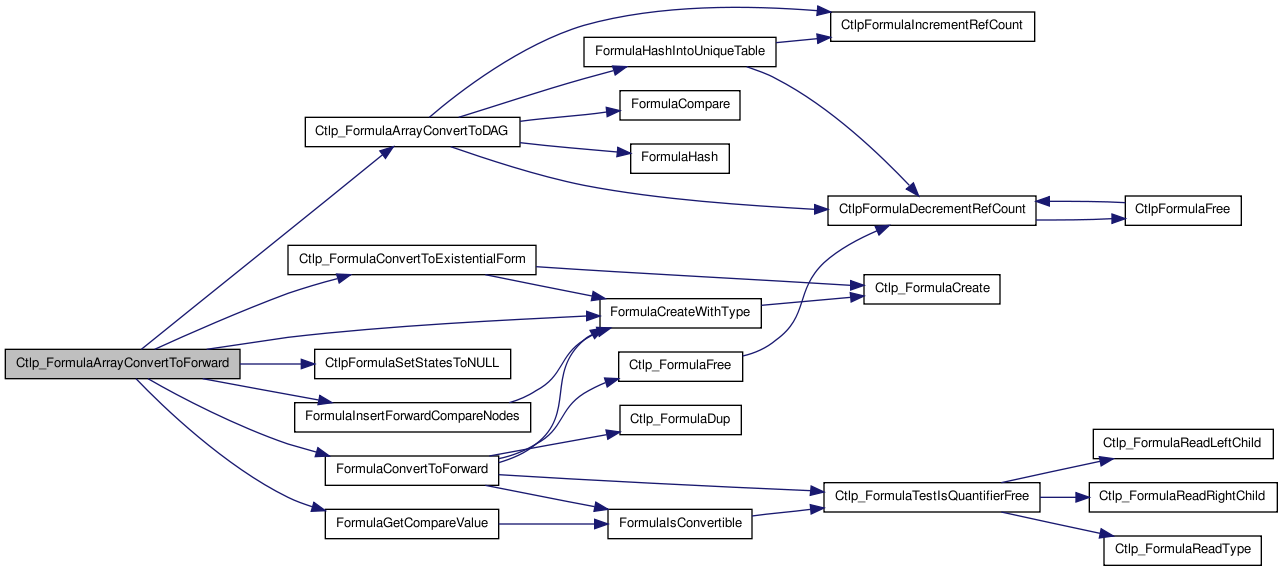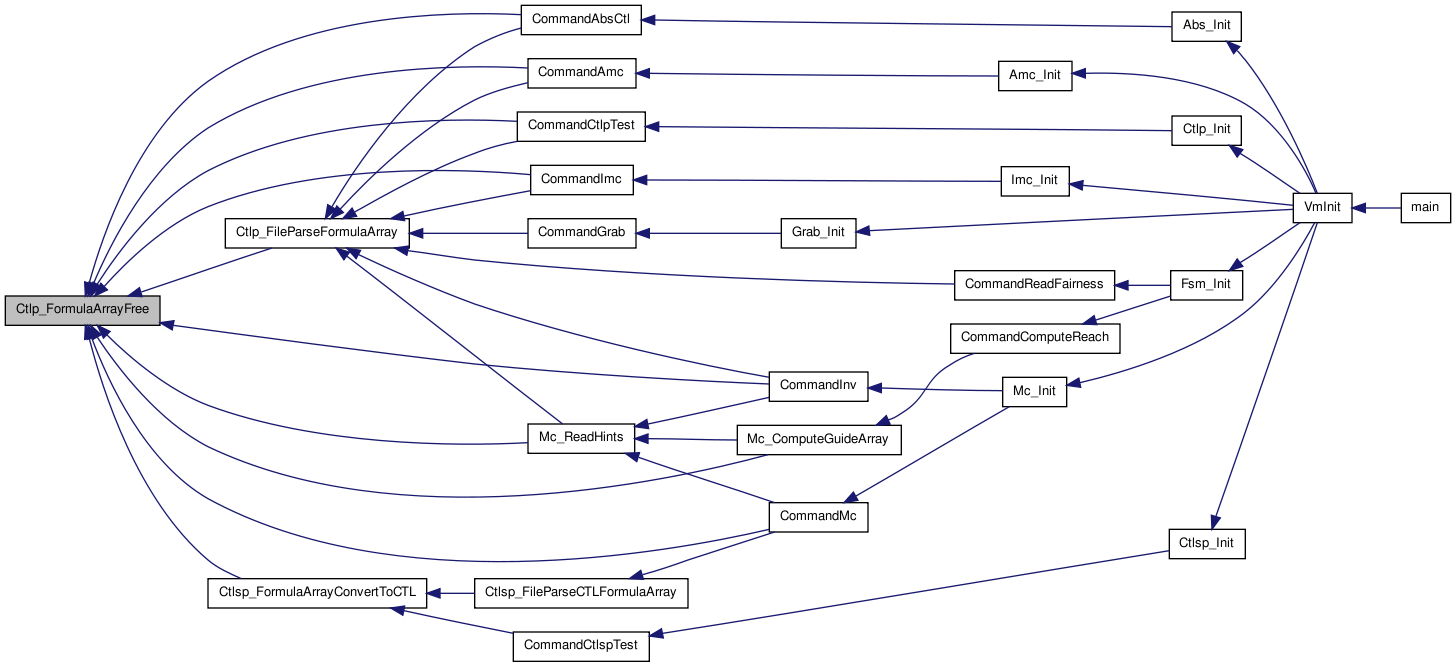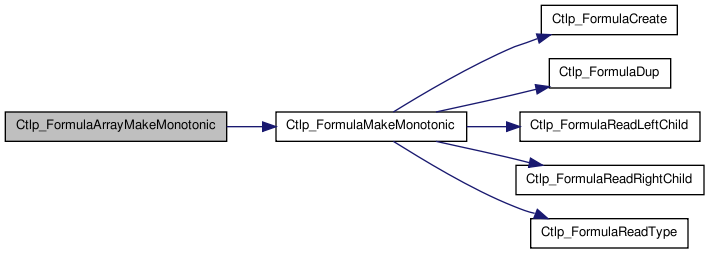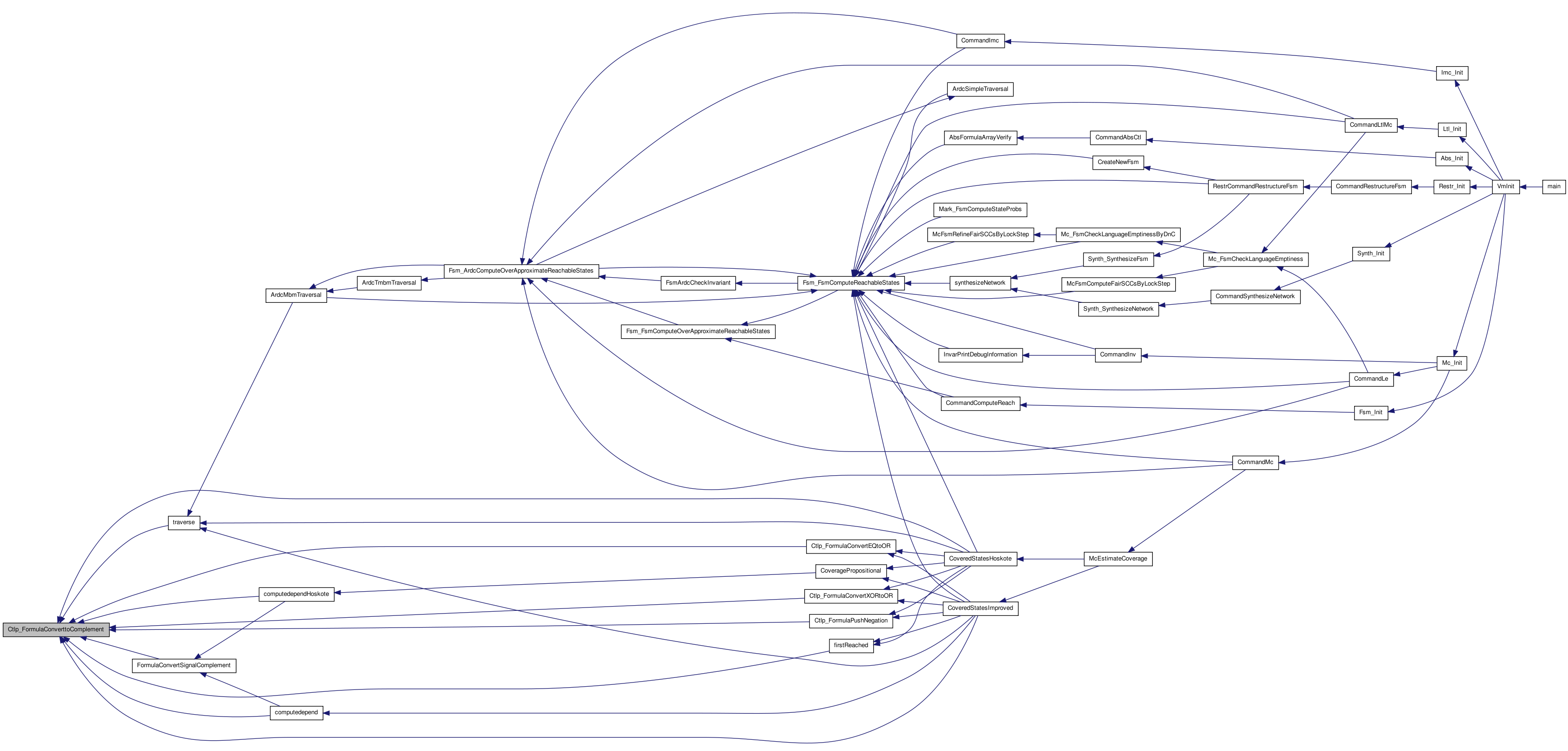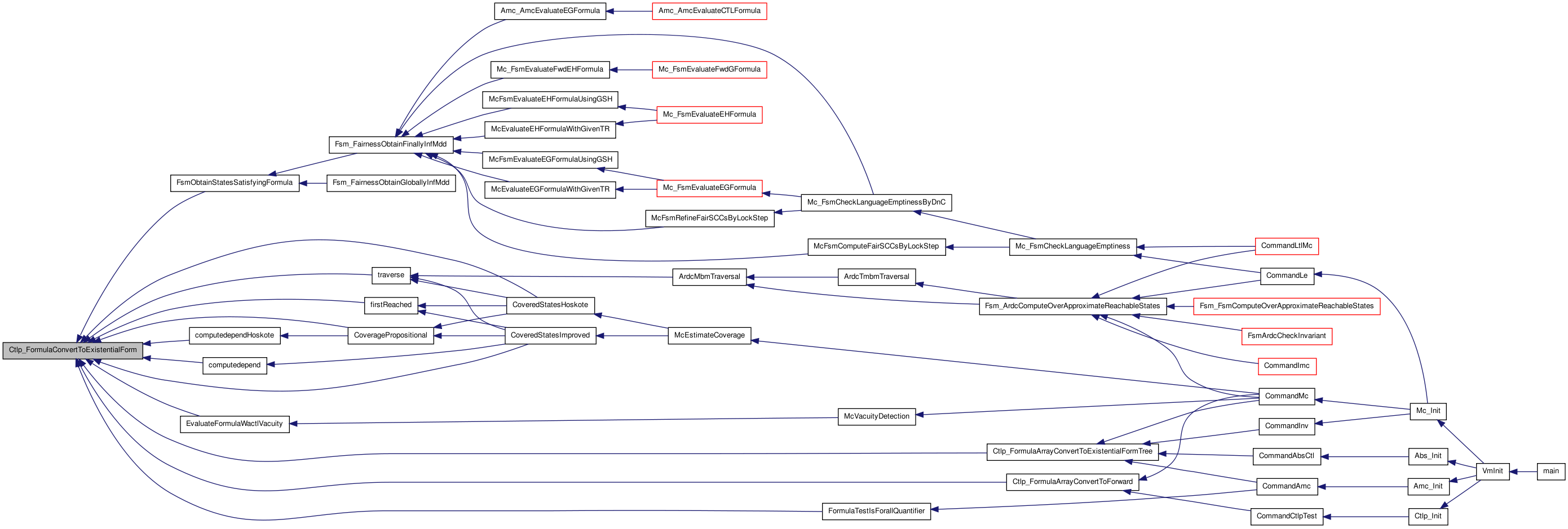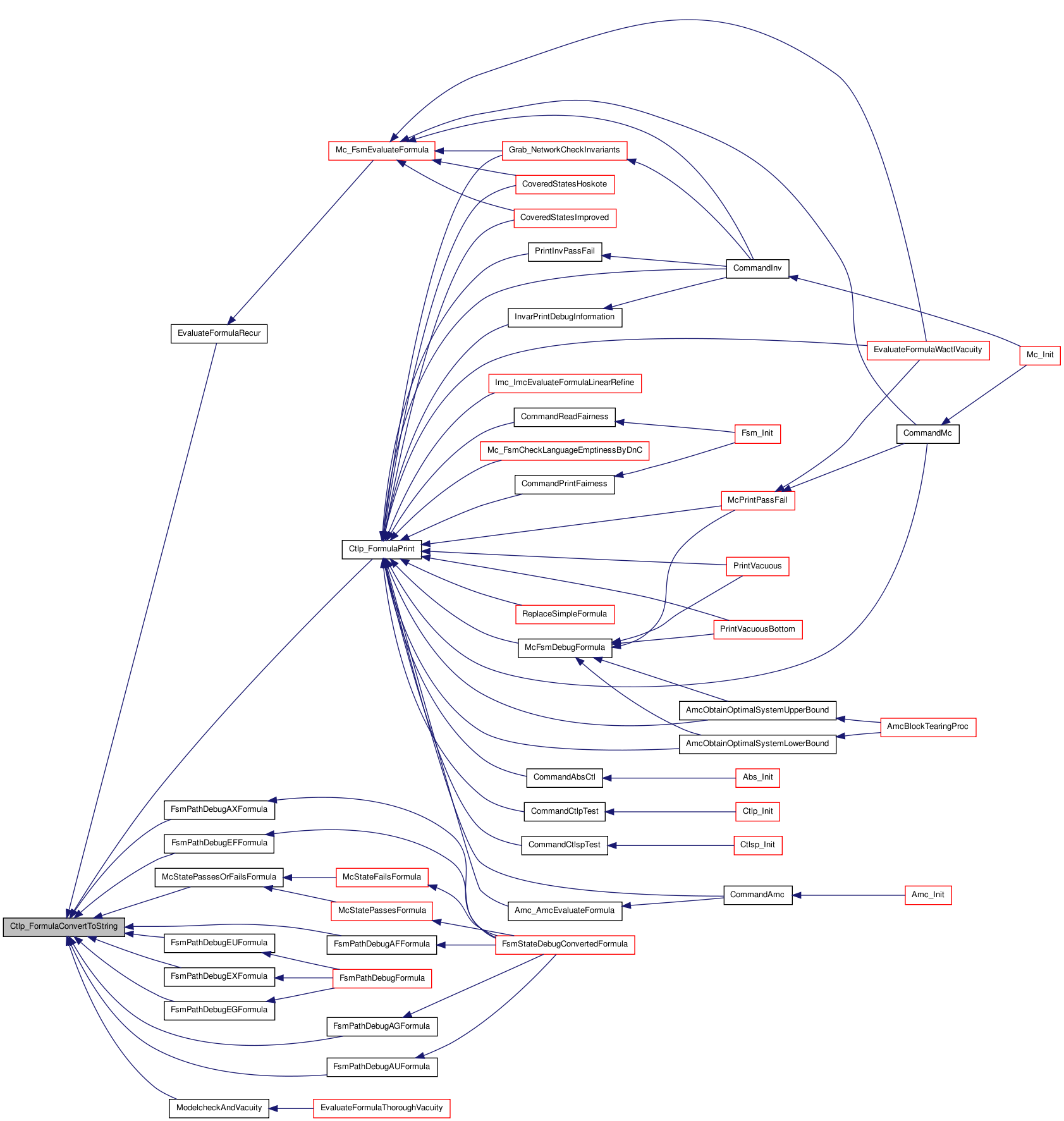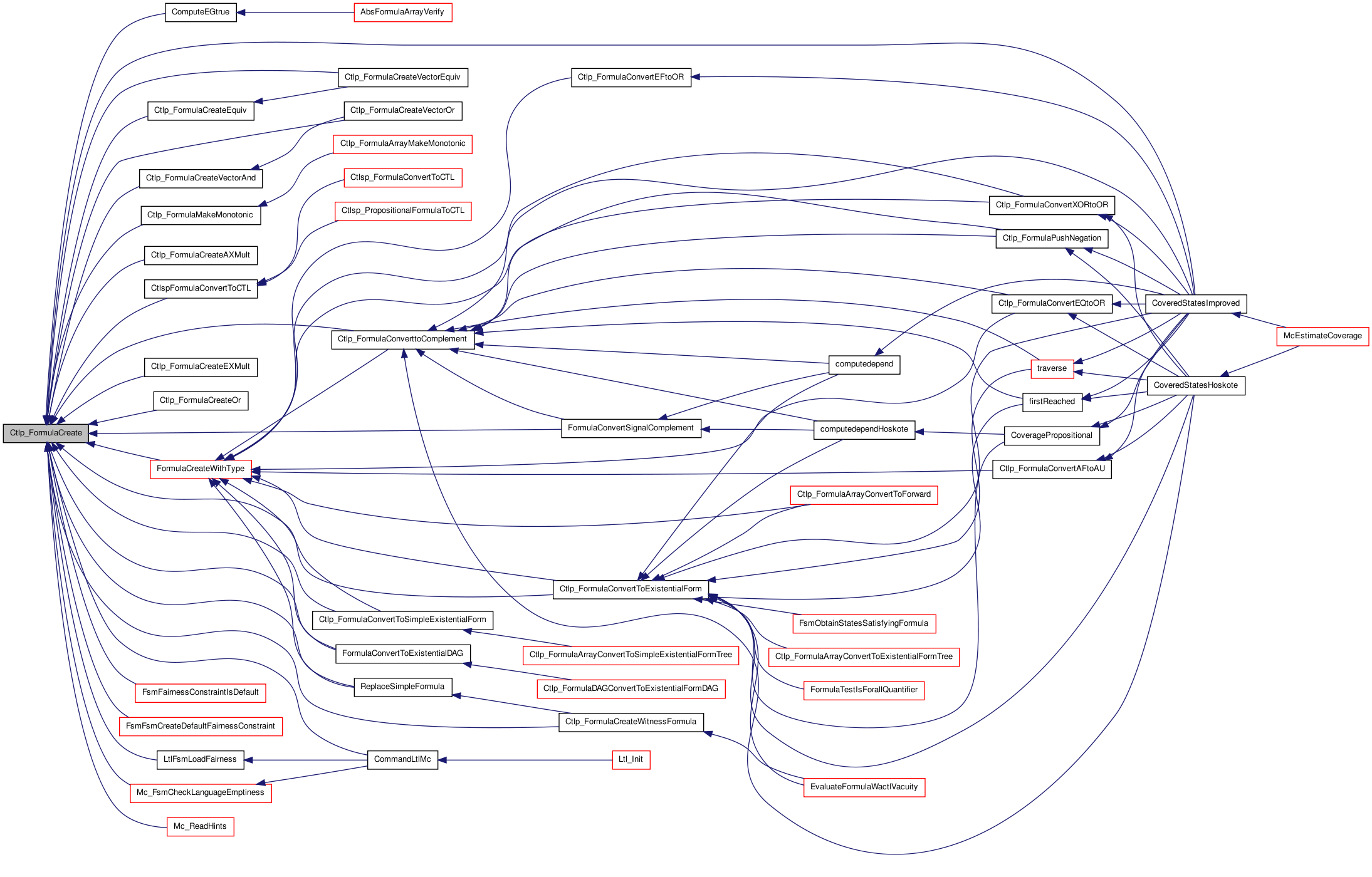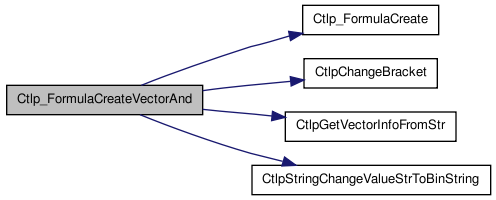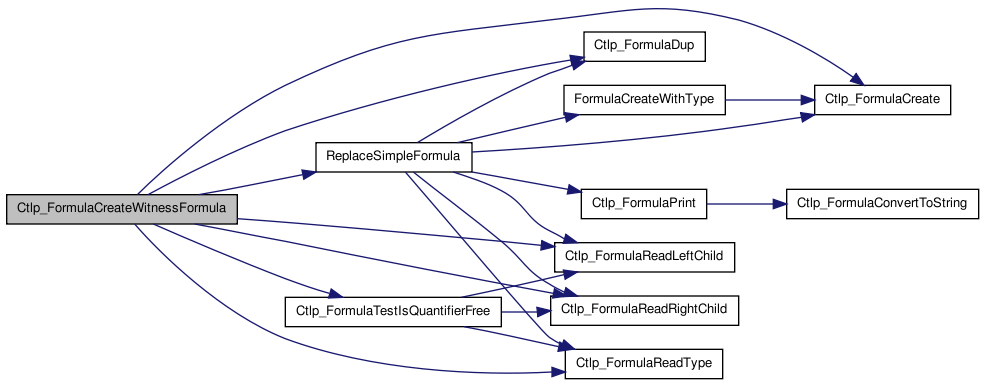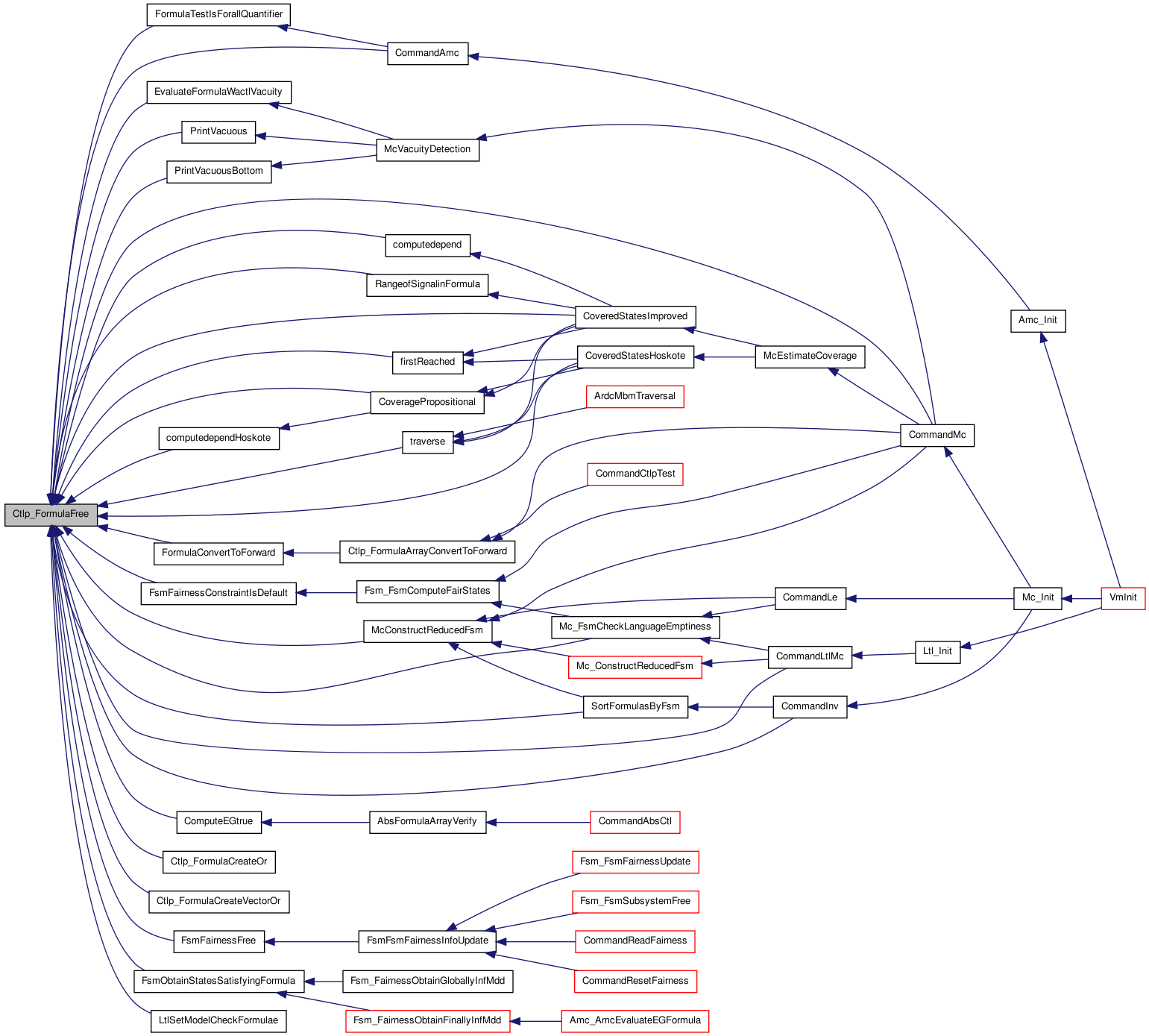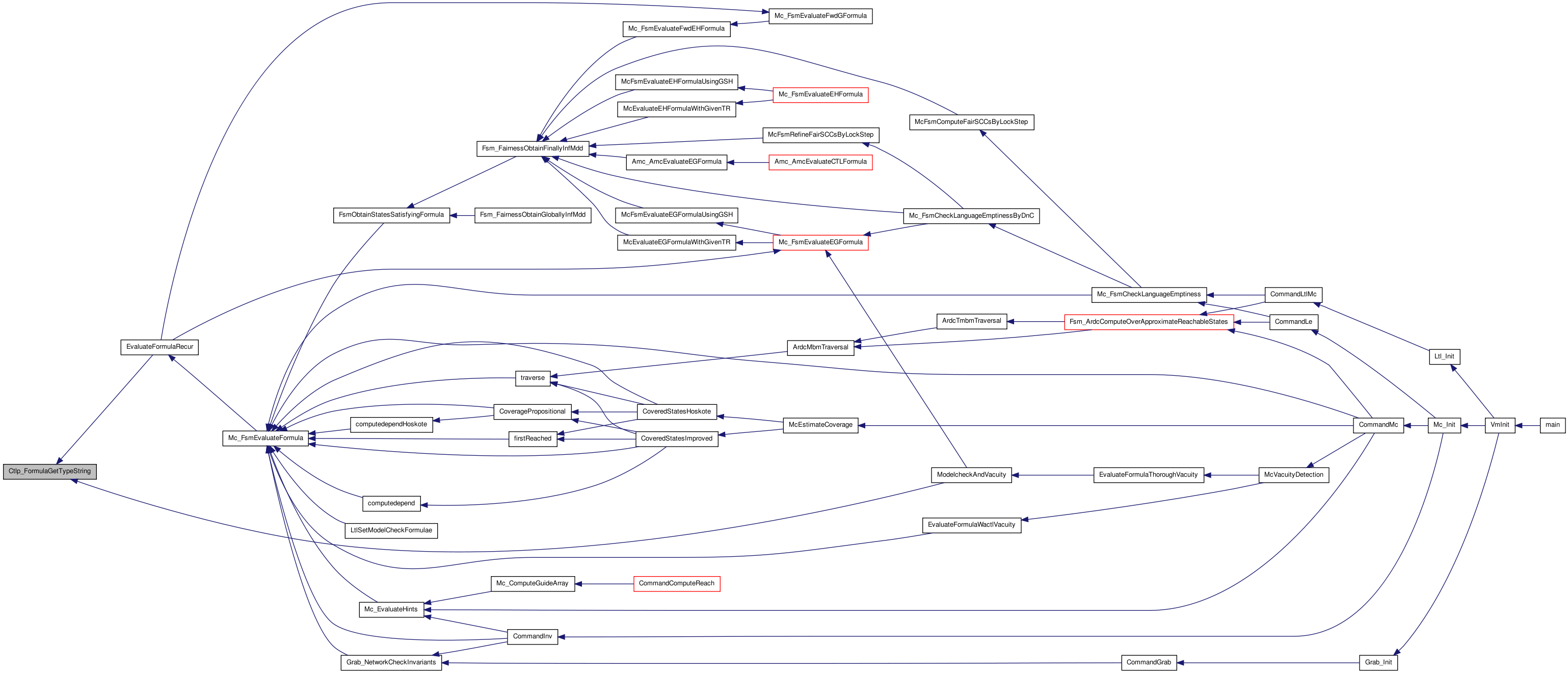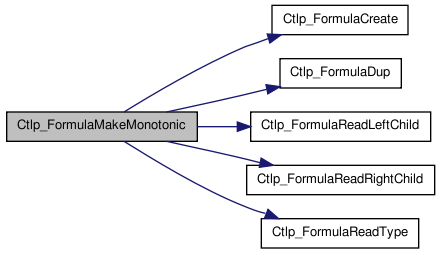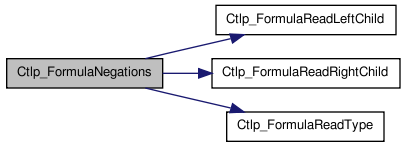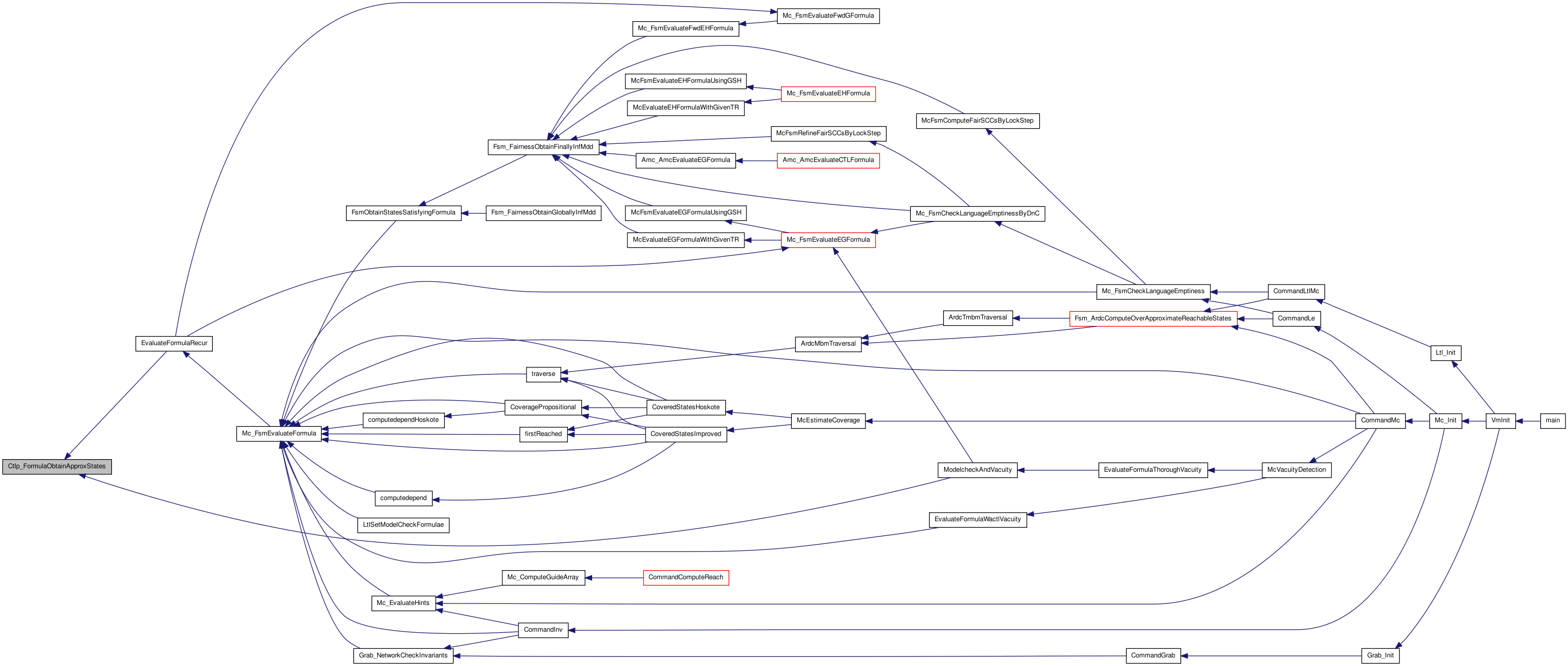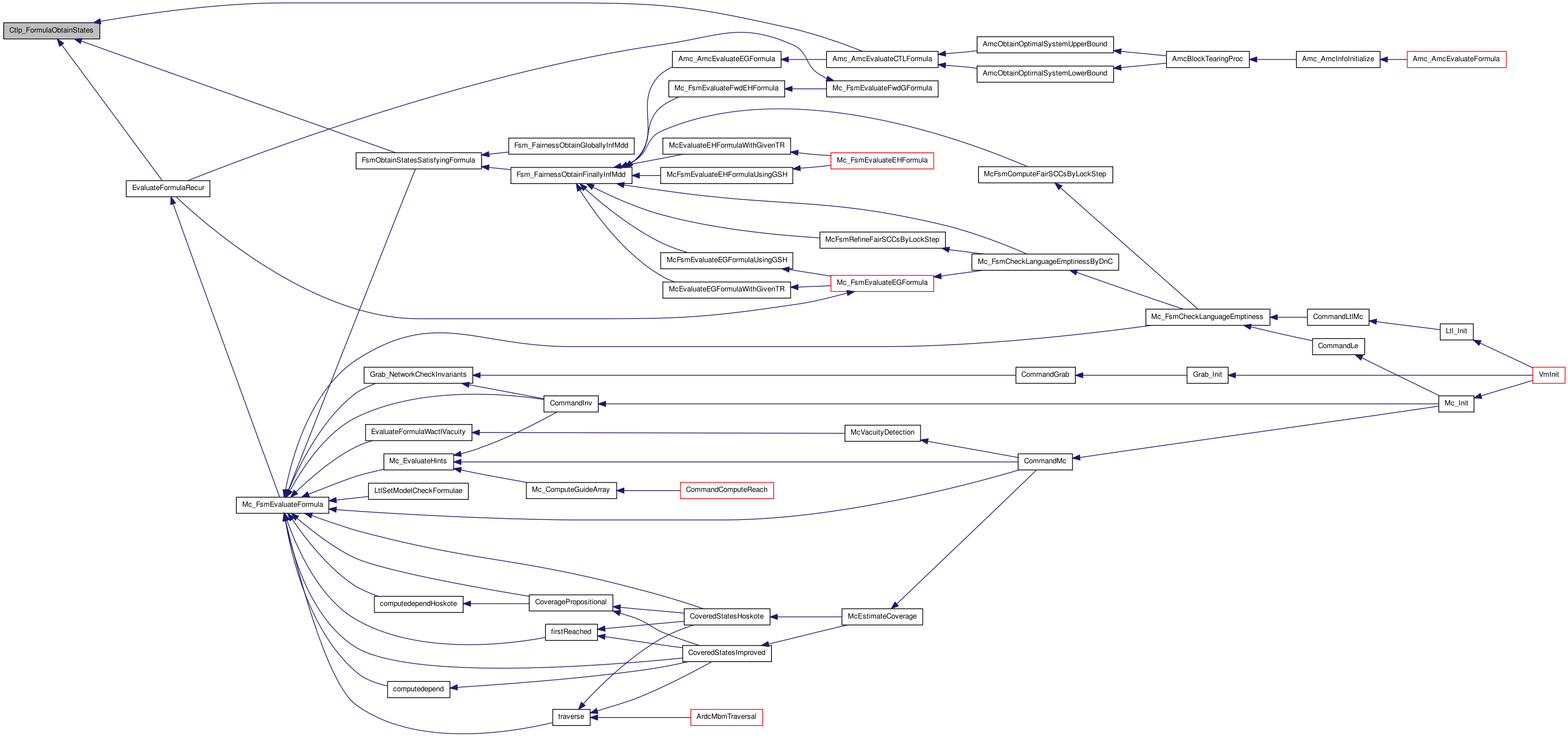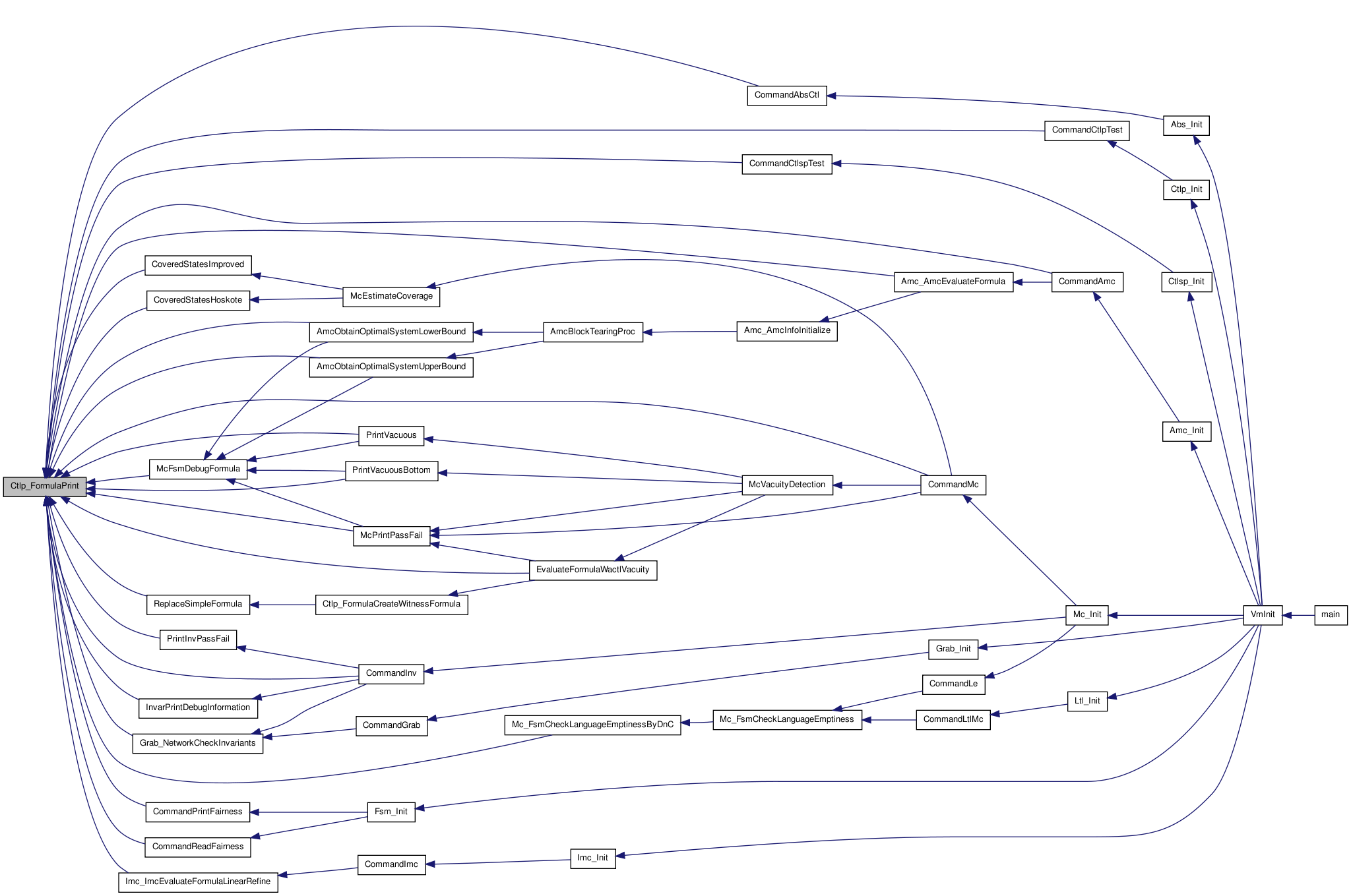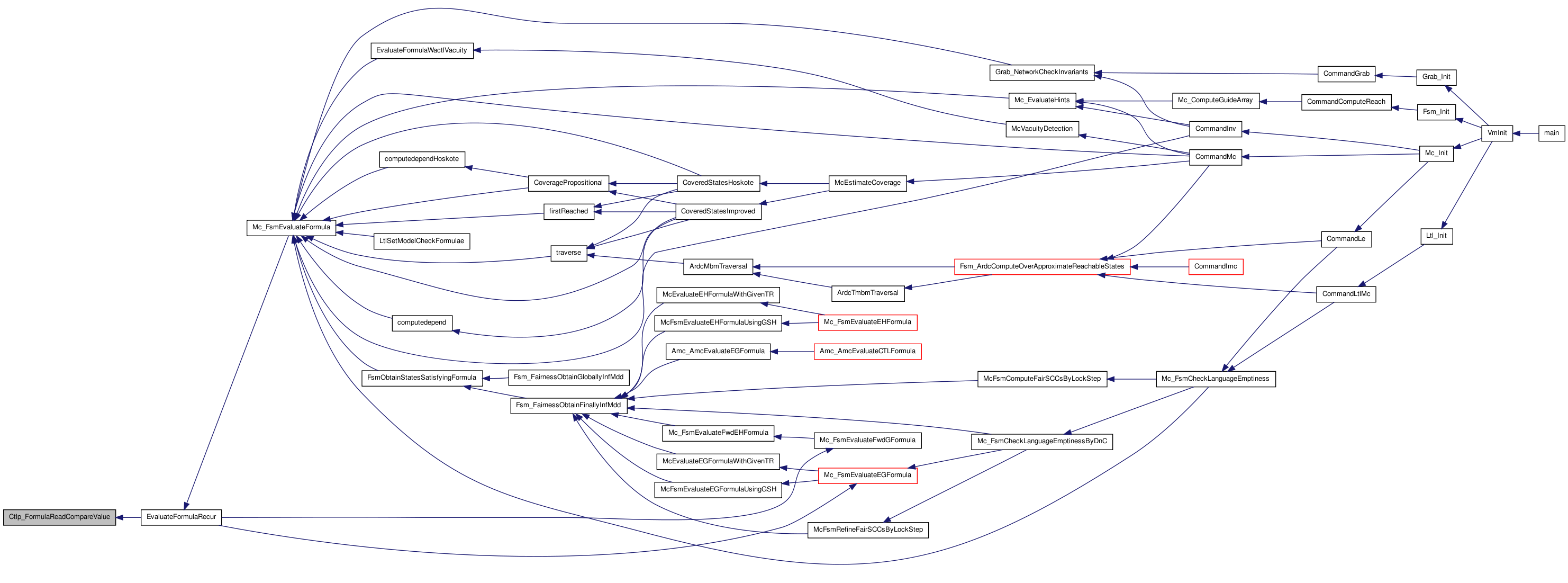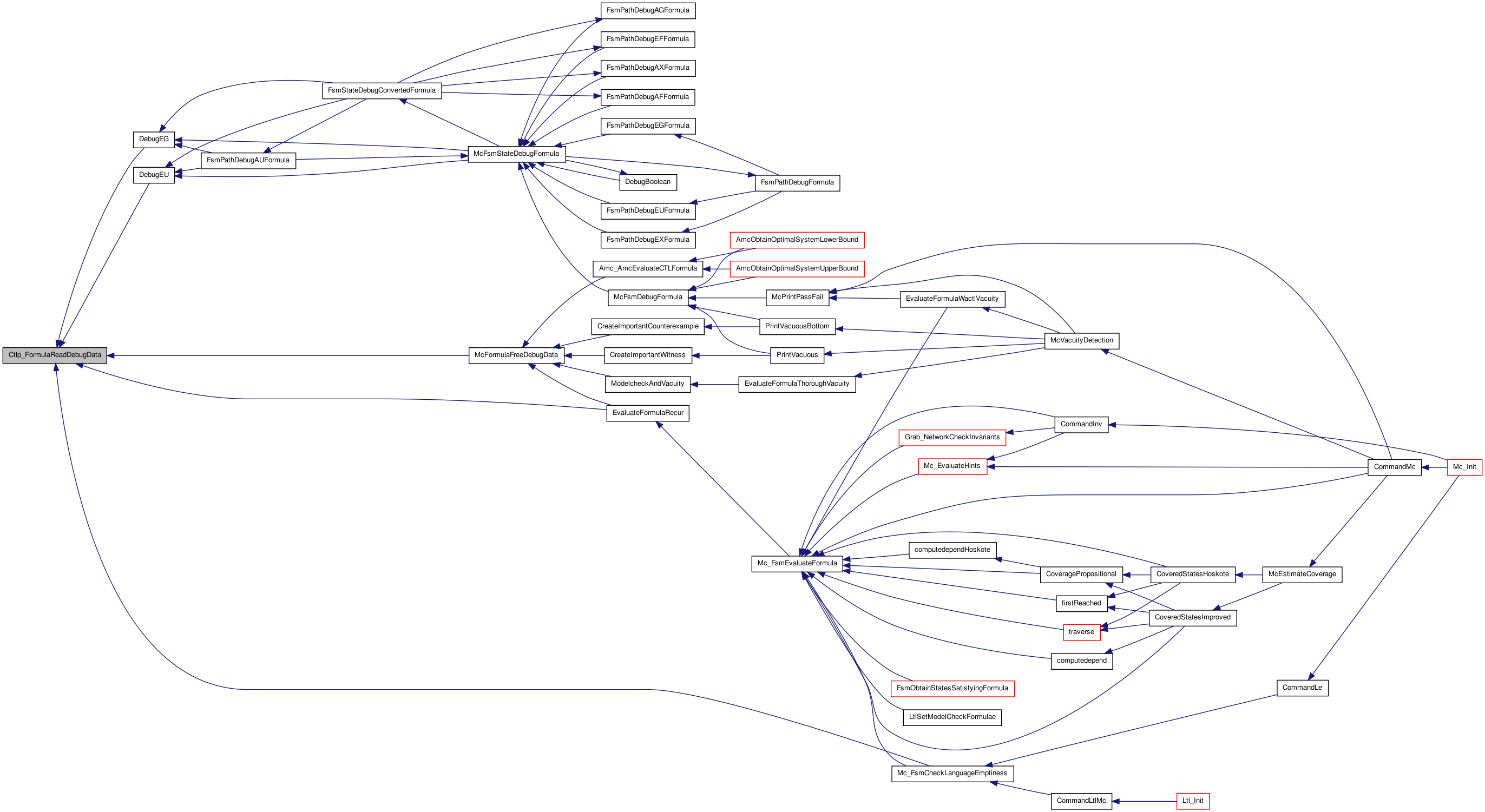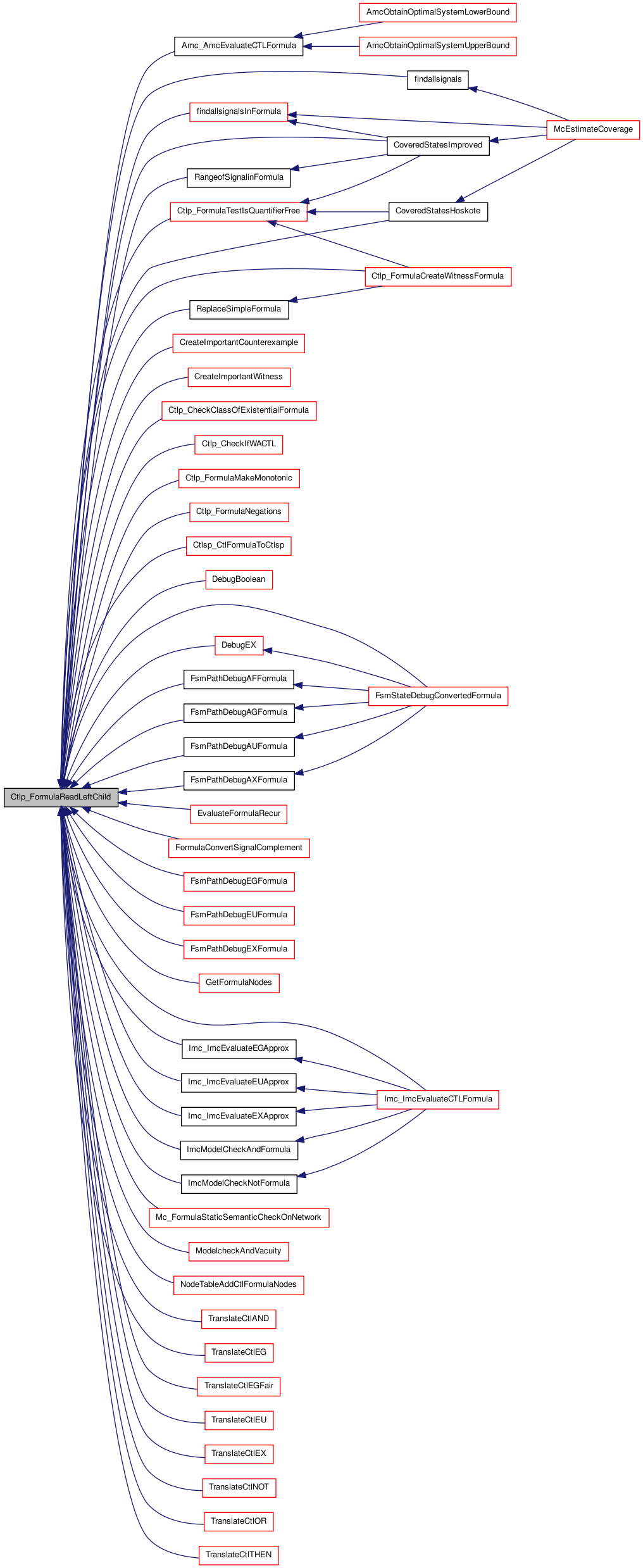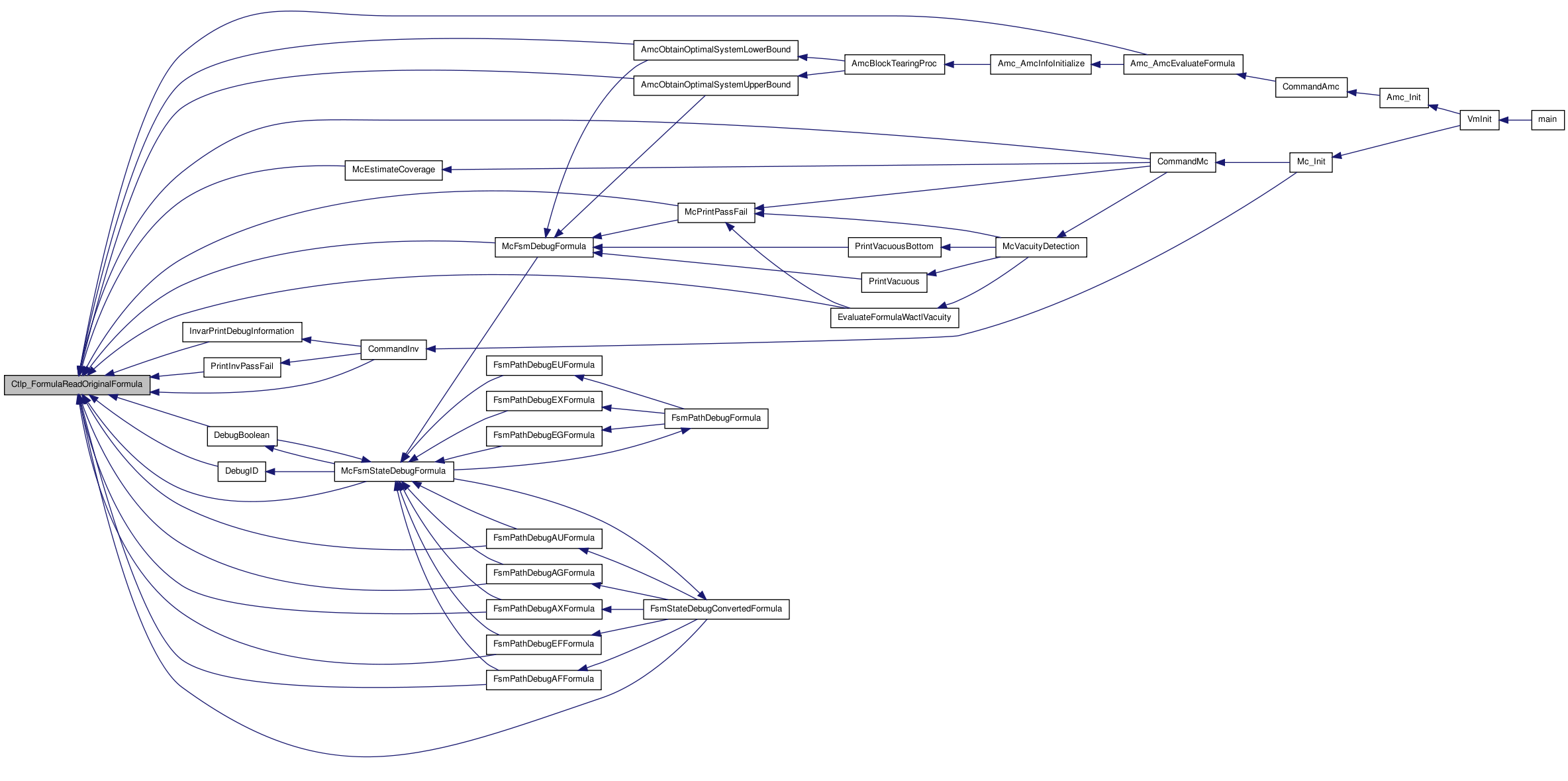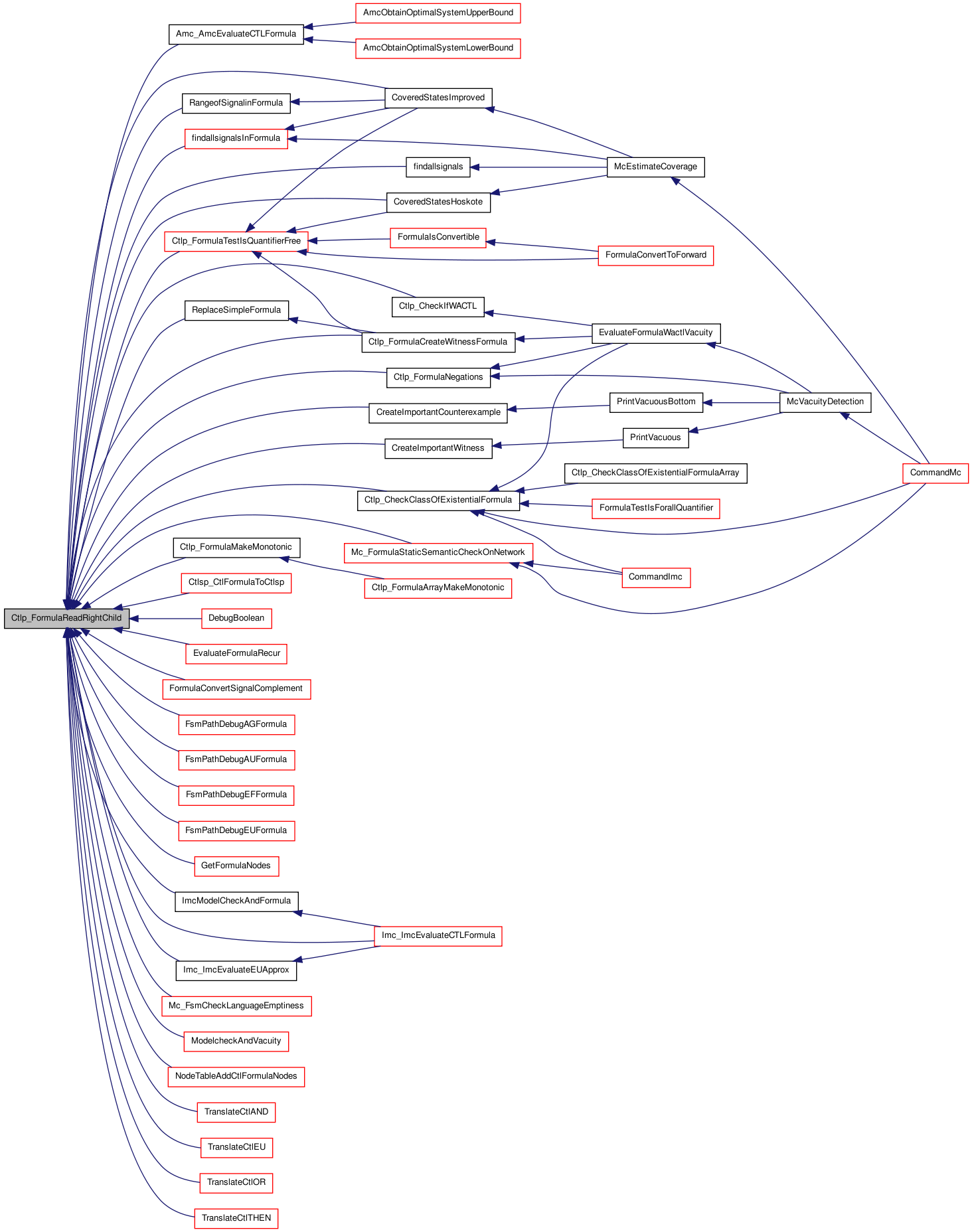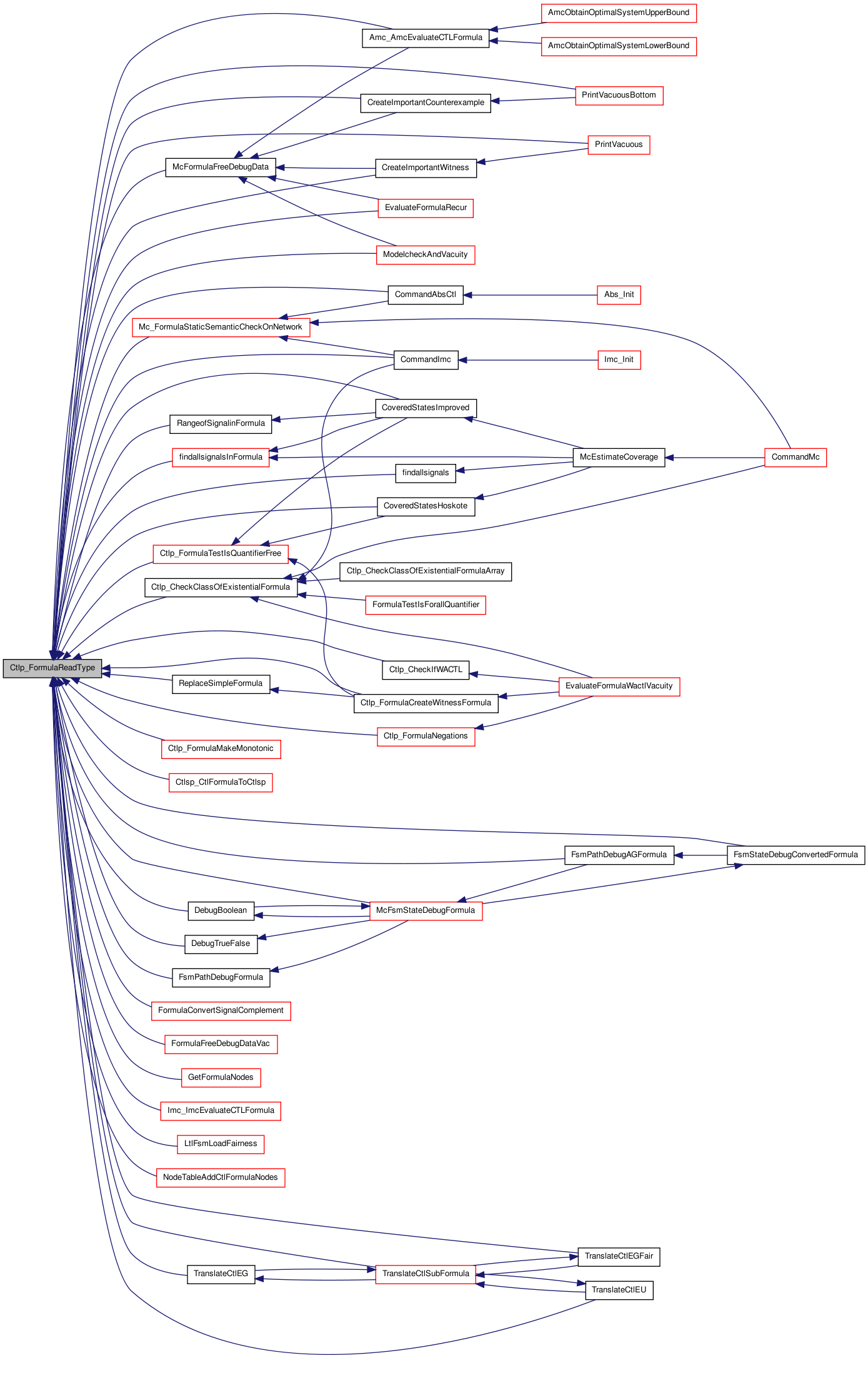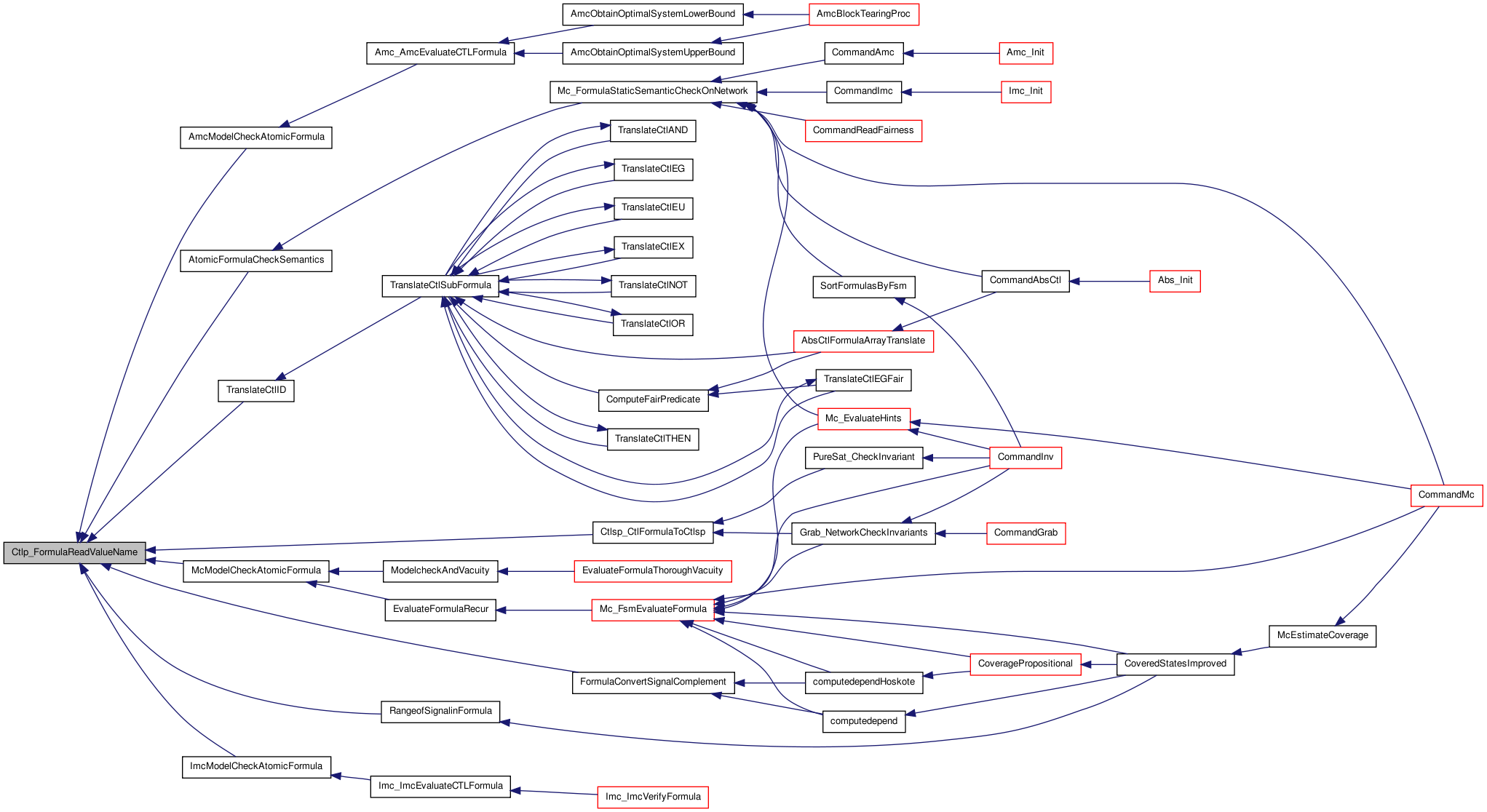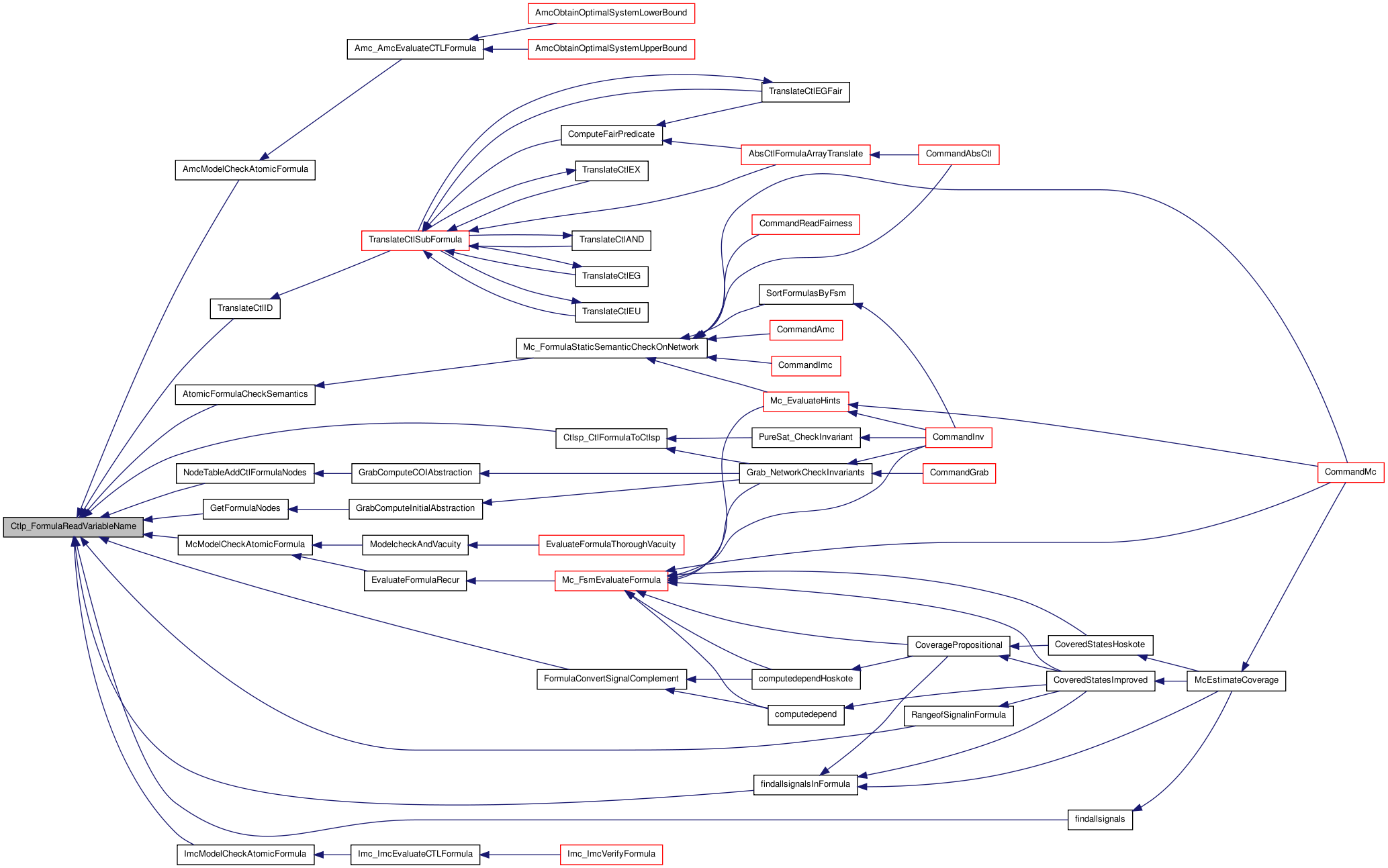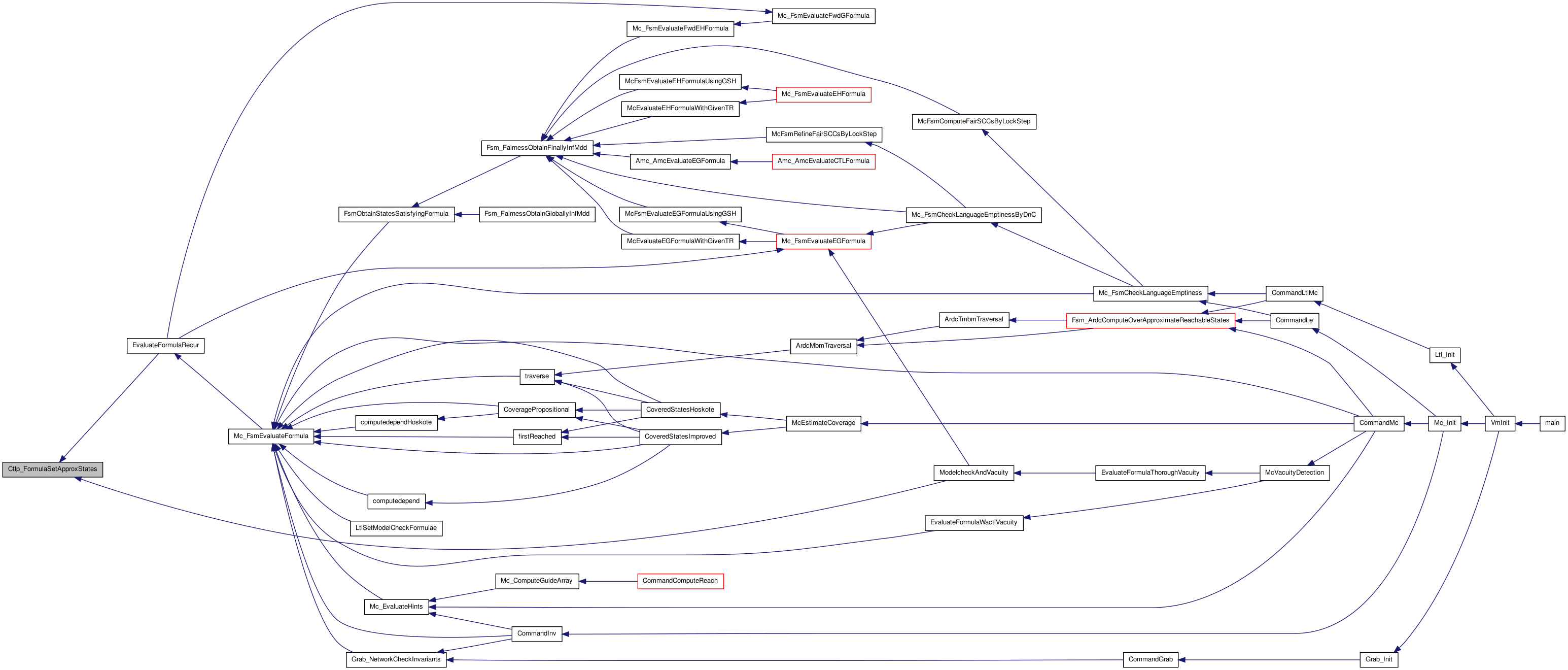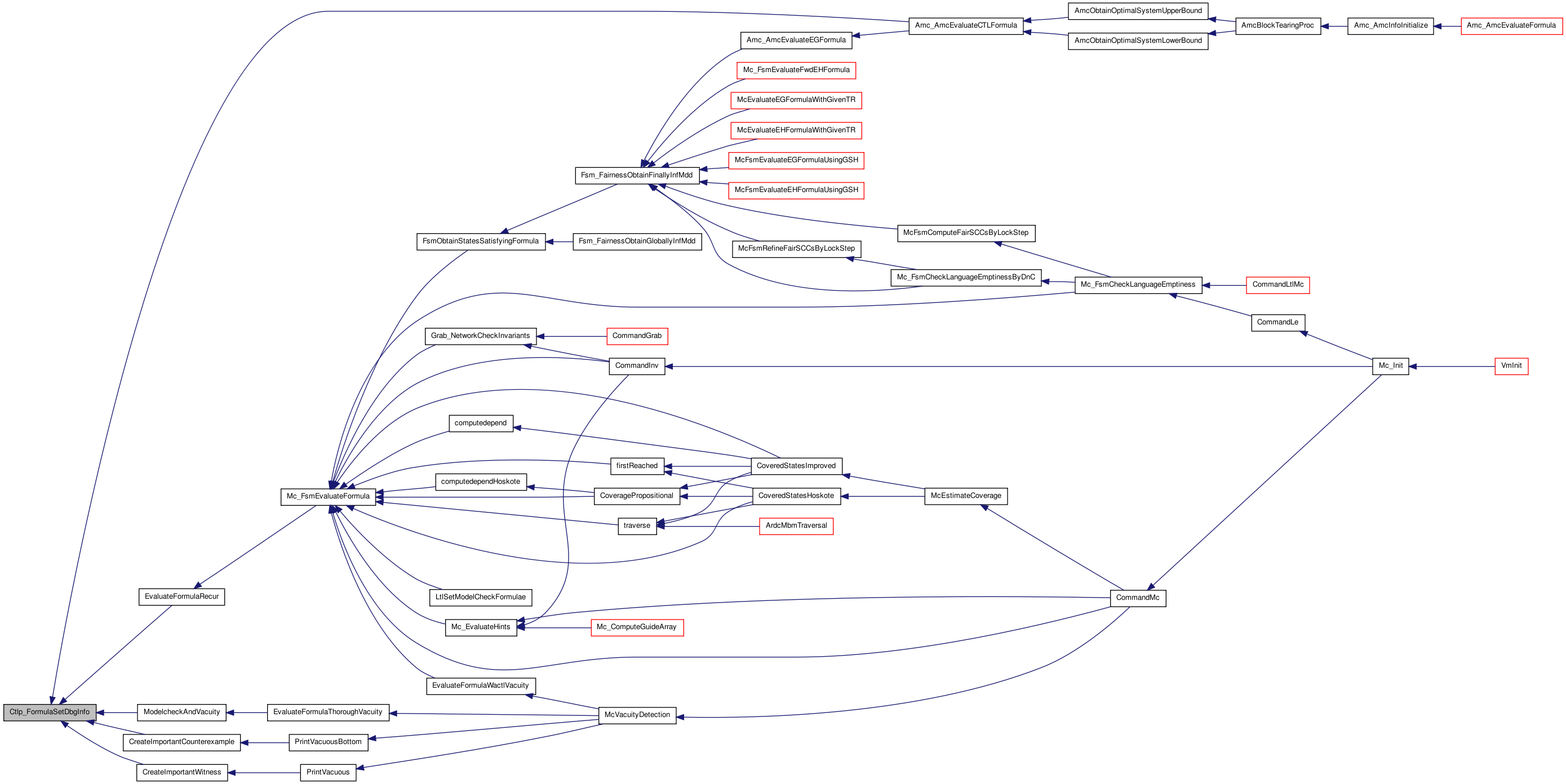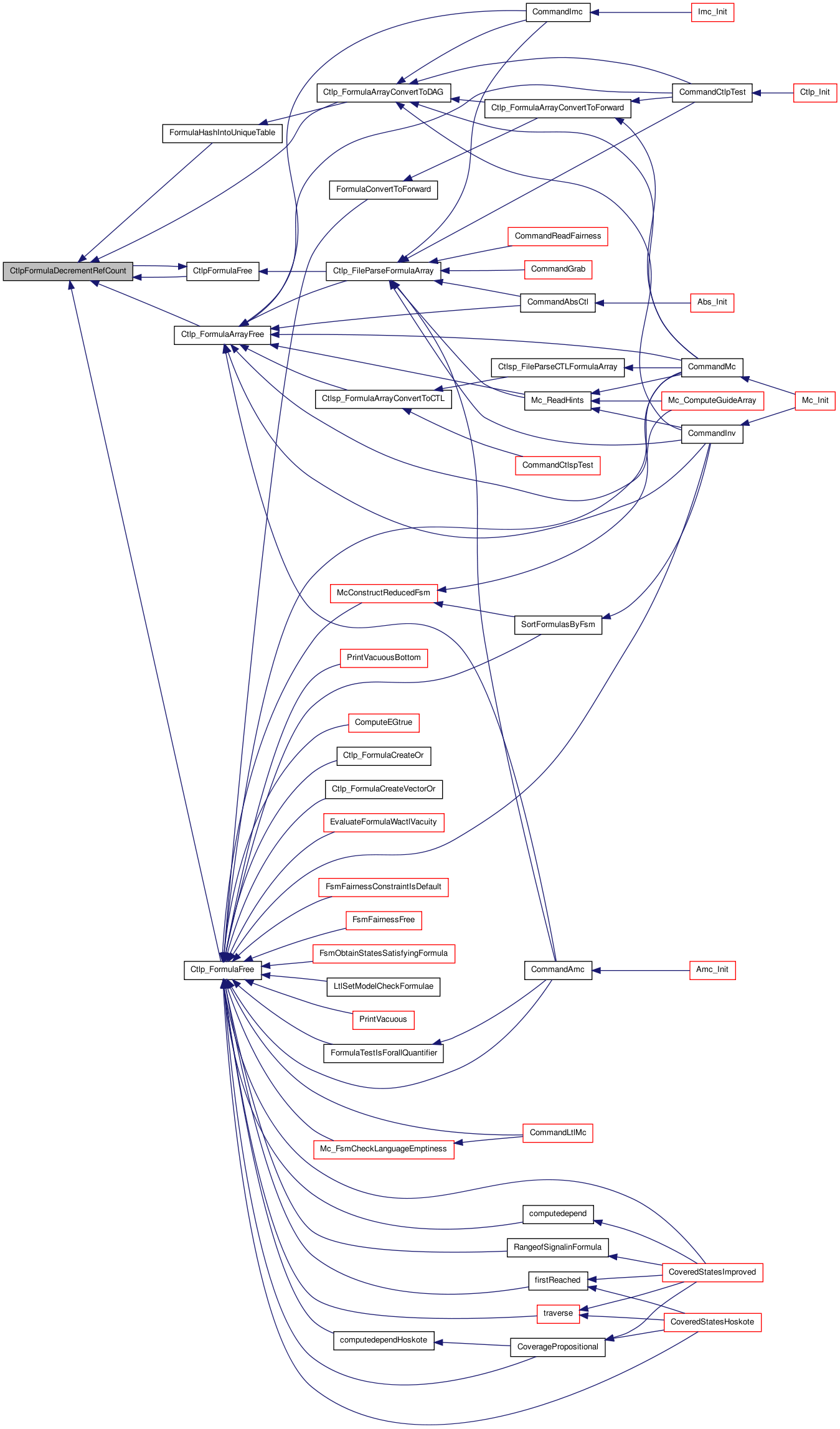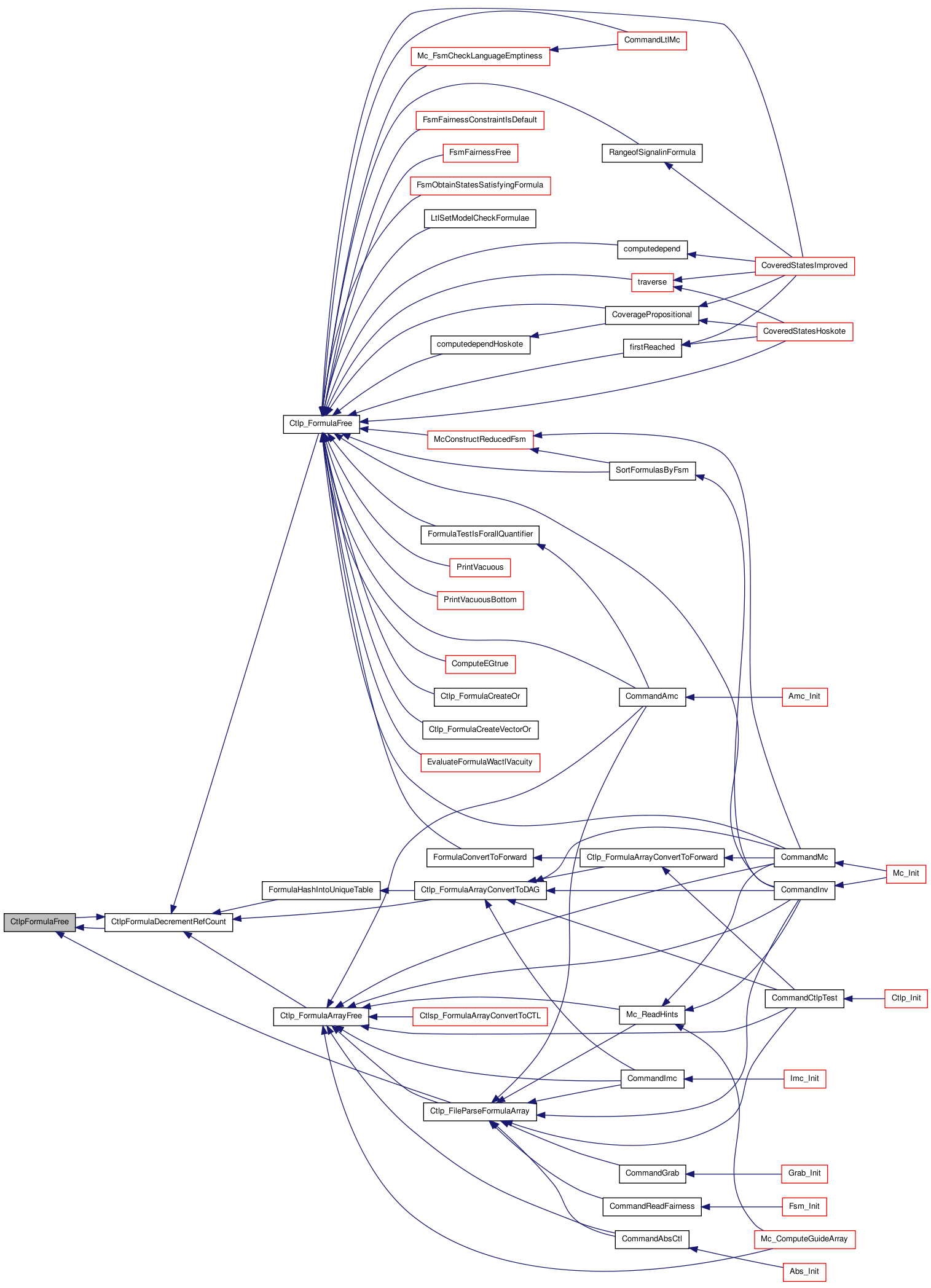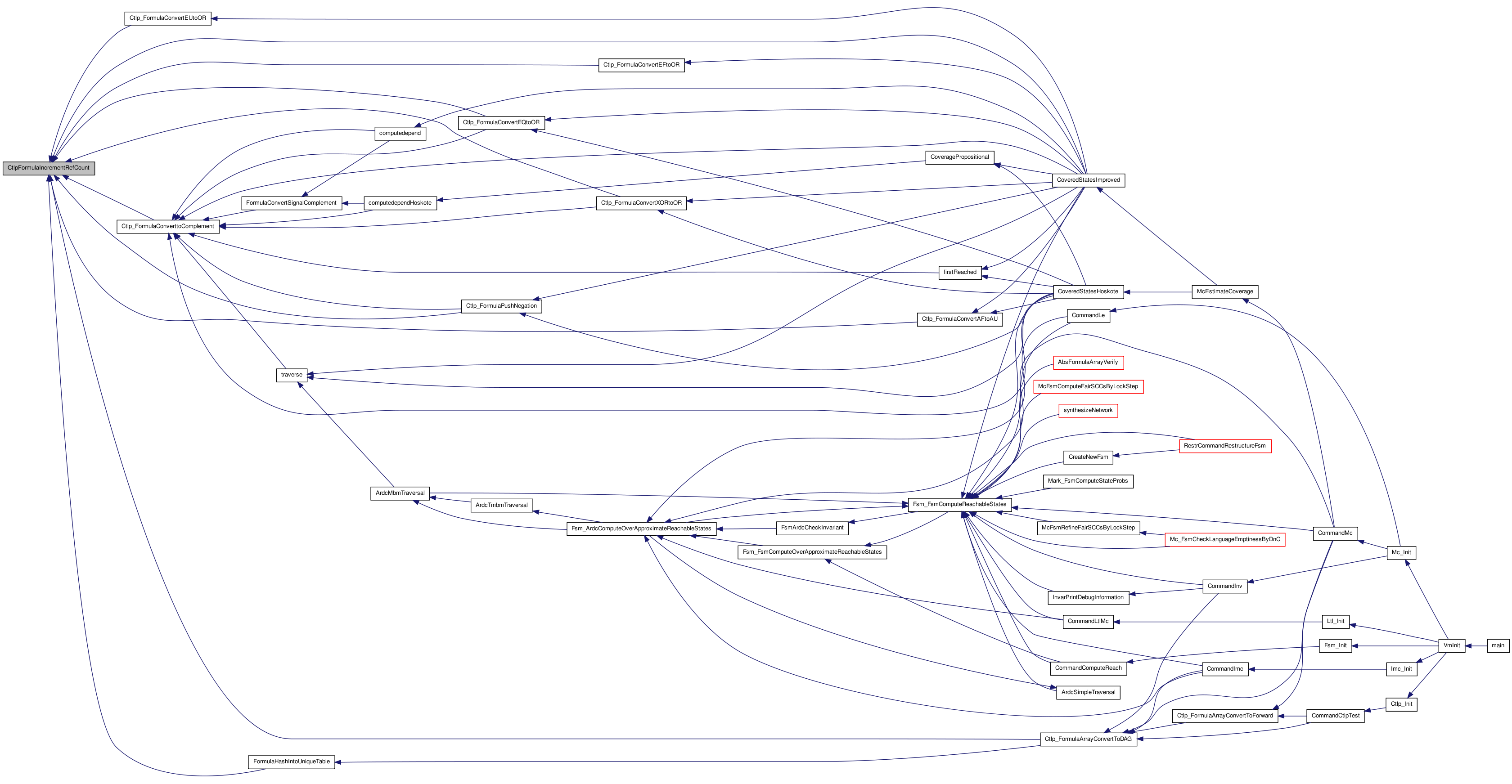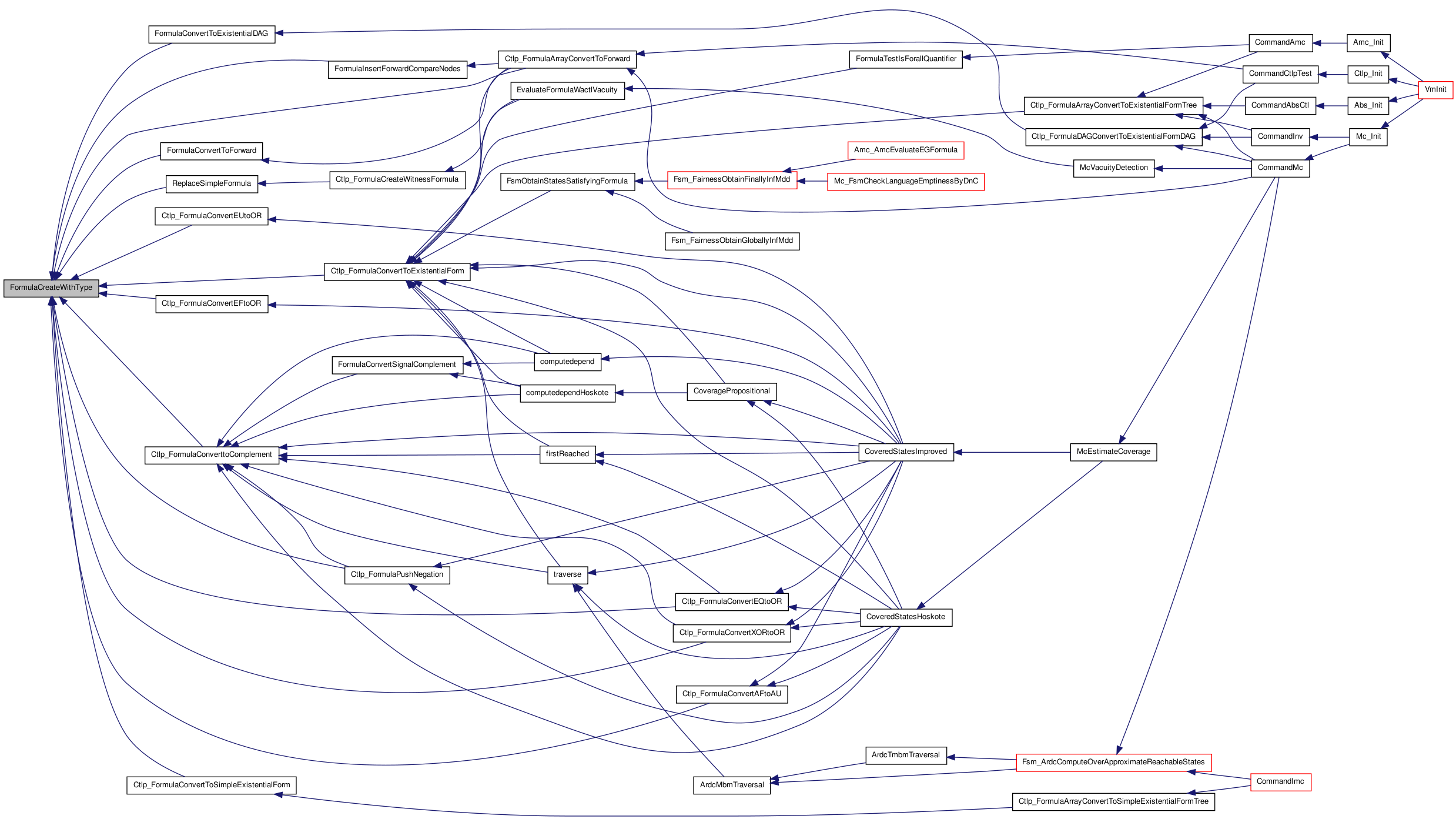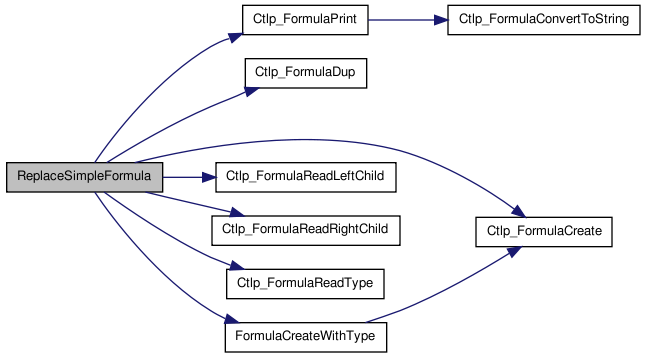#include "ctlpInt.h"#include "errno.h" Include dependency graph for ctlpUtil.c:
Include dependency graph for ctlpUtil.c:Go to the source code of this file.
Functions | |
| static Ctlp_Formula_t * | FormulaCreateWithType (Ctlp_FormulaType type) |
| static int | FormulaCompare (const char *key1, const char *key2) |
| static int | FormulaHash (char *key, int modulus) |
| static Ctlp_Formula_t * | FormulaHashIntoUniqueTable (Ctlp_Formula_t *formula, st_table *uniqueTable) |
| static Ctlp_Formula_t * | FormulaConvertToExistentialDAG (Ctlp_Formula_t *formula) |
| static void | FormulaConvertToForward (Ctlp_Formula_t *formula, int compareValue) |
| static void | FormulaInsertForwardCompareNodes (Ctlp_Formula_t *formula, Ctlp_Formula_t *parent, int compareValue) |
| static int | FormulaGetCompareValue (Ctlp_Formula_t *formula) |
| static int | FormulaIsConvertible (Ctlp_Formula_t *formula) |
| static Ctlp_Formula_t * | ReplaceSimpleFormula (Ctlp_Formula_t *formula) |
| array_t * | Ctlp_FileParseFormulaArray (FILE *fp) |
| char * | Ctlp_FormulaConvertToString (Ctlp_Formula_t *formula) |
| void | Ctlp_FormulaPrint (FILE *fp, Ctlp_Formula_t *formula) |
| Ctlp_FormulaType | Ctlp_FormulaReadType (Ctlp_Formula_t *formula) |
| int | Ctlp_FormulaReadCompareValue (Ctlp_Formula_t *formula) |
| char * | Ctlp_FormulaReadVariableName (Ctlp_Formula_t *formula) |
| char * | Ctlp_FormulaReadValueName (Ctlp_Formula_t *formula) |
| Ctlp_Formula_t * | Ctlp_FormulaReadLeftChild (Ctlp_Formula_t *formula) |
| Ctlp_Formula_t * | Ctlp_FormulaReadRightChild (Ctlp_Formula_t *formula) |
| mdd_t * | Ctlp_FormulaObtainStates (Ctlp_Formula_t *formula) |
| void | Ctlp_FormulaSetStates (Ctlp_Formula_t *formula, mdd_t *states) |
| mdd_t * | Ctlp_FormulaObtainLatestApprox (Ctlp_Formula_t *formula) |
| mdd_t * | Ctlp_FormulaObtainApproxStates (Ctlp_Formula_t *formula, Ctlp_Approx_t approx) |
| void | Ctlp_FormulaSetApproxStates (Ctlp_Formula_t *formula, mdd_t *states, Ctlp_Approx_t approx) |
| void | Ctlp_FormulaSetDbgInfo (Ctlp_Formula_t *formula, void *data, Ctlp_DbgInfoFreeFn freeFn) |
| void * | Ctlp_FormulaReadDebugData (Ctlp_Formula_t *formula) |
| boolean | Ctlp_FormulaTestIsConverted (Ctlp_Formula_t *formula) |
| boolean | Ctlp_FormulaTestIsQuantifierFree (Ctlp_Formula_t *formula) |
| void | Ctlp_FormulaNegations (Ctlp_Formula_t *formula, Ctlp_Parity_t parity) |
| Ctlp_FormulaACTLSubClass | Ctlp_CheckIfWACTL (Ctlp_Formula_t *formula) |
| Ctlp_Formula_t * | Ctlp_FormulaReadOriginalFormula (Ctlp_Formula_t *formula) |
| void | Ctlp_FormulaFree (Ctlp_Formula_t *formula) |
| void | Ctlp_FlushStates (Ctlp_Formula_t *formula) |
| Ctlp_Formula_t * | Ctlp_FormulaDup (Ctlp_Formula_t *formula) |
| Ctlp_Formula_t * | Ctlp_FormulaConverttoComplement (Ctlp_Formula_t *formula) |
| Ctlp_Formula_t * | Ctlp_FormulaConvertAFtoAU (Ctlp_Formula_t *formula) |
| Ctlp_Formula_t * | Ctlp_FormulaConvertEFtoOR (Ctlp_Formula_t *formula) |
| Ctlp_Formula_t * | Ctlp_FormulaConvertEUtoOR (Ctlp_Formula_t *formula) |
| Ctlp_Formula_t * | Ctlp_FormulaConvertXORtoOR (Ctlp_Formula_t *formula) |
| Ctlp_Formula_t * | Ctlp_FormulaConvertEQtoOR (Ctlp_Formula_t *formula) |
| Ctlp_Formula_t * | Ctlp_FormulaPushNegation (Ctlp_Formula_t *formula) |
| void | Ctlp_FormulaArrayFree (array_t *formulaArray) |
| Ctlp_Formula_t * | Ctlp_FormulaConvertToExistentialForm (Ctlp_Formula_t *formula) |
| Ctlp_Formula_t * | Ctlp_FormulaConvertToSimpleExistentialForm (Ctlp_Formula_t *formula) |
| array_t * | Ctlp_FormulaArrayConvertToExistentialFormTree (array_t *formulaArray) |
| array_t * | Ctlp_FormulaArrayConvertToSimpleExistentialFormTree (array_t *formulaArray) |
| array_t * | Ctlp_FormulaArrayConvertToDAG (array_t *formulaArray) |
| array_t * | Ctlp_FormulaDAGConvertToExistentialFormDAG (array_t *formulaDAG) |
| Ctlp_Formula_t * | Ctlp_FormulaCreate (Ctlp_FormulaType type, void *left, void *right) |
| Ctlp_Formula_t * | Ctlp_FormulaCreateOr (char *name, char *valueStr) |
| Ctlp_Formula_t * | Ctlp_FormulaCreateVectorAnd (char *nameVector, char *value) |
| Ctlp_Formula_t * | Ctlp_FormulaCreateVectorOr (char *nameVector, char *valueStr) |
| Ctlp_Formula_t * | Ctlp_FormulaCreateEquiv (char *left, char *right) |
| Ctlp_Formula_t * | Ctlp_FormulaCreateVectorEquiv (char *left, char *right) |
| Ctlp_Formula_t * | Ctlp_FormulaCreateAXMult (char *string, Ctlp_Formula_t *formula) |
| Ctlp_Formula_t * | Ctlp_FormulaCreateEXMult (char *string, Ctlp_Formula_t *formula) |
| array_t * | Ctlp_FormulaArrayConvertToForward (array_t *formulaArray, int singleInitial, boolean doNotShareFlag) |
| char * | Ctlp_FormulaGetTypeString (Ctlp_Formula_t *formula) |
| Ctlp_FormulaClass | Ctlp_CheckClassOfExistentialFormula (Ctlp_Formula_t *formula) |
| Ctlp_FormulaClass | Ctlp_CheckClassOfExistentialFormulaArray (array_t *formulaArray) |
| boolean | Ctlp_FormulaIdentical (Ctlp_Formula_t *formula1, Ctlp_Formula_t *formula2) |
| void | Ctlp_FormulaMakeMonotonic (Ctlp_Formula_t *formula) |
| void | Ctlp_FormulaArrayMakeMonotonic (array_t *formulaArray) |
| void | CtlpFormulaIncrementRefCount (Ctlp_Formula_t *formula) |
| void | CtlpFormulaDecrementRefCount (Ctlp_Formula_t *formula) |
| void | CtlpFormulaAddToGlobalArray (Ctlp_Formula_t *formula) |
| void | CtlpFormulaFree (Ctlp_Formula_t *formula) |
| int | CtlpStringChangeValueStrToBinString (char *value, char *binValueStr, int interval) |
| void | CtlpChangeBracket (char *inStr) |
| char * | CtlpGetVectorInfoFromStr (char *str, int *start, int *end, int *interval, int *inc) |
| int | CtlpFormulaAddToTable (char *name, Ctlp_Formula_t *formula, st_table *macroTable) |
| Ctlp_Formula_t * | CtlpFormulaFindInTable (char *name, st_table *macroTable) |
| Ctlp_FormulaClass | CtlpResolveClass (Ctlp_FormulaClass class1, Ctlp_FormulaClass class2) |
| Ctlp_FormulaClass | CtlpNegateFormulaClass (Ctlp_FormulaClass class_) |
| Ctlp_Formula_t * | Ctlp_FormulaCreateWitnessFormula (Ctlp_Formula_t *formula) |
Variables | |
| static char rcsid[] | UNUSED = "$Id: ctlpUtil.c,v 1.71 2009/04/11 18:25:53 fabio Exp $" |
| static array_t * | globalFormulaArray |
| static int | changeBracket = 1 |
| int | CtlpGlobalError |
| Ctlp_Formula_t * | CtlpGlobalFormula |
| st_table * | CtlpMacroTable |
Function Documentation
| Ctlp_FormulaClass Ctlp_CheckClassOfExistentialFormula | ( | Ctlp_Formula_t * | formula | ) |
Function********************************************************************
Synopsis [Tests if a formula is quantifier-free, ACTL, ECTL or mixed.]
Description [Tests if a formula is Quantifier free, ACTL, ECTL or mixed. We assume that the formula is in existential normal form, and hence only contains existential temporal operators.
The formula is ECTL if every temporal operator appears under an even number of negations, and it is ACTL if every temporal operator appears under an odd number of negations. It is quantifier-free if it is both ECTL and ACTL (i.e., no temporal operators occur), and it is mixed if it is neither ECTL nor ACTL.]
SideEffects []
SeeAlso []
Definition at line 2578 of file ctlpUtil.c.
{
Ctlp_FormulaType formulaType;
Ctlp_Formula_t *rightFormula, *leftFormula;
Ctlp_FormulaClass resultLeft, resultRight, tempResult, currentClass;
assert(formula != NIL(Ctlp_Formula_t));
if(formula == NIL(Ctlp_Formula_t))
return Ctlp_QuantifierFree_c;
formulaType = Ctlp_FormulaReadType(formula);
leftFormula = Ctlp_FormulaReadLeftChild(formula);
rightFormula = Ctlp_FormulaReadRightChild(formula);
/* Depending on the formula type, create result or recur */
switch (formulaType) {
case Ctlp_EX_c:
case Ctlp_EG_c:
case Ctlp_EF_c:
case Ctlp_EU_c:
case Ctlp_FwdU_c:
case Ctlp_FwdG_c:
case Ctlp_EY_c:
case Ctlp_EH_c:
resultLeft = Ctlp_CheckClassOfExistentialFormula(leftFormula);
if (formulaType == Ctlp_EU_c || formulaType == Ctlp_FwdU_c ||
formulaType == Ctlp_FwdG_c )
resultRight = Ctlp_CheckClassOfExistentialFormula(rightFormula);
else
resultRight = Ctlp_QuantifierFree_c;
tempResult = CtlpResolveClass(resultLeft, resultRight);
currentClass = Ctlp_ECTL_c;
return CtlpResolveClass(currentClass, tempResult);
case Ctlp_AX_c:
case Ctlp_AG_c:
case Ctlp_AF_c:
case Ctlp_AU_c:
/* The formula is supposed to be only existential */
fprintf(vis_stdout,
"** Ctlp Error: unexpected (universal) operator type\n");
assert(0);
return Ctlp_Mixed_c;
case Ctlp_OR_c:
case Ctlp_AND_c:
resultLeft = Ctlp_CheckClassOfExistentialFormula(leftFormula);
resultRight = Ctlp_CheckClassOfExistentialFormula(rightFormula);
return CtlpResolveClass(resultLeft, resultRight);
case Ctlp_NOT_c:
tempResult = Ctlp_CheckClassOfExistentialFormula(leftFormula);
return CtlpNegateFormulaClass(tempResult);
case Ctlp_THEN_c:
resultLeft = Ctlp_CheckClassOfExistentialFormula(leftFormula);
resultRight = Ctlp_CheckClassOfExistentialFormula(rightFormula);
tempResult = CtlpNegateFormulaClass(resultLeft);
return CtlpResolveClass(tempResult, resultRight);
case Ctlp_XOR_c:
case Ctlp_EQ_c:
resultLeft = Ctlp_CheckClassOfExistentialFormula(leftFormula);
resultRight = Ctlp_CheckClassOfExistentialFormula(rightFormula);
tempResult = CtlpResolveClass(resultLeft, resultRight);
if( tempResult == Ctlp_QuantifierFree_c)
return Ctlp_QuantifierFree_c;
else
return Ctlp_Mixed_c;
case Ctlp_ID_c:
case Ctlp_TRUE_c:
case Ctlp_FALSE_c:
case Ctlp_Init_c:
return Ctlp_QuantifierFree_c;
case Ctlp_Cmp_c:
return Ctlp_Mixed_c;
default:
fprintf(vis_stderr, "**Ctlp Error: Unexpected operator detected.\n");
assert(0);
return Ctlp_Mixed_c;
}
} /* End of Ctlp_CheckTypeOfExistentialFormula */
 Here is the call graph for this function:
Here is the call graph for this function: Here is the caller graph for this function:
Here is the caller graph for this function:| Ctlp_FormulaClass Ctlp_CheckClassOfExistentialFormulaArray | ( | array_t * | formulaArray | ) |
Function********************************************************************
Synopsis [Tests if an array of simple existential formulae has only ACTL, only ECTL or mixture of formula.]
Description [Returns Ctlp_ECTL_c if the array contains only ECTL formulae, Ctlp_ACTL_c if it contains only ACTL formulae, Ctlp_QuantifierFree_c if there are no quantifiers in any formulae, and Ctlp_Mixed otherwise.]
SideEffects []
SeeAlso [Ctlp_CheckClassOfExistentialFormula]
Definition at line 2674 of file ctlpUtil.c.
{
Ctlp_FormulaClass result;
Ctlp_Formula_t *formula;
int formulanr;
result = Ctlp_QuantifierFree_c;
arrayForEachItem(Ctlp_Formula_t *, formulaArray, formulanr, formula){
Ctlp_FormulaClass formulaType;
formulaType = Ctlp_CheckClassOfExistentialFormula(formula);
result = CtlpResolveClass(result, formulaType);
if(result == Ctlp_Mixed_c)
return result;
}
return result;
} /* End of Ctlp_CheckTypeOfExistentialFormulaArray */
 Here is the call graph for this function:
Here is the call graph for this function:| Ctlp_FormulaACTLSubClass Ctlp_CheckIfWACTL | ( | Ctlp_Formula_t * | formula | ) |
Function********************************************************************
Synopsis [Checks whether an ACTL formula is W-ACTL.]
Description [Test if the binary operators in an ACTL formula have at least one propositional formula as one of the operands. If not return Ctlp_NONWACTL_c, else return either Ctlp_WACTLsimple_c for propositional formulae or Ctlp_WACTLstate_c for formulae containing temporal operators. A W-ACTL formula must contain no exitential operators and no forward operators. XOR and EQ are allowed only in propositional subformulae.]
SideEffects [none]
Definition at line 921 of file ctlpUtil.c.
{
Ctlp_FormulaType formulaType;
Ctlp_Formula_t *rightFormula, *leftFormula;
Ctlp_FormulaACTLSubClass resultLeft, resultRight;
assert(formula != NIL(Ctlp_Formula_t));
if(formula == NIL(Ctlp_Formula_t))
return Ctlp_WACTLsimple_c;
formulaType = Ctlp_FormulaReadType(formula);
leftFormula = Ctlp_FormulaReadLeftChild(formula);
rightFormula = Ctlp_FormulaReadRightChild(formula);
/* Depending on the formula type, create result or recur. */
switch (formulaType) {
case Ctlp_AX_c:
case Ctlp_AG_c:
case Ctlp_AF_c:
resultLeft = Ctlp_CheckIfWACTL(leftFormula);
if (resultLeft == Ctlp_NONWACTL_c)
return Ctlp_NONWACTL_c;
else
return Ctlp_WACTLstate_c;
break;
case Ctlp_AU_c:
resultLeft = Ctlp_CheckIfWACTL(leftFormula);
if (resultLeft == Ctlp_NONWACTL_c)
return Ctlp_NONWACTL_c;
resultRight = Ctlp_CheckIfWACTL(rightFormula);
if (resultRight == Ctlp_NONWACTL_c)
return Ctlp_NONWACTL_c;
if (resultLeft == Ctlp_WACTLsimple_c || resultRight == Ctlp_WACTLsimple_c)
return Ctlp_WACTLstate_c;
else
return Ctlp_NONWACTL_c;
break;
case Ctlp_OR_c:
case Ctlp_AND_c:
case Ctlp_THEN_c:
resultLeft = Ctlp_CheckIfWACTL(leftFormula);
if (resultLeft == Ctlp_NONWACTL_c) {
return Ctlp_NONWACTL_c;
} else {
resultRight = Ctlp_CheckIfWACTL(rightFormula);
if (resultRight == Ctlp_WACTLsimple_c) {
return resultLeft;
} else if (resultLeft == Ctlp_WACTLsimple_c) {
return resultRight;
} else {
return Ctlp_NONWACTL_c;
}
}
break;
case Ctlp_NOT_c:
resultLeft = Ctlp_CheckIfWACTL(leftFormula);
return resultLeft;
break;
case Ctlp_XOR_c:
case Ctlp_EQ_c:
resultLeft = Ctlp_CheckIfWACTL(leftFormula);
if (resultLeft != Ctlp_WACTLsimple_c) {
return Ctlp_NONWACTL_c;
} else {
resultRight = Ctlp_CheckIfWACTL(rightFormula);
if (resultRight == Ctlp_WACTLsimple_c)
return Ctlp_WACTLsimple_c;
else
return Ctlp_NONWACTL_c;
}
break;
case Ctlp_ID_c:
case Ctlp_TRUE_c:
case Ctlp_FALSE_c:
return Ctlp_WACTLsimple_c;
break;
default:
fprintf(vis_stderr, "#Ctlp Result : The formula should be in Universal operators!\n");
return Ctlp_NONWACTL_c;
break;
}
} /* End of Ctlp_CheckTypeOfExistentialFormula */
 Here is the call graph for this function:
Here is the call graph for this function: Here is the caller graph for this function:
Here is the caller graph for this function:| array_t* Ctlp_FileParseFormulaArray | ( | FILE * | fp | ) |
AutomaticEnd Function********************************************************************
Synopsis [Parses a file containing a set of CTL formulas.]
Description [Parses a file containing a set of semicolon-ending CTL formulas, and returns an array of Ctlp_Formula_t representing those formulas. If an error is detected while parsing the file, the routine frees any allocated memory and returns NULL.]
SideEffects [Manipulates the global variables globalFormulaArray, CtlpGlobalError and CtlpGlobalFormula.]
SeeAlso [Ctlp_FormulaArrayFree Ctlp_FormulaPrint]
Definition at line 123 of file ctlpUtil.c.
{
st_generator *stGen;
char *name;
Ctlp_Formula_t *formula;
char *flagValue;
/*
* Initialize the global variables.
*/
globalFormulaArray = array_alloc(Ctlp_Formula_t *, 0);
CtlpGlobalError = 0;
CtlpGlobalFormula = NIL(Ctlp_Formula_t);
CtlpMacroTable = st_init_table(strcmp,st_strhash);
CtlpFileSetup(fp);
/*
* Check if changing "[] -> <>" is disabled.
*/
flagValue = Cmd_FlagReadByName("ctl_change_bracket");
if (flagValue != NIL(char)) {
if (strcmp(flagValue, "yes") == 0)
changeBracket = 1;
else if (strcmp(flagValue, "no") == 0)
changeBracket = 0;
else {
fprintf(vis_stderr,
"** ctl error : invalid value %s for ctl_change_bracket[yes/no]. ***\n",
flagValue);
}
}
(void)CtlpYyparse();
st_foreach_item(CtlpMacroTable,stGen,&name,&formula){
FREE(name);
CtlpFormulaFree(formula);
}
st_free_table(CtlpMacroTable);
/*
* Clean up if there was an error, otherwise return the array.
*/
if (CtlpGlobalError){
Ctlp_FormulaArrayFree(globalFormulaArray);
return NIL(array_t);
}
else {
return globalFormulaArray;
}
}
 Here is the call graph for this function:
Here is the call graph for this function: Here is the caller graph for this function:
Here is the caller graph for this function:| void Ctlp_FlushStates | ( | Ctlp_Formula_t * | formula | ) |
Function********************************************************************
Synopsis [Recursively frees states, underapprox and overapprox fields of Ctlp_Formula_t, and the debug data]
Description []
SideEffects []
SeeAlso [Ctlp_FormulaFree]
Definition at line 1054 of file ctlpUtil.c.
{
if (formula != NIL(Ctlp_Formula_t)) {
if (formula->type != Ctlp_ID_c){
if (formula->left != NIL(Ctlp_Formula_t)) {
Ctlp_FlushStates(formula->left);
}
if (formula->right != NIL(Ctlp_Formula_t)) {
Ctlp_FlushStates(formula->right);
}
}
if (formula->states != NIL(mdd_t)){
mdd_free(formula->states);
formula->states = NIL(mdd_t);
}
if (formula->underapprox != NIL(mdd_t)){
mdd_free(formula->underapprox);
formula->underapprox = NIL(mdd_t);
}
if (formula->overapprox != NIL(mdd_t)){
mdd_free(formula->overapprox);
formula->overapprox = NIL(mdd_t);
}
if (formula->dbgInfo.data != NIL(void)){
(*formula->dbgInfo.freeFn)(formula);
formula->dbgInfo.data = NIL(void);
}
}
}
 Here is the caller graph for this function:
Here is the caller graph for this function:| array_t* Ctlp_FormulaArrayConvertToDAG | ( | array_t * | formulaArray | ) |
Function********************************************************************
Synopsis [Converts an array of CTL formulae to a multi-rooted DAG.]
Description [The function hashes each subformula of a formula (including the formula itself) into a uniqueTable. It returns an array containing the roots of the multi-rooted DAG thus created by the sharing of the subformulae. It is okay to call this function with an empty array (in which case an empty array is returned), but it is an error to call it with a NULL array.]
SideEffects [A formula in formulaArray might be freed if it had been encountered as a subformula of some other formula. Other formulae in formulaArray might be present in the returned array. Therefore, the formulae in formulaArray should not be freed. Only formulaArray itself should be freed.
RB: What does that mean?
I understand this as follows. Copies of the formulae are not made, but rather pointers to the argument subformulae are kept. Hence, not only should the formulae in the result not be freed, but also you cannot free the argument before you are done with the result. Furthermore, by invocation of this function, the argument gets altered. It is still valid, but pointers may have changed. Is this correct?
RB rewrite: A formula in formulaArray is freed if it is encountered as a subformula of some other formula. Other formulae in formulaArray might be present in the returned array. Therefore, the formulae in formulaArray should not be freed. Only formulaArray itself should be freed.]
SeeAlso []
Definition at line 1963 of file ctlpUtil.c.
{
int i;
Ctlp_Formula_t *formula, *uniqueFormula;
st_table *uniqueTable = st_init_table(FormulaCompare, FormulaHash);
int numFormulae = array_n(formulaArray);
array_t *rootsOfFormulaDAG = array_alloc(Ctlp_Formula_t *, numFormulae);
assert(formulaArray != NIL(array_t));
for(i=0; i < numFormulae; i++) {
formula = array_fetch(Ctlp_Formula_t *, formulaArray, i);
uniqueFormula = FormulaHashIntoUniqueTable(formula, uniqueTable);
if(uniqueFormula != formula) {
CtlpFormulaDecrementRefCount(formula);
CtlpFormulaIncrementRefCount(uniqueFormula);
array_insert(Ctlp_Formula_t *, rootsOfFormulaDAG, i, uniqueFormula);
}
else
array_insert(Ctlp_Formula_t *, rootsOfFormulaDAG, i, formula);
}
st_free_table(uniqueTable);
return rootsOfFormulaDAG;
}
 Here is the call graph for this function:
Here is the call graph for this function: Here is the caller graph for this function:
Here is the caller graph for this function:| array_t* Ctlp_FormulaArrayConvertToExistentialFormTree | ( | array_t * | formulaArray | ) |
Function********************************************************************
Synopsis [Converts an array of CTL formulas to existential form.]
Description [Calls Ctlp_FormulaConvertToExistentialForm on each formula. It is okay to call this function with an empty array (in which case an empty array is returned), but it is an error to call it with a NULL array.
All formulas in the array are copied, and hence Ctlp_FormulaArrayFree() needs to be called on the result at the end.]
SideEffects []
SeeAlso [Ctlp_FormulaConvertToExistentialForm]
Definition at line 1866 of file ctlpUtil.c.
{
int i;
int numFormulas = array_n(formulaArray);
array_t *convertedArray = array_alloc(Ctlp_Formula_t *, numFormulas);
assert(formulaArray != NIL(array_t));
for (i = 0; i < numFormulas; i++) {
Ctlp_Formula_t *formula = array_fetch(Ctlp_Formula_t *, formulaArray, i);
Ctlp_Formula_t *convertedFormula = Ctlp_FormulaConvertToExistentialForm(formula);
array_insert(Ctlp_Formula_t *, convertedArray, i, convertedFormula);
}
return convertedArray;
}
 Here is the call graph for this function:
Here is the call graph for this function: Here is the caller graph for this function:
Here is the caller graph for this function:| array_t* Ctlp_FormulaArrayConvertToForward | ( | array_t * | formulaArray, |
| int | singleInitial, | ||
| boolean | doNotShareFlag | ||
| ) |
Function********************************************************************
Synopsis [Converts an array of CTL formulae to forward form.]
Description [Converts an array of CTL formulae to forward. Creates a maximally shared representation if noshare is false, a representation without any sharing otherwise. ]
SideEffects []
SeeAlso []
Definition at line 2406 of file ctlpUtil.c.
{
int i;
Ctlp_Formula_t *formula, *existentialFormula, *forwardFormula;
int numFormulae = array_n(formulaArray);
array_t *forwardFormulaArray = array_alloc(Ctlp_Formula_t *, numFormulae);
array_t *forwardDagArray;
int compareValue;
for(i=0; i < numFormulae; i++) {
formula = array_fetch(Ctlp_Formula_t *, formulaArray, i);
existentialFormula = Ctlp_FormulaConvertToExistentialForm(formula);
assert(existentialFormula != NIL(Ctlp_Formula_t));
formula = NIL(Ctlp_Formula_t);
/*
** compareValue = 0 : check with FALSE
** compareValue = 1 : check with not-FALSE
*/
if (singleInitial)
compareValue = FormulaGetCompareValue(existentialFormula);
else
compareValue = 0;
forwardFormula = FormulaCreateWithType(Ctlp_AND_c);
forwardFormula->left = FormulaCreateWithType(Ctlp_Init_c);
if (compareValue == 0) {
forwardFormula->right = FormulaCreateWithType(Ctlp_NOT_c);
forwardFormula->right->left = existentialFormula;
} else
forwardFormula->right = existentialFormula;
forwardFormula->right->states = (mdd_t *)forwardFormula;
/* if formula was converted before, keep that reference */
if(existentialFormula->dbgInfo.originalFormula != NIL(Ctlp_Formula_t))
forwardFormula->dbgInfo.originalFormula =
existentialFormula->dbgInfo.originalFormula;
else
forwardFormula->dbgInfo.originalFormula = existentialFormula;
forwardFormula->top = 1;
forwardFormula->compareValue = compareValue;
FormulaConvertToForward(forwardFormula->right, compareValue);
CtlpFormulaSetStatesToNULL(forwardFormula);
FormulaInsertForwardCompareNodes(forwardFormula, NULL, compareValue);
array_insert(Ctlp_Formula_t *, forwardFormulaArray, i, forwardFormula);
}
if (doNotShareFlag)
return(forwardFormulaArray);
forwardDagArray = Ctlp_FormulaArrayConvertToDAG(forwardFormulaArray);
array_free(forwardFormulaArray);
return forwardDagArray;
}
 Here is the call graph for this function:
Here is the call graph for this function: Here is the caller graph for this function:
Here is the caller graph for this function:| array_t* Ctlp_FormulaArrayConvertToSimpleExistentialFormTree | ( | array_t * | formulaArray | ) |
Function********************************************************************
Synopsis [Converts an array of CTL formulas to simple existential form.]
Description [Calls Ctlp_FormulaConvertToSimpleExistentialForm on each formula. It is okay to call this function with an empty array (in which case an empty array is returned), but it is an error to call it with a NULL array.]
SideEffects []
SeeAlso [Ctlp_FormulaConvertToExistentialForm]
Definition at line 1900 of file ctlpUtil.c.
{
int i;
int numFormulas;
array_t *convertedArray;
assert( formulaArray != NIL(array_t));
numFormulas = array_n(formulaArray);
convertedArray = array_alloc(Ctlp_Formula_t *, numFormulas);
for (i = 0; i < numFormulas; i++) {
Ctlp_Formula_t *formula;
Ctlp_Formula_t *convertedFormula;
formula = array_fetch(Ctlp_Formula_t *, formulaArray, i);
convertedFormula = Ctlp_FormulaConvertToSimpleExistentialForm(formula);
array_insert(Ctlp_Formula_t *, convertedArray, i, convertedFormula);
}
return convertedArray;
}
 Here is the call graph for this function:
Here is the call graph for this function: Here is the caller graph for this function:
Here is the caller graph for this function:| void Ctlp_FormulaArrayFree | ( | array_t * | formulaArray | ) |
Function********************************************************************
Synopsis [Frees an array of CTL formulas.]
Description [Calls CtlpFormulaDecrementRefCount on each formula in formulaArray, and then frees the array itself. It is okay to call this function with an empty array, but it is an error to call it with a NULL array.]
SideEffects []
SeeAlso [Ctlp_FormulaFree]
Definition at line 1495 of file ctlpUtil.c.
{
int i;
int numFormulas = array_n(formulaArray);
assert(formulaArray != NIL(array_t));
for (i = 0; i < numFormulas; i++) {
Ctlp_Formula_t *formula = array_fetch(Ctlp_Formula_t *, formulaArray, i);
CtlpFormulaDecrementRefCount(formula);
}
array_free(formulaArray);
}
 Here is the call graph for this function:
Here is the call graph for this function: Here is the caller graph for this function:
Here is the caller graph for this function:| void Ctlp_FormulaArrayMakeMonotonic | ( | array_t * | formulaArray | ) |
Function********************************************************************
Synopsis [Replaces non-monotonic operators in an array of formulae.]
Description [Apply Ctlp_FormulaMakeMonotonic to each formula in the array.]
SideEffects [The formulae in the array are modified.]
SeeAlso [Ctlp_FormulaMakeMonotonic]
Definition at line 2852 of file ctlpUtil.c.
{
int i;
Ctlp_Formula_t *formula;
if (formulaArray == NIL(array_t)) return;
arrayForEachItem(Ctlp_Formula_t *, formulaArray, i, formula) {
Ctlp_FormulaMakeMonotonic(formula);
}
} /* Ctlp_FormulaArrayMakeMonotonic */
 Here is the call graph for this function:
Here is the call graph for this function: Here is the caller graph for this function:
Here is the caller graph for this function:| Ctlp_Formula_t* Ctlp_FormulaConvertAFtoAU | ( | Ctlp_Formula_t * | formula | ) |
Function********************************************************************
Synopsis [Converts AFp to A (TRUE) U p.]
Description []
SideEffects [Should be called only for AF formula]
SeeAlso []
Definition at line 1209 of file ctlpUtil.c.
{
Ctlp_Formula_t *result;
/* AFf --> (A true U f) */
assert(formula->type == Ctlp_AF_c);
result = FormulaCreateWithType(Ctlp_AU_c);
result->left = FormulaCreateWithType(Ctlp_TRUE_c);
result->right = formula->left;
CtlpFormulaIncrementRefCount(formula->left);
return result;
}
 Here is the call graph for this function:
Here is the call graph for this function: Here is the caller graph for this function:
Here is the caller graph for this function:| Ctlp_Formula_t* Ctlp_FormulaConvertEFtoOR | ( | Ctlp_Formula_t * | formula | ) |
Function********************************************************************
Synopsis [Converts EFp to p + EX(EFp).]
Description []
SideEffects [Should be called only for EF formula]
SeeAlso []
Definition at line 1236 of file ctlpUtil.c.
{
Ctlp_Formula_t *result;
/* EFf --> f + EX(EF(f)) */
assert(formula->type == Ctlp_EF_c);
result = FormulaCreateWithType(Ctlp_OR_c);
result->left = formula->left;
result->right = FormulaCreateWithType(Ctlp_EX_c);
result->right->left = formula;
CtlpFormulaIncrementRefCount(formula->left);
CtlpFormulaIncrementRefCount(formula);
return result;
}
 Here is the call graph for this function:
Here is the call graph for this function: Here is the caller graph for this function:
Here is the caller graph for this function:| Ctlp_Formula_t* Ctlp_FormulaConvertEQtoOR | ( | Ctlp_Formula_t * | formula | ) |
Function********************************************************************
Synopsis [Converts p<->q to p*q + !p*!q.]
Description []
SideEffects [Should be called only for EQ formula]
SeeAlso []
Definition at line 1328 of file ctlpUtil.c.
{
Ctlp_Formula_t *result;
assert(formula->type == Ctlp_EQ_c);
result = FormulaCreateWithType(Ctlp_OR_c);
result->left = FormulaCreateWithType(Ctlp_AND_c);
result->right = FormulaCreateWithType(Ctlp_AND_c);
result->left->left = formula->left;
result->left->right = formula->right;
result->right->left = Ctlp_FormulaConverttoComplement(formula->left);
result->right->right = Ctlp_FormulaConverttoComplement(formula->right);
CtlpFormulaIncrementRefCount(formula->left);
CtlpFormulaIncrementRefCount(formula->right);
return result;
}
 Here is the call graph for this function:
Here is the call graph for this function: Here is the caller graph for this function:
Here is the caller graph for this function:| Ctlp_Formula_t* Ctlp_FormulaConvertEUtoOR | ( | Ctlp_Formula_t * | formula | ) |
Function********************************************************************
Synopsis [Converts EpUq to q + p*EX(EpUq).]
Description []
SideEffects [Should be called only for EU formula]
SeeAlso []
Definition at line 1265 of file ctlpUtil.c.
{
Ctlp_Formula_t *result;
assert(formula->type == Ctlp_EU_c);
/* E(f1)U(f2) --> f2 + f1*EX( E(f1)U(f2) ) */
result = FormulaCreateWithType(Ctlp_OR_c);
result->left = formula->right;
result->right = FormulaCreateWithType(Ctlp_AND_c);
result->right->left = formula->left;
result->right->right = FormulaCreateWithType(Ctlp_EX_c);
result->right->right->left = formula;
CtlpFormulaIncrementRefCount(formula->left);
CtlpFormulaIncrementRefCount(formula->right);
CtlpFormulaIncrementRefCount(formula);
return result;
}
 Here is the call graph for this function:
Here is the call graph for this function: Here is the caller graph for this function:
Here is the caller graph for this function:| Ctlp_Formula_t* Ctlp_FormulaConverttoComplement | ( | Ctlp_Formula_t * | formula | ) |
Function********************************************************************
Synopsis [Complements a CTL formula.]
Description []
SideEffects []
SeeAlso []
Definition at line 1165 of file ctlpUtil.c.
{
Ctlp_Formula_t *result;
if (formula == NIL(Ctlp_Formula_t)) {
return NIL(Ctlp_Formula_t);
}
result = Ctlp_FormulaCreate(Ctlp_NOT_c,formula,NIL(Ctlp_Formula_t));
CtlpFormulaIncrementRefCount(formula);
#if 0
result = FormulaCreateWithType(Ctlp_NOT_c);
result->left = FormulaCreateWithType(formula->type);
result->left->left = formula->left;
result->left->right = formula->right;
switch (formula->type) {
case Ctlp_ID_c:
case Ctlp_TRUE_c:
case Ctlp_FALSE_c:
case Ctlp_Init_c:
break;
default:
CtlpFormulaIncrementRefCount(formula->left);
CtlpFormulaIncrementRefCount(formula->right);
break;
}
#endif
return result;
} /* Ctlp_FormulaConverttoComplement */
 Here is the call graph for this function:
Here is the call graph for this function: Here is the caller graph for this function:
Here is the caller graph for this function:| Ctlp_Formula_t* Ctlp_FormulaConvertToExistentialForm | ( | Ctlp_Formula_t * | formula | ) |
Function********************************************************************
Synopsis [Converts a CTL formula to existential form.]
Description [Converts a CTL formula to existential form. That is, all universal path quantifiers are replaced with the appropriate combination of existential quantifiers and Boolean negation. Also converts "finally" operators to "until" operators.
Returns a new formula that shares absolutely nothing with the original formula (not even the strings). Also, the new formula does not have any MDDs associated with it. The "originalFormula" field of each new subformula is set to point to the formula passed as an argument. In addition, if (and only if) the original formula is of type AG, AX, AU, AF, or EF, the "converted flag" is set. Returns NULL if called with a NULL formula.
Note: the debugger takes advantage of the exact way that the conversion is done. Hence, you cannot play around much with the syntax of the converted formula.
A list of conversion rules shouls be included here (RB).
AG phi turns into !EU(true,! phi'), where the top ! has converted set and points to the AG, and phi' points to phi.
AU?
AX?
Any others? ]
SideEffects []
SeeAlso [Ctlp_FormulaArrayConvertToExistentialForm, Ctlp_ConvertToSimpleExistentialForm]
Definition at line 1552 of file ctlpUtil.c.
{
Ctlp_Formula_t *new_;
char *variableNameCopy, *valueNameCopy;
if (formula == NIL(Ctlp_Formula_t)) {
return NIL(Ctlp_Formula_t);
}
/*
* Recursively convert each subformula.
*/
switch(formula->type) {
case Ctlp_EF_c:
/* EFf --> (E true U f) */
new_ = FormulaCreateWithType(Ctlp_EU_c);
new_->left = FormulaCreateWithType(Ctlp_TRUE_c);
new_->right = Ctlp_FormulaConvertToExistentialForm(formula->left);
new_->dbgInfo.convertedFlag = TRUE;
break;
case Ctlp_AX_c:
/* AXf --> !(EX(!f)) */
new_ = FormulaCreateWithType(Ctlp_NOT_c);
new_->left = FormulaCreateWithType(Ctlp_EX_c);
new_->left->left = FormulaCreateWithType(Ctlp_NOT_c);
new_->left->left->left = Ctlp_FormulaConvertToExistentialForm(formula->left);
new_->dbgInfo.convertedFlag = TRUE;
break;
case Ctlp_AG_c:
/* AGf --> ![(E true U !f)] */
new_ = FormulaCreateWithType(Ctlp_NOT_c);
new_->left = FormulaCreateWithType(Ctlp_EU_c);
new_->left->left = FormulaCreateWithType(Ctlp_TRUE_c);
new_->left->right = FormulaCreateWithType(Ctlp_NOT_c);
new_->left->right->left = Ctlp_FormulaConvertToExistentialForm(formula->left);
new_->dbgInfo.convertedFlag = TRUE;
break;
case Ctlp_AF_c:
/* AFf --> ![EG(!f)] */
new_ = FormulaCreateWithType(Ctlp_NOT_c);
new_->left = FormulaCreateWithType(Ctlp_EG_c);
new_->left->left = FormulaCreateWithType(Ctlp_NOT_c);
new_->left->left->left = Ctlp_FormulaConvertToExistentialForm(formula->left);
new_->dbgInfo.convertedFlag = TRUE;
break;
case Ctlp_AU_c:
/* A[fUg] --> !((E[!g U (!f*!g)]) + (EG!g)) */
new_ = FormulaCreateWithType(Ctlp_NOT_c); /* top */
new_->left = FormulaCreateWithType(Ctlp_OR_c); /* ((E[!g U (!f*!g)]) + (EG!g)) */
new_->left->right = FormulaCreateWithType(Ctlp_EG_c); /* EG !g */
new_->left->right->left = FormulaCreateWithType(Ctlp_NOT_c); /* !g */
new_->left->right->left->left = Ctlp_FormulaConvertToExistentialForm(formula->right); /* g */
new_->left->left = FormulaCreateWithType(Ctlp_EU_c); /* E[!g U (!f*!g)] */
new_->left->left->left = FormulaCreateWithType(Ctlp_NOT_c); /* !g */
new_->left->left->left->left = Ctlp_FormulaConvertToExistentialForm(formula->right); /* g */
new_->left->left->right = FormulaCreateWithType(Ctlp_AND_c); /* !f*!g */
new_->left->left->right->left = FormulaCreateWithType(Ctlp_NOT_c); /* !f */
new_->left->left->right->left->left = Ctlp_FormulaConvertToExistentialForm(formula->left); /* f */
new_->left->left->right->right = FormulaCreateWithType(Ctlp_NOT_c); /* !g */
new_->left->left->right->right->left = Ctlp_FormulaConvertToExistentialForm(formula->right); /* g */
new_->dbgInfo.convertedFlag = TRUE;
break;
case Ctlp_ID_c:
/* Make a copy of the name, and create a new formula. */
variableNameCopy = util_strsav((char *)(formula->left));
valueNameCopy = util_strsav((char *)(formula->right));
new_ = Ctlp_FormulaCreate(Ctlp_ID_c, variableNameCopy, valueNameCopy);
break;
case Ctlp_THEN_c:
case Ctlp_EX_c:
case Ctlp_EG_c:
case Ctlp_EU_c:
case Ctlp_OR_c:
case Ctlp_AND_c:
case Ctlp_NOT_c:
case Ctlp_XOR_c:
case Ctlp_EQ_c:
case Ctlp_TRUE_c:
case Ctlp_FALSE_c:
/* These are already in the correct form. Just convert subformulas. */
new_ = FormulaCreateWithType(formula->type);
new_->left = Ctlp_FormulaConvertToExistentialForm(formula->left);
new_->right = Ctlp_FormulaConvertToExistentialForm(formula->right);
break;
default:
fail("Unexpected type");
}
new_->dbgInfo.originalFormula = formula;
return new_;
}
 Here is the call graph for this function:
Here is the call graph for this function: Here is the caller graph for this function:
Here is the caller graph for this function:| Ctlp_Formula_t* Ctlp_FormulaConvertToSimpleExistentialForm | ( | Ctlp_Formula_t * | formula | ) |
Function********************************************************************
Synopsis [Converts a CTL formula to simple existential form.]
Description [Converts a CTL formula to simple existential form. That is, all universal path quantifiers are replaced with the appropriate combination of existential quantifiers and Boolean negation. Only `NOT' and `AND' Boolean operators are allowed. Also converts "finally" operators to "until" operators.
The converted bit is set in the converted formula only when temporal operators are converted, not when boolean operators are converted.
A new formula is created that needs to be freed seperately.]
SideEffects []
Remarks [Ctl formulas in simple existential form are incompatible with the mc debug routines. The reason is that the debug routines count on a very specific form of the converted formula to conclude what the original formula was.]
SeeAlso [Ctlp_FormulaArrayConvertToExistentialForm]
Definition at line 1682 of file ctlpUtil.c.
{
Ctlp_Formula_t *new_;
char *variableNameCopy, *valueNameCopy;
if (formula == NIL(Ctlp_Formula_t)) {
return NIL(Ctlp_Formula_t);
}
/*
* Recursively convert each subformula.
*/
switch(formula->type) {
case Ctlp_EF_c:
/* EFf --> (E true U f) */
new_ = FormulaCreateWithType(Ctlp_EU_c);
new_->left = FormulaCreateWithType(Ctlp_TRUE_c);
new_->right = Ctlp_FormulaConvertToSimpleExistentialForm(formula->left);
new_->dbgInfo.convertedFlag = TRUE;
break;
case Ctlp_AX_c:
/* AXf --> !(EX(!f)) */
new_ = FormulaCreateWithType(Ctlp_NOT_c);
new_->left = FormulaCreateWithType(Ctlp_EX_c);
new_->left->left = FormulaCreateWithType(Ctlp_NOT_c);
new_->left->left->left =
Ctlp_FormulaConvertToSimpleExistentialForm(formula->left);
new_->dbgInfo.convertedFlag = TRUE;
break;
case Ctlp_AG_c:
/* AGf --> ![(E true U !f)] */
new_ = FormulaCreateWithType(Ctlp_NOT_c);
new_->left = FormulaCreateWithType(Ctlp_EU_c);
new_->left->left = FormulaCreateWithType(Ctlp_TRUE_c);
new_->left->right = FormulaCreateWithType(Ctlp_NOT_c);
new_->left->right->left =
Ctlp_FormulaConvertToSimpleExistentialForm(formula->left);
new_->dbgInfo.convertedFlag = TRUE;
break;
case Ctlp_AF_c:
/* AFf --> ![EG(!f)] */
new_ = FormulaCreateWithType(Ctlp_NOT_c);
new_->left = FormulaCreateWithType(Ctlp_EG_c);
new_->left->left = FormulaCreateWithType(Ctlp_NOT_c);
new_->left->left->left = Ctlp_FormulaConvertToSimpleExistentialForm(formula->left);
new_->dbgInfo.convertedFlag = TRUE;
break;
case Ctlp_AU_c:
/* A[fUg] --> !(E[!g U (!f*!g)]) * !(EG!g)) */
new_ = FormulaCreateWithType(Ctlp_AND_c); /* top */
new_->left = FormulaCreateWithType(Ctlp_NOT_c);
new_->right = FormulaCreateWithType(Ctlp_NOT_c);
new_->left->left = FormulaCreateWithType(Ctlp_EG_c); /* EG !g */
new_->left->left->left = FormulaCreateWithType(Ctlp_NOT_c); /* !g */
new_->left->left->left->left =
Ctlp_FormulaConvertToSimpleExistentialForm(formula->right); /* g */
new_->right->left = FormulaCreateWithType(Ctlp_EU_c); /* E[!g U (!f*!g)] */
new_->right->left->left = FormulaCreateWithType(Ctlp_NOT_c); /* !g */
new_->right->left->left->left =
Ctlp_FormulaConvertToSimpleExistentialForm(formula->right); /* g */
new_->right->left->right = FormulaCreateWithType(Ctlp_AND_c); /* !f*!g */
new_->right->left->right->left = FormulaCreateWithType(Ctlp_NOT_c); /* !f */
new_->right->left->right->left->left =
Ctlp_FormulaConvertToSimpleExistentialForm(formula->left); /* f */
new_->right->left->right->right = FormulaCreateWithType(Ctlp_NOT_c); /* !g */
new_->right->left->right->right->left =
Ctlp_FormulaConvertToSimpleExistentialForm(formula->right); /* g */
new_->dbgInfo.convertedFlag = TRUE;
break;
case Ctlp_ID_c:
/* Make a copy of the name, and create a new formula. */
variableNameCopy = util_strsav((char *)(formula->left));
valueNameCopy = util_strsav((char *)(formula->right));
new_ = Ctlp_FormulaCreate(Ctlp_ID_c, variableNameCopy, valueNameCopy);
break;
/* RB: I think THEN (and also OR, and maybe some others) should also have converted set. */
case Ctlp_THEN_c:
/* p->q --> !(p * !q) */
new_ = FormulaCreateWithType(Ctlp_NOT_c);
new_->left = FormulaCreateWithType(Ctlp_AND_c);
new_->left->left =
Ctlp_FormulaConvertToSimpleExistentialForm(formula->left);
new_->left->right = FormulaCreateWithType(Ctlp_NOT_c);
new_->left->right->left =
Ctlp_FormulaConvertToSimpleExistentialForm(formula->right);
break;
case Ctlp_EX_c:
case Ctlp_EG_c:
case Ctlp_EU_c:
case Ctlp_AND_c:
case Ctlp_NOT_c:
case Ctlp_TRUE_c:
case Ctlp_FALSE_c:
/* These are already in the correct form. Just convert subformulas. */
new_ = FormulaCreateWithType(formula->type);
new_->left = Ctlp_FormulaConvertToSimpleExistentialForm(formula->left);
new_->right = Ctlp_FormulaConvertToSimpleExistentialForm(formula->right);
break;
case Ctlp_OR_c:
/* p + q --> !(!p * !q) */
new_ = FormulaCreateWithType(Ctlp_NOT_c);
new_->left = FormulaCreateWithType(Ctlp_AND_c);
new_->left->left = FormulaCreateWithType(Ctlp_NOT_c);
new_->left->right = FormulaCreateWithType(Ctlp_NOT_c);
new_->left->left->left =
Ctlp_FormulaConvertToSimpleExistentialForm(formula->left);
new_->left->right->left =
Ctlp_FormulaConvertToSimpleExistentialForm(formula->right);
break;
case Ctlp_XOR_c:
/* p ^ q --> !(p * q) * !(!p * !q) */
new_ = FormulaCreateWithType(Ctlp_AND_c);
new_->left = FormulaCreateWithType(Ctlp_NOT_c);
new_->left->left = FormulaCreateWithType(Ctlp_AND_c);
new_->left->left->left =
Ctlp_FormulaConvertToSimpleExistentialForm(formula->left);
new_->left->left->right =
Ctlp_FormulaConvertToSimpleExistentialForm(formula->right);
new_->right = FormulaCreateWithType(Ctlp_NOT_c);
new_->right->left = FormulaCreateWithType(Ctlp_AND_c);
new_->right->left->left = FormulaCreateWithType(Ctlp_NOT_c);
new_->right->left->left->left =
Ctlp_FormulaConvertToSimpleExistentialForm(formula->left);
new_->right->left->right = FormulaCreateWithType(Ctlp_NOT_c);
new_->right->left->right->left =
Ctlp_FormulaConvertToSimpleExistentialForm(formula->right);
break;
case Ctlp_EQ_c:
/* p <-> q --> !(p * !q) * !(!p * q) */
new_ = FormulaCreateWithType(Ctlp_AND_c);
new_->left = FormulaCreateWithType(Ctlp_NOT_c);
new_->left->left = FormulaCreateWithType(Ctlp_AND_c);
new_->left->left->left =
Ctlp_FormulaConvertToSimpleExistentialForm(formula->left);
new_->left->left->right = FormulaCreateWithType(Ctlp_NOT_c);
new_->left->left->right->left =
Ctlp_FormulaConvertToSimpleExistentialForm(formula->right);
new_->right = FormulaCreateWithType(Ctlp_NOT_c);
new_->right->left = FormulaCreateWithType(Ctlp_AND_c);
new_->right->left->left = FormulaCreateWithType(Ctlp_NOT_c);
new_->right->left->left->left =
Ctlp_FormulaConvertToSimpleExistentialForm(formula->left);
new_->right->left->right =
Ctlp_FormulaConvertToSimpleExistentialForm(formula->right);
break;
default:
fail("Unexpected type");
}
new_->dbgInfo.originalFormula = formula;
return new_;
}
 Here is the call graph for this function:
Here is the call graph for this function: Here is the caller graph for this function:
Here is the caller graph for this function:| char* Ctlp_FormulaConvertToString | ( | Ctlp_Formula_t * | formula | ) |
Function********************************************************************
Synopsis [Returns formula as a character string.]
Description [Returns formula as a character string. All subformulas are delimited by parenthesis. The syntax used is the same as used by the CTL parser. Does nothing if passed a NULL formula.]
SideEffects []
Definition at line 185 of file ctlpUtil.c.
{
char *s1 = NIL(char);
char *s2 = NIL(char);
char *tmpString = NIL(char);
char *result;
if (formula == NIL(Ctlp_Formula_t)) {
return NIL(char);
}
/* The formula is a leaf. */
if (formula->type == Ctlp_ID_c){
return util_strcat3((char *)(formula->left), "=",(char *)(formula->right));
}
/* If the formula is a non-leaf, the function is called recursively */
s1 = Ctlp_FormulaConvertToString(formula->left);
s2 = Ctlp_FormulaConvertToString(formula->right);
switch(formula->type) {
/*
* The cases are listed in rough order of their expected frequency.
*/
case Ctlp_OR_c:
tmpString = util_strcat3(s1, " + ",s2);
result = util_strcat3("(", tmpString, ")");
break;
case Ctlp_AND_c:
tmpString = util_strcat3(s1, " * ", s2);
result = util_strcat3("(", tmpString, ")");
break;
case Ctlp_THEN_c:
tmpString = util_strcat3(s1, " -> ", s2);
result = util_strcat3("(", tmpString, ")");
break;
case Ctlp_XOR_c:
tmpString = util_strcat3(s1, " ^ ", s2);
result = util_strcat3("(", tmpString, ")");
break;
case Ctlp_EQ_c:
tmpString = util_strcat3(s1, " <-> ", s2);
result = util_strcat3("(", tmpString, ")");
break;
case Ctlp_NOT_c:
tmpString = util_strcat3("(", s1, ")");
result = util_strcat3("!", tmpString, "");
break;
case Ctlp_EX_c:
result = util_strcat3("EX(", s1, ")");
FREE(s1);
break;
case Ctlp_EG_c:
result = util_strcat3("EG(", s1, ")");
break;
case Ctlp_EF_c:
result = util_strcat3("EF(", s1, ")");
break;
case Ctlp_EU_c:
tmpString = util_strcat3("E(", s1, " U ");
result = util_strcat3(tmpString, s2, ")");
break;
case Ctlp_AX_c:
result = util_strcat3("AX(", s1, ")");
break;
case Ctlp_AG_c:
result = util_strcat3("AG(", s1, ")");
break;
case Ctlp_AF_c:
result = util_strcat3("AF(", s1, ")");
break;
case Ctlp_AU_c:
tmpString = util_strcat3("A(", s1, " U ");
result = util_strcat3(tmpString, s2, ")");
break;
case Ctlp_TRUE_c:
result = util_strsav("TRUE");
break;
case Ctlp_FALSE_c:
result = util_strsav("FALSE");
break;
case Ctlp_Init_c:
result = util_strsav("Init");
break;
case Ctlp_Cmp_c:
if (formula->compareValue == 0)
tmpString = util_strcat3("[", s1, "] = ");
else
tmpString = util_strcat3("[", s1, "] != ");
result = util_strcat3(tmpString, s2, "");
break;
case Ctlp_FwdU_c:
tmpString = util_strcat3("FwdU(", s1, ",");
result = util_strcat3(tmpString, s2, ")");
break;
case Ctlp_FwdG_c:
tmpString = util_strcat3("FwdG(", s1, ",");
result = util_strcat3(tmpString, s2, ")");
break;
case Ctlp_EY_c:
result = util_strcat3("EY(", s1, ")");
break;
default:
fail("Unexpected type");
}
if (s1 != NIL(char)) {
FREE(s1);
}
if (s2 != NIL(char)) {
FREE(s2);
}
if (tmpString != NIL(char)) {
FREE(tmpString);
}
return result;
}
 Here is the caller graph for this function:
Here is the caller graph for this function:| Ctlp_Formula_t* Ctlp_FormulaConvertXORtoOR | ( | Ctlp_Formula_t * | formula | ) |
Function********************************************************************
Synopsis [Convert p^q to !p*q + p*!q.]
Description []
SideEffects [Should be called only for XOR formula]
SeeAlso []
Definition at line 1297 of file ctlpUtil.c.
{
Ctlp_Formula_t *result;
assert(formula->type == Ctlp_XOR_c);
result = FormulaCreateWithType(Ctlp_OR_c);
result->left = FormulaCreateWithType(Ctlp_AND_c);
result->right = FormulaCreateWithType(Ctlp_AND_c);
result->left->left = Ctlp_FormulaConverttoComplement(formula->left);
result->left->right = formula->right;
result->right->left = formula->left;
result->right->right = Ctlp_FormulaConverttoComplement(formula->right);
CtlpFormulaIncrementRefCount(formula->left);
CtlpFormulaIncrementRefCount(formula->right);
return result;
}
 Here is the call graph for this function:
Here is the call graph for this function: Here is the caller graph for this function:
Here is the caller graph for this function:| Ctlp_Formula_t* Ctlp_FormulaCreate | ( | Ctlp_FormulaType | type, |
| void * | left, | ||
| void * | right | ||
| ) |
Function********************************************************************
Synopsis [Creates a CTL formula with the specified fields.]
Description [Allocates a Ctlp_Formula_t, and sets the 2 fields given as arguments. If the type is Ctlp_ID_c, then the left and right fields should contain a pointer to a variable name and a pointer to a value respectively. Otherwise, the two fields point to subformulas. refCount is set to 1. The states field is set to NULL, the converted flag is set to FALSE, and the originalFormula field is set to NULL.]
Comment []
SideEffects []
SeeAlso [CtlpFormulaDecrementRefCount]
Definition at line 2051 of file ctlpUtil.c.
{
Ctlp_Formula_t *formula = ALLOC(Ctlp_Formula_t, 1);
formula->type = type;
formula->left = (Ctlp_Formula_t *)left;
formula->right = (Ctlp_Formula_t *)right;
formula->refCount = 1;
formula->states = NIL(mdd_t);
formula->underapprox = NIL(mdd_t);
formula->overapprox = NIL(mdd_t);
formula->Topstates = NIL(array_t);
formula->Bottomstates = NIL(array_t);
formula->leaves = NIL(array_t);
formula->matchfound_top = NIL(array_t);
formula->matchelement_top = NIL(array_t);
formula->matchfound_bot = NIL(array_t);
formula->matchelement_bot = NIL(array_t);
formula->negation_parity = Ctlp_NoParity_c;
formula->share = 1;
formula->dbgInfo.data = NIL(void);
formula->dbgInfo.freeFn = (Ctlp_DbgInfoFreeFn) NULL;
formula->dbgInfo.convertedFlag = FALSE;
formula->dbgInfo.originalFormula = NIL(Ctlp_Formula_t);
formula->top = 0;
formula->compareValue = 0;
formula->latest = Ctlp_Incomparable_c;
formula->BotOnionRings = NIL(array_t);
formula->TopOnionRings = NIL(array_t);
return formula;
}
 Here is the caller graph for this function:
Here is the caller graph for this function:| Ctlp_Formula_t* Ctlp_FormulaCreateAXMult | ( | char * | string, |
| Ctlp_Formula_t * | formula | ||
| ) |
Function********************************************************************
Synopsis [Creates a CTL formula for multiple AX]
Description [This function returns a formula, which is the multiple times of AX. The given string includes the number of depth]
SideEffects []
SeeAlso []
Definition at line 2332 of file ctlpUtil.c.
{
int i,num;
char *str, *ptr;
Ctlp_Formula_t *result;
str = strchr(string,':');
if ( str == NULL) return(NIL(Ctlp_Formula_t));
str++;
num = strtol(str,&ptr,0);
if (num<=0){
return (NIL(Ctlp_Formula_t));
}
result = Ctlp_FormulaCreate(Ctlp_AX_c,formula,NIL(Ctlp_Formula_t));
for(i=1;i<num;i++){
result = Ctlp_FormulaCreate(Ctlp_AX_c,result,NIL(Ctlp_Formula_t));
}
return result;
}
 Here is the call graph for this function:
Here is the call graph for this function:| Ctlp_Formula_t* Ctlp_FormulaCreateEquiv | ( | char * | left, |
| char * | right | ||
| ) |
Function********************************************************************
Synopsis [Creates a CTL formula for equivalent property]
Description [This function assumes that each child is defined in binary domain. Enumerate type is not supported]
SideEffects []
SeeAlso []
Definition at line 2243 of file ctlpUtil.c.
{
Ctlp_Formula_t *formula,*formula1,*formula2;
char *one;
char *zero;
one = "1";
zero = "0";
formula1 = Ctlp_FormulaCreate(Ctlp_ID_c, util_strsav(left),
util_strsav(one));
formula2 = Ctlp_FormulaCreate(Ctlp_ID_c, util_strsav(right),
util_strsav(zero));
formula = Ctlp_FormulaCreate(Ctlp_XOR_c,formula1,formula2);
return formula;
}
 Here is the call graph for this function:
Here is the call graph for this function: Here is the caller graph for this function:
Here is the caller graph for this function:| Ctlp_Formula_t* Ctlp_FormulaCreateEXMult | ( | char * | string, |
| Ctlp_Formula_t * | formula | ||
| ) |
Function********************************************************************
Synopsis [Creates a CTL formula for multiple EX]
Description [This function returns a formula, which is the multiple times of EX. The given string includes the number of depth]
SideEffects []
SeeAlso []
Definition at line 2369 of file ctlpUtil.c.
{
int i, num;
char *str, *ptr;
Ctlp_Formula_t *result;
str = strchr(string,':');
if ( str == NULL) return(NIL(Ctlp_Formula_t));
str++;
num = strtol(str,&ptr,0);
if (num<=0){
return (NIL(Ctlp_Formula_t));
}
result = Ctlp_FormulaCreate(Ctlp_EX_c,formula,NIL(Ctlp_Formula_t));
for(i=1;i<num;i++){
result = Ctlp_FormulaCreate(Ctlp_EX_c,result,NIL(Ctlp_Formula_t));
}
return result;
}
 Here is the call graph for this function:
Here is the call graph for this function:| Ctlp_Formula_t* Ctlp_FormulaCreateOr | ( | char * | name, |
| char * | valueStr | ||
| ) |
Function********************************************************************
Synopsis [Creates a CTL formula with disjunction of atomic propositions]
Description [This function returns Ctlp_Formula_t for name = {v1,v2,...}. In case of failure, a NULL pointer is returned.]
SideEffects []
SeeAlso []
Definition at line 2101 of file ctlpUtil.c.
{
Ctlp_Formula_t *formula, *tempFormula;
char *preStr;
preStr = strtok(valueStr,",");
formula = Ctlp_FormulaCreate(Ctlp_ID_c, util_strsav(name),
util_strsav(preStr));
if (formula == NIL(Ctlp_Formula_t)) {
return NIL(Ctlp_Formula_t);
}
while ((preStr = strtok(NIL(char),",")) != NIL(char)) {
tempFormula = Ctlp_FormulaCreate(Ctlp_ID_c, util_strsav(name),
util_strsav(preStr));
if (tempFormula == NIL(Ctlp_Formula_t)) {
Ctlp_FormulaFree(formula);
return NIL(Ctlp_Formula_t);
}
formula = Ctlp_FormulaCreate(Ctlp_OR_c,formula,tempFormula);
}
return formula;
}
 Here is the call graph for this function:
Here is the call graph for this function:| Ctlp_Formula_t* Ctlp_FormulaCreateVectorAnd | ( | char * | nameVector, |
| char * | value | ||
| ) |
Function********************************************************************
Synopsis [Creates a CTL formula with conjunction of atomic propositions]
Description [This function returns Ctlp_Formula_t for nameVector = value, nameVector is a form of var[i:j] or var<j:j> and value is any integer n or binary string starting with 'b', for instance, b0011. If n is not fitted in var[i:j] or size of binary string is not matched with var[i:j], NULL pointer is returned]
SideEffects []
SeeAlso []
Definition at line 2143 of file ctlpUtil.c.
{
Ctlp_Formula_t *formula, *tempFormula;
int startValue, endValue, inc, i,j, interval,startInd;
char *binValueStr, *varName, *name;
char *bitValue;
varName = CtlpGetVectorInfoFromStr(nameVector,&startValue,&endValue,&interval,&inc);
binValueStr = ALLOC(char,interval+1);
if (!CtlpStringChangeValueStrToBinString(value,binValueStr,interval) ){
FREE(varName);
FREE(binValueStr);
return NIL(Ctlp_Formula_t);
}
name = ALLOC(char,MAX_LENGTH_OF_VAR_NAME);
(void) sprintf(name,"%s[%d]",varName,startValue);
(void) CtlpChangeBracket(name);
bitValue = ALLOC(char,2);
bitValue[0] = binValueStr[0];
bitValue[1] = '\0';
formula = Ctlp_FormulaCreate(Ctlp_ID_c, util_strsav(name),
util_strsav(bitValue));
j = 0;
startInd = startValue;
for(i=startValue;i!=endValue;i=i+inc){
startInd += inc;
j++;
(void) sprintf(name,"%s[%d]",varName,startInd);
(void) CtlpChangeBracket(name);
bitValue[0] = binValueStr[j];
tempFormula = Ctlp_FormulaCreate(Ctlp_ID_c, util_strsav(name),
util_strsav(bitValue));
formula = Ctlp_FormulaCreate(Ctlp_AND_c,formula,tempFormula);
}
FREE(varName);
FREE(name);
FREE(binValueStr);
FREE(bitValue);
return formula;
}
 Here is the call graph for this function:
Here is the call graph for this function: Here is the caller graph for this function:
Here is the caller graph for this function:| Ctlp_Formula_t* Ctlp_FormulaCreateVectorEquiv | ( | char * | left, |
| char * | right | ||
| ) |
Function********************************************************************
Synopsis [Creates a CTL formula for equivalent of vector]
Description [This function returns a formula, which is the AND of a bitwise equivalence]
SideEffects []
SeeAlso []
Definition at line 2276 of file ctlpUtil.c.
{
Ctlp_Formula_t *formula,*tempFormula;
char *leftName,*rightName;
char *leftVar, *rightVar;
int leftStart,leftEnd,rightStart,rightEnd,leftInterval,rightInterval;
int leftInc,rightInc,leftInd,rightInd,i;
leftName = CtlpGetVectorInfoFromStr(left,&leftStart,&leftEnd,&leftInterval,&leftInc);
rightName = CtlpGetVectorInfoFromStr(right,&rightStart,&rightEnd,&rightInterval,&rightInc);
if (leftInterval != rightInterval){
return NIL(Ctlp_Formula_t);
}
leftVar = ALLOC(char,MAX_LENGTH_OF_VAR_NAME);
(void) sprintf(leftVar,"%s[%d]",leftName,leftStart);
(void) CtlpChangeBracket(leftVar);
rightVar = ALLOC(char,MAX_LENGTH_OF_VAR_NAME);
(void) sprintf(rightVar,"%s[%d]",rightName,rightStart);
(void) CtlpChangeBracket(rightVar);
formula = Ctlp_FormulaCreateEquiv(leftVar,rightVar);
leftInd = leftStart;
rightInd = rightStart;
for(i=leftStart;i!=leftEnd;i+=leftInc){
leftInd += leftInc;
rightInd += rightInc;
(void) sprintf(leftVar,"%s[%d]",leftName,leftInd);
(void) CtlpChangeBracket(leftVar);
(void) sprintf(rightVar,"%s[%d]",rightName,rightInd);
(void) CtlpChangeBracket(rightVar);
tempFormula = Ctlp_FormulaCreateEquiv(leftVar,rightVar);
formula = Ctlp_FormulaCreate(Ctlp_AND_c,formula,tempFormula);
}
FREE(leftName);
FREE(rightName);
FREE(leftVar);
FREE(rightVar);
return formula;
}
 Here is the call graph for this function:
Here is the call graph for this function:| Ctlp_Formula_t* Ctlp_FormulaCreateVectorOr | ( | char * | nameVector, |
| char * | valueStr | ||
| ) |
Function********************************************************************
Synopsis [Creates a CTL formula with OR of Vector AND]
Description [This function returns Ctlp_Formula_t for nameVector = valueStr, nameVector is a form of var[i:j] or var<j:j>, valueStr is "k,l,...,q", and k,l,...,q is either integer or binary string. Binary string starting with 'b', for instance, b0011. If n is not fitted in var[i:j] or size of binary string is not matched with var[i:j], NULL pointer is returned]
SideEffects []
SeeAlso []
Definition at line 2206 of file ctlpUtil.c.
{
Ctlp_Formula_t *formula,*tempFormula;
char *preStr;
preStr = strtok(valueStr,",");
formula = Ctlp_FormulaCreateVectorAnd(nameVector,preStr);
if ( formula == NIL(Ctlp_Formula_t)){
return NIL(Ctlp_Formula_t);
}
while( (preStr = strtok(NIL(char),",")) != NIL(char) ){
tempFormula = Ctlp_FormulaCreateVectorAnd(nameVector,preStr);
if ( tempFormula == NIL(Ctlp_Formula_t)){
Ctlp_FormulaFree(formula);
return NIL(Ctlp_Formula_t);
}
formula = Ctlp_FormulaCreate(Ctlp_OR_c,formula,tempFormula);
}
return formula;
}
 Here is the call graph for this function:
Here is the call graph for this function:| Ctlp_Formula_t* Ctlp_FormulaCreateWitnessFormula | ( | Ctlp_Formula_t * | formula | ) |
Function********************************************************************
Synopsis [Replaces the smallest important sub-fomula in a w-ACTL formula by bottom.]
Description [Creates a witness formula for a given w-ACTL formula by replacing the smallest inpurtant subformula with bottom. This function is used in the approach to vacuity detection of Beer et al. (CAV97). Formulae in w-ACTL are guaranteed to have a unique smallest important subformula, which is defined as follow. If the formula is simple, its operands are not important. (An exception is made for implications. See ReplaceSimpleFormula.) Otherwise, the non-simple operand is the important operand. For (A p U q) or (E p U q), where p and q are both simple, p is the important operand. For unary formulae, the only child is the important operand. This function works also for ACTL formulae that are not in w-ACTL, and for which smallest important subformulae are not unique. The function picks up a smallest important subformula.]
SideEffects [none]
SeeAlso [ReplaceSimpleFormula]
Definition at line 3310 of file ctlpUtil.c.
{
Ctlp_FormulaType formulaType;
Ctlp_Formula_t *rightFormula, *leftFormula;
Ctlp_Formula_t *newLeftFormula, *newRightFormula;
assert(formula != NIL(Ctlp_Formula_t));
if(formula == NIL(Ctlp_Formula_t))
return NIL(Ctlp_Formula_t);
formulaType = Ctlp_FormulaReadType(formula);
leftFormula = Ctlp_FormulaReadLeftChild(formula);
rightFormula = Ctlp_FormulaReadRightChild(formula);
if (Ctlp_FormulaTestIsQuantifierFree(formula)) {
return ReplaceSimpleFormula(formula);
}
switch (formulaType) {
case Ctlp_AX_c:
case Ctlp_EX_c:
case Ctlp_AG_c:
case Ctlp_EG_c:
case Ctlp_AF_c:
case Ctlp_EF_c:
case Ctlp_NOT_c:
newLeftFormula = Ctlp_FormulaCreateWitnessFormula(leftFormula);
newRightFormula = NIL(Ctlp_Formula_t);
break;
case Ctlp_AU_c:
case Ctlp_EU_c:
/* If both or neither operands are simple, we choose the left one
as important. Deal with special case of converted AG p (E true U p). */
if ((formulaType == Ctlp_EU_c &&
Ctlp_FormulaReadType(leftFormula) == Ctlp_TRUE_c) ||
(Ctlp_FormulaTestIsQuantifierFree(leftFormula) &&
!Ctlp_FormulaTestIsQuantifierFree(rightFormula))) {
newLeftFormula = Ctlp_FormulaDup(leftFormula);
newRightFormula = Ctlp_FormulaCreateWitnessFormula(rightFormula);
} else {
newLeftFormula = Ctlp_FormulaCreateWitnessFormula(leftFormula);
newRightFormula = Ctlp_FormulaDup(rightFormula);
}
break;
case Ctlp_OR_c:
case Ctlp_AND_c:
case Ctlp_THEN_c:
/* Here we know one is not simple */
if (Ctlp_FormulaTestIsQuantifierFree(leftFormula)) {
newLeftFormula = Ctlp_FormulaDup(leftFormula);
newRightFormula = Ctlp_FormulaCreateWitnessFormula(rightFormula);
} else {
newLeftFormula = Ctlp_FormulaCreateWitnessFormula(leftFormula);
newRightFormula = Ctlp_FormulaDup(rightFormula);
}
break;
case Ctlp_XOR_c:
case Ctlp_EQ_c:
newLeftFormula = Ctlp_FormulaDup(leftFormula);
newRightFormula = Ctlp_FormulaDup(rightFormula);
break;
default:
newLeftFormula = NIL(Ctlp_Formula_t);
newRightFormula = NIL(Ctlp_Formula_t);
fprintf(vis_stderr, "**Ctlp Error: Unexpected operator detected.\n");
assert(0);
break;
}
return Ctlp_FormulaCreate(formulaType,newLeftFormula,newRightFormula);
} /* Ctlp_FormulaCreateWitnessFormula */
 Here is the call graph for this function:
Here is the call graph for this function: Here is the caller graph for this function:
Here is the caller graph for this function:| array_t* Ctlp_FormulaDAGConvertToExistentialFormDAG | ( | array_t * | formulaDAG | ) |
Function********************************************************************
Synopsis [Converts a DAG of CTL formulae to a DAG of existential CTL formulae.]
Description [The function converts a DAG of CTL formulae to a DAG of existential CTL formulae. The function recursively converts each subformula of each of the formulae in the DAG and remembers the converted formula in the field states. It is okay to call this function with an empty array (in which case an empty array is returned), but it is an error to call it with a NULL array.
The states fileds in the formula need to be NULL.]
SideEffects []
SeeAlso [FormulaConvertToExistentialDAG]
Definition at line 2009 of file ctlpUtil.c.
{
int i;
Ctlp_Formula_t *formula;
int numFormulae = array_n(formulaDAG);
array_t *existentialFormulaDAG = array_alloc(Ctlp_Formula_t *, numFormulae);
assert( formulaDAG != NIL(array_t));
for(i=0; i<numFormulae; i++) {
formula = array_fetch(Ctlp_Formula_t *, formulaDAG, i);
array_insert(Ctlp_Formula_t *, existentialFormulaDAG, i,
FormulaConvertToExistentialDAG(formula));
}
for(i=0; i<numFormulae; i++) {
formula = array_fetch(Ctlp_Formula_t *, formulaDAG, i);
CtlpFormulaSetStatesToNULL(formula);
}
return existentialFormulaDAG;
}
 Here is the call graph for this function:
Here is the call graph for this function: Here is the caller graph for this function:
Here is the caller graph for this function:| Ctlp_Formula_t* Ctlp_FormulaDup | ( | Ctlp_Formula_t * | formula | ) |
Function********************************************************************
Synopsis [Duplicates a CTL formula.]
Description [Recursively duplicate a formula. Does nothing if the formula is NIL. Does not copy mdd for states, underapprox, overapprox, dbgInfo, and in general all the information that is used to annotate the formula.]
SideEffects []
SeeAlso []
Definition at line 1105 of file ctlpUtil.c.
{
Ctlp_Formula_t *result = NIL(Ctlp_Formula_t);
if ( formula == NIL(Ctlp_Formula_t)) {
return NIL(Ctlp_Formula_t);
}
result = ALLOC(Ctlp_Formula_t, 1);
result->type = formula->type;
result->states = NIL(mdd_t);
result->underapprox = NIL(mdd_t);
result->overapprox = NIL(mdd_t);
result->latest = Ctlp_Incomparable_c;
result->Bottomstates = NIL(array_t);
result->Topstates = NIL(array_t);
result->negation_parity = Ctlp_NoParity_c;
result->leaves = formula->leaves == NIL(array_t) ?
NIL(array_t) : array_dup(formula->leaves);
result->matchfound_top = NIL(array_t);
result->matchelement_top = NIL(array_t);
result->matchfound_bot = NIL(array_t);
result->matchelement_bot = NIL(array_t);
result->refCount = 1;
result->dbgInfo.data = NIL(void);
result->dbgInfo.freeFn = (Ctlp_DbgInfoFreeFn) NULL;
result->dbgInfo.convertedFlag = FALSE;
result->dbgInfo.originalFormula = NIL(Ctlp_Formula_t);
result->top = 0;
result->compareValue = 0;
if ( formula->type != Ctlp_ID_c ) {
result->left = Ctlp_FormulaDup( formula->left );
result->right = Ctlp_FormulaDup( formula->right );
}
else {
result->left = (Ctlp_Formula_t *) util_strsav((char *)formula->left );
result->right = (Ctlp_Formula_t *) util_strsav((char *)formula->right );
}
result->share = 1;
result->BotOnionRings = NIL(array_t);
result->TopOnionRings = NIL(array_t);
return result;
}
 Here is the caller graph for this function:
Here is the caller graph for this function:| void Ctlp_FormulaFree | ( | Ctlp_Formula_t * | formula | ) |
Function********************************************************************
Synopsis [Frees a formula if no other formula refers to it as a sub-formula.]
Description [The function decrements the refCount of the formula. As a consequence, if the refCount becomes 0, the formula is freed.]
SideEffects []
SeeAlso [CtlpFormulaFree, CtlpDecrementRefCount]
Definition at line 1035 of file ctlpUtil.c.
{
CtlpFormulaDecrementRefCount(formula);
}
 Here is the call graph for this function:
Here is the call graph for this function: Here is the caller graph for this function:
Here is the caller graph for this function:| char* Ctlp_FormulaGetTypeString | ( | Ctlp_Formula_t * | formula | ) |
Function********************************************************************
Synopsis [Returns a string for each formula type.]
Description [Returns a string for each formula type.]
SideEffects []
SeeAlso []
Definition at line 2473 of file ctlpUtil.c.
{
char *result;
switch(formula->type) {
/*
* The cases are listed in rough order of their expected frequency.
*/
case Ctlp_ID_c:
result = util_strsav("ID");
break;
case Ctlp_OR_c:
result = util_strsav("OR");
break;
case Ctlp_AND_c:
result = util_strsav("AND");
break;
case Ctlp_THEN_c:
result = util_strsav("THEN");
break;
case Ctlp_XOR_c:
result = util_strsav("XOR");
break;
case Ctlp_EQ_c:
result = util_strsav("EQ");
break;
case Ctlp_NOT_c:
result = util_strsav("NOT");
break;
case Ctlp_EX_c:
result = util_strsav("EX");
break;
case Ctlp_EG_c:
result = util_strsav("EG");
break;
case Ctlp_EF_c:
result = util_strsav("EF");
break;
case Ctlp_EU_c:
result = util_strsav("EU");
break;
case Ctlp_AX_c:
result = util_strsav("AX");
break;
case Ctlp_AG_c:
result = util_strsav("AG");
break;
case Ctlp_AF_c:
result = util_strsav("AF");
break;
case Ctlp_AU_c:
result = util_strsav("AU");
break;
case Ctlp_TRUE_c:
result = util_strsav("TRUE");
break;
case Ctlp_FALSE_c:
result = util_strsav("FALSE");
break;
case Ctlp_Init_c:
result = util_strsav("Init");
break;
case Ctlp_Cmp_c:
result = util_strsav("Cmp");
break;
case Ctlp_FwdU_c:
result = util_strsav("FwdU");
break;
case Ctlp_FwdG_c:
result = util_strsav("FwdG");
break;
case Ctlp_EY_c:
result = util_strsav("EY");
break;
case Ctlp_EH_c:
result = util_strsav("EH");
break;
default:
fail("Unexpected type");
}
return(result);
}
 Here is the caller graph for this function:
Here is the caller graph for this function:| boolean Ctlp_FormulaIdentical | ( | Ctlp_Formula_t * | formula1, |
| Ctlp_Formula_t * | formula2 | ||
| ) |
Function********************************************************************
Synopsis [Compare two formulas for equality]
Description [Checks if two formulas are syntactically the same. Equivalent constructions such as TRUE and TRUE+FALSE are not recognized, but copies are handled correctly, and strings are compared using strcmp.]
SideEffects []
SeeAlso [FormulaCompare]
Definition at line 2707 of file ctlpUtil.c.
{
return(FormulaCompare((char *)formula1, (char *)formula2) == 0);
}
 Here is the call graph for this function:
Here is the call graph for this function: Here is the caller graph for this function:
Here is the caller graph for this function:| void Ctlp_FormulaMakeMonotonic | ( | Ctlp_Formula_t * | formula | ) |
Function********************************************************************
Synopsis [Replaces non-monotonic operators in a formula.]
Description [This function takes a parse tree for a CTL formula and transforms it into another tree that has only monotonic operators. The non-monotonic operators are XOR and EQ. They are replaced by eqivalent trees. Specificallt, XOR(a,b) is replaced by OR(AND(a,NOT(b)),AND(NOT(a),b)) and f <-> g is replaced by AND(f->g,g->f).
It is important that the original formula be a tree. The idea is that this function should be called right after reading the formulae from file. Since the information attached to the parse tree by the model checking procedures is not preserved, it is also important that no such information exists. These conditions are checked by an assertion.
This function does not deal with the forward CTL operators. Reduction to monotonic operators should be performed before conversion to forward CTL.]
SideEffects [The argument is modified. The new formulae will apprear when they are printed out.]
SeeAlso [Ctlp_FormulaArrayMakeMonotonic]
Definition at line 2742 of file ctlpUtil.c.
{
Ctlp_Formula_t *left, *right;
Ctlp_FormulaType type;
if (formula == NIL(Ctlp_Formula_t)) {
return;
}
/* Make sure (recursively) that this (sub)-formula is still in its pristine
* state. Specifically, that the parse graph is a tree.
*/
assert(formula->refCount == 1 &&
formula->states == NIL(mdd_t) &&
formula->underapprox == NIL(mdd_t) &&
formula->overapprox == NIL(mdd_t) &&
formula->latest == Ctlp_Incomparable_c &&
formula->dbgInfo.data == NIL(void) &&
formula->dbgInfo.freeFn == (Ctlp_DbgInfoFreeFn) NULL &&
formula->dbgInfo.convertedFlag == FALSE &&
formula->dbgInfo.originalFormula == NIL(Ctlp_Formula_t) &&
formula->top == 0 &&
formula->compareValue == 0
);
type = Ctlp_FormulaReadType(formula);
/* Leaves remain unchanged. */
if (type == Ctlp_ID_c || type == Ctlp_TRUE_c || type == Ctlp_FALSE_c) {
return;
}
/* First recursively fix the children. */
left = Ctlp_FormulaReadLeftChild(formula);
Ctlp_FormulaMakeMonotonic(left);
right = Ctlp_FormulaReadRightChild(formula);
Ctlp_FormulaMakeMonotonic(right);
/* Fix this node if it is not monotonic. */
switch (type) {
case Ctlp_EX_c:
case Ctlp_EG_c:
case Ctlp_EF_c:
case Ctlp_EU_c:
case Ctlp_AX_c:
case Ctlp_AG_c:
case Ctlp_AF_c:
case Ctlp_AU_c:
case Ctlp_OR_c:
case Ctlp_AND_c:
case Ctlp_NOT_c:
case Ctlp_THEN_c:
case Ctlp_EY_c:
case Ctlp_EH_c:
/* Nothing to be done */
break;
case Ctlp_EQ_c: {
Ctlp_Formula_t *dupLeft, *dupRight;
Ctlp_Formula_t *thenLeft, *thenRight;
dupLeft = Ctlp_FormulaDup(left);
dupRight = Ctlp_FormulaDup(right);
thenLeft = Ctlp_FormulaCreate(Ctlp_THEN_c, left, right);
thenRight = Ctlp_FormulaCreate(Ctlp_THEN_c, dupRight, dupLeft);
/* Fix the node in place. */
formula->type = Ctlp_AND_c;
formula->left = thenLeft;
formula->right = thenRight;
break;
}
case Ctlp_XOR_c: {
Ctlp_Formula_t *dupLeft, *dupRight;
Ctlp_Formula_t *negLeft, *negRight;
Ctlp_Formula_t *andLeft, *andRight;
dupLeft = Ctlp_FormulaDup(left);
dupRight = Ctlp_FormulaDup(right);
negLeft = Ctlp_FormulaCreate(Ctlp_NOT_c, dupLeft, NIL(Ctlp_Formula_t));
negRight = Ctlp_FormulaCreate(Ctlp_NOT_c, dupRight, NIL(Ctlp_Formula_t));
andLeft = Ctlp_FormulaCreate(Ctlp_AND_c, left, negRight);
andRight = Ctlp_FormulaCreate(Ctlp_AND_c, negLeft, right);
/* Fix the node in place. */
formula->type = Ctlp_OR_c;
formula->left = andLeft;
formula->right = andRight;
break;
}
default:
/* Forward CTL operators (that are not supported) and leaves (that are
* dealt with above) would fall here.
*/
fail("unexpected CTL formula type\n");
}
return;
} /* Ctlp_FormulaMakeMonotonic */
 Here is the call graph for this function:
Here is the call graph for this function: Here is the caller graph for this function:
Here is the caller graph for this function:| void Ctlp_FormulaNegations | ( | Ctlp_Formula_t * | formula, |
| Ctlp_Parity_t | parity | ||
| ) |
Function********************************************************************
Synopsis [Annotates the each node in parse tree with its negation parity.]
Description [This function must be called at the top level with parity = Ctlp_Even_c. It will then annotate each node with its parity. A node in a formula with sharing may have both parities and a descendant of a XOR or EQ node will have both. Only backward CTL formulae are considered.]
SideEffects [changes the negation_parity fields of all nodes in the formula]
Definition at line 841 of file ctlpUtil.c.
{
Ctlp_FormulaType formulaType;
Ctlp_Formula_t *leftChild;
Ctlp_Formula_t *rightChild;
Ctlp_Parity_t newparity;
assert(formula != NIL(Ctlp_Formula_t));
if (formula->negation_parity == parity)
return; /* already done */
if (formula->negation_parity != Ctlp_NoParity_c)
parity = Ctlp_EvenOdd_c; /* reconverging paths with different parity */
formula->negation_parity = parity;
formulaType = Ctlp_FormulaReadType(formula);
leftChild = Ctlp_FormulaReadLeftChild(formula);
rightChild = Ctlp_FormulaReadRightChild(formula);
switch (formulaType) {
case Ctlp_AX_c:
case Ctlp_AG_c:
case Ctlp_AF_c:
case Ctlp_EX_c:
case Ctlp_EG_c:
case Ctlp_EF_c:
Ctlp_FormulaNegations(leftChild,parity);
break;
case Ctlp_AU_c:
case Ctlp_EU_c:
case Ctlp_OR_c:
case Ctlp_AND_c:
Ctlp_FormulaNegations(leftChild,parity);
Ctlp_FormulaNegations(rightChild,parity);
break;
case Ctlp_NOT_c:
if (parity == Ctlp_Even_c)
newparity = Ctlp_Odd_c;
else if (parity == Ctlp_Odd_c)
newparity = Ctlp_Even_c;
else newparity = Ctlp_EvenOdd_c;
Ctlp_FormulaNegations(leftChild,newparity);
break;
case Ctlp_THEN_c:
if (parity == Ctlp_Even_c)
newparity = Ctlp_Odd_c;
else if (parity == Ctlp_Odd_c)
newparity = Ctlp_Even_c;
else newparity = Ctlp_EvenOdd_c;
Ctlp_FormulaNegations(leftChild,newparity);
Ctlp_FormulaNegations(rightChild,parity);
break;
case Ctlp_XOR_c:
case Ctlp_EQ_c:
Ctlp_FormulaNegations(leftChild,Ctlp_EvenOdd_c);
Ctlp_FormulaNegations(rightChild,Ctlp_EvenOdd_c);
break;
default:
break;
}
}
 Here is the call graph for this function:
Here is the call graph for this function: Here is the caller graph for this function:
Here is the caller graph for this function:| mdd_t* Ctlp_FormulaObtainApproxStates | ( | Ctlp_Formula_t * | formula, |
| Ctlp_Approx_t | approx | ||
| ) |
Function********************************************************************
Synopsis [Gets (a copy of) an approximation of the satisfying set]
Description [Gets the required approximation of the satisfying set. If the exact set is available, it will return that. If neither is available, or approx is Ctlp_Incomparable_c, it will return NULL.]
SideEffects []
SeeAlso [Ctlp_FormulaSetApproxStates]
Definition at line 586 of file ctlpUtil.c.
{
if(approx == Ctlp_Incomparable_c)
return NIL(mdd_t);
if (formula->states != NIL(mdd_t))
return mdd_dup(formula->states);
if(approx == Ctlp_Exact_c)
return NIL(mdd_t);
if(approx == Ctlp_Overapprox_c){
if(formula->overapprox == NIL(mdd_t))
return NIL(mdd_t);
else
return mdd_dup(formula->overapprox);
}
if(approx == Ctlp_Underapprox_c){
if(formula->underapprox == NIL(mdd_t))
return NIL(mdd_t);
else
return mdd_dup(formula->underapprox);
}
assert(0); /* we should never get here */
return NIL(mdd_t);
}
 Here is the caller graph for this function:
Here is the caller graph for this function:| mdd_t* Ctlp_FormulaObtainLatestApprox | ( | Ctlp_Formula_t * | formula | ) |
Function********************************************************************
Synopsis [Gets (a copy of) the latest approximation of the satisfying set]
Description [Gets the satisfying set or an approximation of it. The most recently computed approximation is returned. If the exact set is available, it will return that, because it is never superseded. If neither exact nor approximate satisfying set is available, or approx is Ctlp_Incomparable_c, it fails.]
SideEffects []
SeeAlso [Ctlp_FormulaSetApproxStates]
Definition at line 552 of file ctlpUtil.c.
{
if (formula->latest == Ctlp_Exact_c)
return mdd_dup(formula->states);
if (formula->latest == Ctlp_Overapprox_c)
return mdd_dup(formula->overapprox);
if (formula->latest == Ctlp_Underapprox_c)
return mdd_dup(formula->underapprox);
if (formula->latest == Ctlp_Incomparable_c)
return mdd_dup(formula->states);
assert(0); /* we should never get here */
return NIL(mdd_t);
}
 Here is the caller graph for this function:
Here is the caller graph for this function:| mdd_t* Ctlp_FormulaObtainStates | ( | Ctlp_Formula_t * | formula | ) |
Function********************************************************************
Synopsis [Gets a copy of the set of states for which this formula is true.]
Description [Gets a copy of the MDD representing the set of states for which this formula is true. It is the user's responsibility to free this MDD. If the set of states has not yet been computed, then a NULL mdd_t is returned. It is an error to call this function on a NULL formula.]
SideEffects []
SeeAlso [Ctlp_FormulaSetStates]
Definition at line 493 of file ctlpUtil.c.
{
assert(formula != NIL(Ctlp_Formula_t));
if (formula->states == NIL(mdd_t) ||
formula->latest == Ctlp_Incomparable_c) {
return NIL(mdd_t);
}
else {
return mdd_dup(formula->states);
}
}
 Here is the caller graph for this function:
Here is the caller graph for this function:| void Ctlp_FormulaPrint | ( | FILE * | fp, |
| Ctlp_Formula_t * | formula | ||
| ) |
Function********************************************************************
Synopsis [Prints a formula to a file.]
Description [Prints a formula to a file. All subformulas are delimited by parenthesis. The syntax used is the same as used by the CTL parser. Does nothing if passed a NULL formula.]
SideEffects []
Definition at line 321 of file ctlpUtil.c.
{
char *tmpString;
if (formula == NIL(Ctlp_Formula_t)) {
return;
}
tmpString = Ctlp_FormulaConvertToString(formula);
(void) fprintf(fp, "%s", tmpString);
FREE(tmpString);
}
 Here is the call graph for this function:
Here is the call graph for this function: Here is the caller graph for this function:
Here is the caller graph for this function:| Ctlp_Formula_t* Ctlp_FormulaPushNegation | ( | Ctlp_Formula_t * | formula | ) |
Function********************************************************************
Synopsis [Returns formula with a negation pushed down]
Description [Returns formula with a negation pushed down. It is assumed that the formula being passsed to it is not a proposition]
SideEffects []
(f1 v f2) = !f1 * !f2
(f1 * f2) = !f1 v !f2
(f1 -> f2) = !(!f1 v f2) = f1 * !f2
(f1 ^ f2) = f1 <-> f2
(f1 <-> f2) = f1 ^ f2
(EG(f1)) = AF(!f1)
(EF(f1)) = AG(!f1)
FALSE = TRUE
Definition at line 1357 of file ctlpUtil.c.
{
Ctlp_Formula_t *result;
if (formula == NIL(Ctlp_Formula_t)) {
return NIL(Ctlp_Formula_t);
}
switch(formula->type) {
/*
* The cases are listed in rough order of their expected frequency.
*/
case Ctlp_OR_c:
result = FormulaCreateWithType(Ctlp_AND_c);
result->left = Ctlp_FormulaConverttoComplement(formula->left);
result->right = Ctlp_FormulaConverttoComplement(formula->right);
break;
case Ctlp_AND_c:
result = FormulaCreateWithType(Ctlp_OR_c);
result->left = Ctlp_FormulaConverttoComplement(formula->left);
result->right = Ctlp_FormulaConverttoComplement(formula->right);
break;
case Ctlp_THEN_c:
result = FormulaCreateWithType(Ctlp_AND_c);
result->left = formula->left;
CtlpFormulaIncrementRefCount(formula->left);
result->right = Ctlp_FormulaConverttoComplement(formula->right);
break;
case Ctlp_XOR_c:
result = FormulaCreateWithType(Ctlp_EQ_c);
result->left = formula->left;
result->right = formula->right;
CtlpFormulaIncrementRefCount(formula->left);
CtlpFormulaIncrementRefCount(formula->right);
break;
case Ctlp_EQ_c:
result = FormulaCreateWithType(Ctlp_XOR_c);
result->left = formula->left;
result->right = formula->right;
CtlpFormulaIncrementRefCount(formula->left);
CtlpFormulaIncrementRefCount(formula->right);
break;
case Ctlp_NOT_c:/* !(!f1) = f1*/
result = formula->left;
CtlpFormulaIncrementRefCount(formula->left);
break;
case Ctlp_EX_c:/* !(EX(f1)) = AX(!f1)*/
result = FormulaCreateWithType(Ctlp_AX_c);
result->left = Ctlp_FormulaConverttoComplement(formula->left);
break;
case Ctlp_EG_c:
result = FormulaCreateWithType(Ctlp_AF_c);
result->left = Ctlp_FormulaConverttoComplement(formula->left);
break;
case Ctlp_EF_c:
result = FormulaCreateWithType(Ctlp_AG_c);
result->left = Ctlp_FormulaConverttoComplement(formula->left);
break;
case Ctlp_EU_c: /* !(EpUq) = A(!q)U(!(p+q) + AG(!q))*/
result = FormulaCreateWithType(Ctlp_AU_c);
result->left = Ctlp_FormulaConverttoComplement(formula->right);
result->right = FormulaCreateWithType(Ctlp_OR_c);
result->right->left = FormulaCreateWithType(Ctlp_NOT_c);
result->right->left->left = FormulaCreateWithType(Ctlp_OR_c);
result->right->left->left->left = formula->left;
result->right->left->left->right = formula->right;
result->right->right = FormulaCreateWithType(Ctlp_AG_c);
result->right->right->left = Ctlp_FormulaConverttoComplement(formula->right);
CtlpFormulaIncrementRefCount(formula->left);
CtlpFormulaIncrementRefCount(formula->right);
break;
case Ctlp_AX_c:/* !AX(f1) = EX(!f1)*/
result = FormulaCreateWithType(Ctlp_EX_c);
result->left = Ctlp_FormulaConverttoComplement(formula->left);
break;
case Ctlp_AG_c:/* !AG(f1) = EF(!f1) */
result = FormulaCreateWithType(Ctlp_EF_c);
result->left = Ctlp_FormulaConverttoComplement(formula->left);
break;
case Ctlp_AF_c: /* !AF(f1) = EG(!f1)*/
result = FormulaCreateWithType(Ctlp_EG_c);
result->left = Ctlp_FormulaConverttoComplement(formula->left);
break;
case Ctlp_AU_c: /* !(ApUq) = (E(!q)U(!(p+q)))+(EG!q)*/
result = FormulaCreateWithType(Ctlp_OR_c);
result->left = FormulaCreateWithType(Ctlp_EU_c);
result->left->left = Ctlp_FormulaConverttoComplement(formula->right);
result->left->right = FormulaCreateWithType(Ctlp_NOT_c);
result->left->right->left= FormulaCreateWithType(Ctlp_OR_c);
result->left->right->left->left = formula->left;
result->left->right->left->right = formula->right;
result->right = FormulaCreateWithType(Ctlp_EG_c);
result->right->left = Ctlp_FormulaConverttoComplement(formula->right);
CtlpFormulaIncrementRefCount(formula->left);
CtlpFormulaIncrementRefCount(formula->right);
break;
case Ctlp_TRUE_c:/* !TRUE = FALSE*/
result = FormulaCreateWithType(Ctlp_FALSE_c);
break;
case Ctlp_FALSE_c:
result = FormulaCreateWithType(Ctlp_TRUE_c);
break;
case Ctlp_Init_c: /* ???*/
case Ctlp_Cmp_c: /* ???*/
/* if (formula->compareValue == 0)
tmpString = util_strcat3("[", s1, "] = ");
else
tmpString = util_strcat3("[", s1, "] != ");
result = util_strcat3(tmpString, s2, "");
break;*/
case Ctlp_FwdU_c: /* ???*/
case Ctlp_FwdG_c: /* ??? */
case Ctlp_EY_c: /* ??? */
result = formula;
break;
default:
fail("Unexpected type");
}
return result;
}
 Here is the call graph for this function:
Here is the call graph for this function: Here is the caller graph for this function:
Here is the caller graph for this function:| int Ctlp_FormulaReadCompareValue | ( | Ctlp_Formula_t * | formula | ) |
Function********************************************************************
Synopsis [Gets the compare value of a formula.]
Description [Gets the compare value of a formula. It is an error to call this function on a NULL formula.]
SideEffects []
SeeAlso []
Definition at line 379 of file ctlpUtil.c.
{
int value;
assert( formula != NIL(Ctlp_Formula_t));
value = formula->compareValue;
return (value);
}
 Here is the caller graph for this function:
Here is the caller graph for this function:| void* Ctlp_FormulaReadDebugData | ( | Ctlp_Formula_t * | formula | ) |
Function********************************************************************
Synopsis [Returns the debug data associated with a formula.]
Description [Returns the debug data associated with a formula. These data are uninterpreted by the ctlp package.]
SideEffects []
SeeAlso [Ctlp_FormulaSetDbgInfo]
Definition at line 743 of file ctlpUtil.c.
{
return formula->dbgInfo.data;
}
 Here is the caller graph for this function:
Here is the caller graph for this function:| Ctlp_Formula_t* Ctlp_FormulaReadLeftChild | ( | Ctlp_Formula_t * | formula | ) |
Function********************************************************************
Synopsis [Gets the left child of a formula.]
Description [Gets the left child of a formula. User must not free this formula. If a formula is a leaf formula, NIL(Ctlp_Formula_t) is returned.]
SideEffects []
SeeAlso [Ctlp_FormulaReadRightChild]
Definition at line 444 of file ctlpUtil.c.
{
if (formula->type != Ctlp_ID_c){
return (formula->left);
}
return NIL(Ctlp_Formula_t);
}
 Here is the caller graph for this function:
Here is the caller graph for this function:| Ctlp_Formula_t* Ctlp_FormulaReadOriginalFormula | ( | Ctlp_Formula_t * | formula | ) |
Function********************************************************************
Synopsis [Returns original formula corresponding to converted formula.]
SideEffects []
Definition at line 1014 of file ctlpUtil.c.
{
return formula->dbgInfo.originalFormula;
}
 Here is the caller graph for this function:
Here is the caller graph for this function:| Ctlp_Formula_t* Ctlp_FormulaReadRightChild | ( | Ctlp_Formula_t * | formula | ) |
Function********************************************************************
Synopsis [Gets the right child of a formula.]
Description [Gets the right child of a formula. User must not free this formula. If a formula is a leaf formula, NIL(Ctlp_Formula_t) is returned.]
SideEffects []
SeeAlso [Ctlp_FormulaReadLeftChild]
Definition at line 467 of file ctlpUtil.c.
{
if (formula->type != Ctlp_ID_c){
return (formula->right);
}
return NIL(Ctlp_Formula_t);
}
 Here is the caller graph for this function:
Here is the caller graph for this function:| Ctlp_FormulaType Ctlp_FormulaReadType | ( | Ctlp_Formula_t * | formula | ) |
Function********************************************************************
Synopsis [Gets the type of a formula.]
Description [Gets the type of a formula. See ctlp.h for all the types. It is an error to call this function on a NULL formula.]
SideEffects []
SeeAlso []
Definition at line 348 of file ctlpUtil.c.
{
assert( formula != NIL(Ctlp_Formula_t) );
return (formula->type);
}
 Here is the caller graph for this function:
Here is the caller graph for this function:| char* Ctlp_FormulaReadValueName | ( | Ctlp_Formula_t * | formula | ) |
Function********************************************************************
Synopsis [Reads the value name of a leaf formula.]
Description [Reads the value name of a leaf formula. It is an error to call this function on a non-leaf formula.]
SideEffects []
Definition at line 422 of file ctlpUtil.c.
{
if (formula->type != Ctlp_ID_c){
fail("Ctlp_FormulaReadValueName() was called on a non-leaf formula.");
}
return ((char *)(formula->right));
}
 Here is the caller graph for this function:
Here is the caller graph for this function:| char* Ctlp_FormulaReadVariableName | ( | Ctlp_Formula_t * | formula | ) |
Function********************************************************************
Synopsis [Reads the variable name of a leaf formula.]
Description [Reads the variable name of a leaf formula. It is an error to call this function on a non-leaf formula.]
SideEffects []
Definition at line 401 of file ctlpUtil.c.
{
if (formula->type != Ctlp_ID_c){
fail("Ctlp_FormulaReadVariableName() was called on a non-leaf formula.");
}
return ((char *)(formula->left));
}
 Here is the caller graph for this function:
Here is the caller graph for this function:| void Ctlp_FormulaSetApproxStates | ( | Ctlp_Formula_t * | formula, |
| mdd_t * | states, | ||
| Ctlp_Approx_t | approx | ||
| ) |
Function********************************************************************
Synopsis [Stores (an approximation of) the set of states with the formula.]
Description [Sets the set of states or an under or overapproximation thereof, depending on the approx flag. If there is already an under or overapproximation, it is overwritten. If the exact set is given, the approx fields are cleared. Setting an incomparable approximation results in no action being taken. An approximation does not replace the exact set. A copy of the mdd is not made, so the caller should not free it.]
SideEffects []
SeeAlso [Ctlp_FormulaObtainApproxStates Ctlp_FormulaObtainLatestApprox]
Definition at line 637 of file ctlpUtil.c.
{
if (formula->latest == Ctlp_Exact_c) {
mdd_free(states);
return;
}
formula->latest = approx;
if (approx == Ctlp_Exact_c) {
if (formula->states != NIL(mdd_t))
mdd_free(formula->states);
formula->states = states;
if (formula->underapprox != NIL(mdd_t)) {
mdd_free(formula->underapprox);
formula->underapprox = NIL(mdd_t);
}
if (formula->overapprox != NIL(mdd_t)) {
mdd_free(formula->overapprox);
formula->overapprox = NIL(mdd_t);
}
return;
}
if (approx == Ctlp_Underapprox_c) {
/* you could perform a union instead, but typical use will
have monotonically increasing underapproximations */
if(formula->underapprox != NIL(mdd_t))
mdd_free(formula->underapprox);
formula->underapprox = states;
}
if (approx == Ctlp_Overapprox_c) {
/* you could perform an intersection instead */
if (formula->overapprox != NIL(mdd_t))
mdd_free(formula->overapprox);
formula->overapprox = states;
}
/* This case is possible; for instance when both children of an implication
* with (All, S) condition are underapproximated. We may lose some states
* from the left if they are not in S. These cause an overapproximation.
* We may also lose some states from the right. These cause an
* underapproximation. When the two effects are combined, we get something
* incomparable, yet sufficient to produce the exact result, because it is
* accurate over S. */
if (approx == Ctlp_Incomparable_c) {
if (formula->states != NIL(mdd_t))
mdd_free(formula->states);
formula->states = states;
}
return;
}
 Here is the caller graph for this function:
Here is the caller graph for this function:| void Ctlp_FormulaSetDbgInfo | ( | Ctlp_Formula_t * | formula, |
| void * | data, | ||
| Ctlp_DbgInfoFreeFn | freeFn | ||
| ) |
Function********************************************************************
Synopsis [Sets the debug information of a formula.]
Description [Sets the debug information of a CTL formula. The data is uninterpreted. FreeFn is a pointer to a function that takes a formula as input and returns void. FreeFn should free all the memory associated with the debug data; it is called when this formula is freed.]
SideEffects []
SeeAlso [Ctlp_FormulaReadDebugData]
Definition at line 714 of file ctlpUtil.c.
{
if (formula->dbgInfo.data != NIL(void)){
assert(formula->dbgInfo.freeFn != NULL);
(*formula->dbgInfo.freeFn)(formula);
}
formula->dbgInfo.data = data;
formula->dbgInfo.freeFn = freeFn;
}
 Here is the caller graph for this function:
Here is the caller graph for this function:| void Ctlp_FormulaSetStates | ( | Ctlp_Formula_t * | formula, |
| mdd_t * | states | ||
| ) |
Function********************************************************************
Synopsis [Stores the set of states with the formula.]
Description [Stores the MDD with the formula (a copy is not made, and hence, the caller should not later free this MDD). This MDD is intended to represent the set of states for which the formula is true. It is an error to call this function on a NULL formula.]
SideEffects []
SeeAlso [Ctlp_FormulaObtainStates]
Definition at line 522 of file ctlpUtil.c.
{
assert(formula != NIL(Ctlp_Formula_t));
/* RB: added the next two lines. Given the Description, this was a
bug */
if(formula->states != NIL(mdd_t))
mdd_free(formula->states);
formula->states = states;
formula->latest = Ctlp_Exact_c;
}
 Here is the caller graph for this function:
Here is the caller graph for this function:| boolean Ctlp_FormulaTestIsConverted | ( | Ctlp_Formula_t * | formula | ) |
Function********************************************************************
Synopsis [Returns TRUE if formula was converted, else FALSE.] from AX/AG/AU/AF]
Description [Returns TRUE if formula was converted from a formula of type AG, AX, AU, AF, or EF via a call to Ctlp_FormulaConvertToExistentialFormTree or Ctlp_FormulaConvertToExistentialFormDAG. Otherwise, returns FALSE.]
SideEffects []
Definition at line 764 of file ctlpUtil.c.
{
return formula->dbgInfo.convertedFlag;
}
 Here is the caller graph for this function:
Here is the caller graph for this function:| boolean Ctlp_FormulaTestIsQuantifierFree | ( | Ctlp_Formula_t * | formula | ) |
Function********************************************************************
Synopsis [Returns TRUE if formula contains no path quantifiers.]
Description [Test if a CTL formula has any path quantifiers in it; if so return false, else true. For a CTL formula, being quantifier-free and being propositional are equivalent.]
SideEffects []
Definition at line 783 of file ctlpUtil.c.
{
boolean lCheck;
boolean rCheck;
Ctlp_Formula_t *leftChild;
Ctlp_Formula_t *rightChild;
Ctlp_FormulaType type;
if ( formula == NIL( Ctlp_Formula_t ) ) {
return TRUE;
}
type = Ctlp_FormulaReadType( formula );
if ( ( type == Ctlp_ID_c ) ||
( type == Ctlp_TRUE_c ) ||
( type == Ctlp_FALSE_c ) ) {
return TRUE;
}
if ( ( type != Ctlp_OR_c ) &&
( type != Ctlp_AND_c ) &&
( type != Ctlp_NOT_c ) &&
( type != Ctlp_THEN_c ) &&
( type != Ctlp_XOR_c ) &&
( type != Ctlp_EQ_c ) ) {
return FALSE;
}
leftChild = Ctlp_FormulaReadLeftChild( formula );
lCheck = Ctlp_FormulaTestIsQuantifierFree( leftChild );
if (lCheck == FALSE)
return FALSE;
rightChild = Ctlp_FormulaReadRightChild( formula );
rCheck = Ctlp_FormulaTestIsQuantifierFree( rightChild );
return rCheck;
}
 Here is the call graph for this function:
Here is the call graph for this function: Here is the caller graph for this function:
Here is the caller graph for this function:| void CtlpChangeBracket | ( | char * | inStr | ) |
Function********************************************************************
Synopsis [Change [] to <>]
Description []
SideEffects [The input string contains ...[num] and this function changes it to ...<num>.]
SeeAlso []
Definition at line 3086 of file ctlpUtil.c.
{
int i, j;
char *str;
j = 0;
for (i=0;i<(int)strlen(inStr)+1;i++){
if (inStr[i] != ' '){
inStr[i-j] = inStr[i];
}else{
j++;
}
}
if (changeBracket == 0)
return;
str = strchr(inStr,'[');
if (str == NULL) return;
*str = '<';
str = strchr(inStr,']');
*str = '>';
}
 Here is the caller graph for this function:
Here is the caller graph for this function:| void CtlpFormulaAddToGlobalArray | ( | Ctlp_Formula_t * | formula | ) |
Function********************************************************************
Synopsis [Adds formula to the end of globalFormulaArray.]
SideEffects [Manipulates the global variable globalFormulaArray.]
SeeAlso [CtlpYyparse]
Definition at line 2926 of file ctlpUtil.c.
{
array_insert_last(Ctlp_Formula_t *, globalFormulaArray, formula);
}
| int CtlpFormulaAddToTable | ( | char * | name, |
| Ctlp_Formula_t * | formula, | ||
| st_table * | macroTable | ||
| ) |
Function********************************************************************
Synopsis [Insert macro formula into symbol table.]
Description [If the name is already in table return 0, otherwise insert the formula into the table and return 1]
SideEffects []
SeeAlso []
Definition at line 3179 of file ctlpUtil.c.
{
if(macroTable == NIL(st_table)){
macroTable = st_init_table(strcmp, st_strhash);
}
if(st_is_member(macroTable, name)){
return 0;
}
st_insert(macroTable, name, (char *)formula);
return 1;
}
| void CtlpFormulaDecrementRefCount | ( | Ctlp_Formula_t * | formula | ) |
Function********************************************************************
Synopsis [Decrements the reference count of a formula.]
Description [The function decrements the reference count of formula and if the reference count reaches 0, the formula is freed. If the formula is NULL, the function does nothing. It is an error to decrement the reference count below 0.]
SideEffects []
SeeAlso []
Definition at line 2907 of file ctlpUtil.c.
{
if(formula!=NIL(Ctlp_Formula_t)) {
assert(formula->refCount>0);
if(--(formula->refCount) == 0)
CtlpFormulaFree(formula);
}
}
 Here is the call graph for this function:
Here is the call graph for this function: Here is the caller graph for this function:
Here is the caller graph for this function:| Ctlp_Formula_t* CtlpFormulaFindInTable | ( | char * | name, |
| st_table * | macroTable | ||
| ) |
Function********************************************************************
Synopsis [Get macro formula from symbol table]
Description [If macro string is not found in table, NULL pointer is returned]
SideEffects []
SeeAlso []
Definition at line 3207 of file ctlpUtil.c.
{
Ctlp_Formula_t *formula;
if (st_lookup(macroTable, name, &formula)){
return (Ctlp_FormulaDup(formula));
}else{
return NIL(Ctlp_Formula_t);
}
}
 Here is the call graph for this function:
Here is the call graph for this function:| void CtlpFormulaFree | ( | Ctlp_Formula_t * | formula | ) |
Function********************************************************************
Synopsis [Frees a CTL formula.]
Description [The function frees all memory associated with the formula, including all MDDs and all character strings (however, does not free dbgInfo.originalFormula). It also decrements the reference counts of its two chidren. The function does nothing if formula is NULL.]
SideEffects []
SeeAlso [Ctlp_FormulaArrayFree]
Definition at line 2947 of file ctlpUtil.c.
{
if (formula != NIL(Ctlp_Formula_t)) {
/*
* Free any fields that are not NULL.
*/
if (formula->type == Ctlp_ID_c) {
FREE(formula->left);
FREE(formula->right);
}
else {
if (formula->left != NIL(Ctlp_Formula_t)) {
CtlpFormulaDecrementRefCount(formula->left);
}
if (formula->right != NIL(Ctlp_Formula_t)) {
CtlpFormulaDecrementRefCount(formula->right);
}
}
if (formula->states != NIL(mdd_t))
mdd_free(formula->states);
if (formula->underapprox != NIL(mdd_t))
mdd_free(formula->underapprox);
if (formula->overapprox != NIL(mdd_t))
mdd_free(formula->overapprox);
if (formula->Bottomstates != NIL(array_t))
mdd_array_free(formula->Bottomstates);
if (formula->Topstates != NIL(array_t))
mdd_array_free(formula->Topstates);
if (formula->matchfound_top != NIL(array_t))
array_free(formula->matchfound_top);
if (formula->matchelement_top != NIL(array_t))
array_free(formula->matchelement_top);
if (formula->matchfound_bot != NIL(array_t))
array_free(formula->matchfound_bot);
if (formula->matchelement_bot != NIL(array_t))
array_free(formula->matchelement_bot);
if (formula->leaves != NIL(array_t))
array_free(formula->leaves);
if (formula->dbgInfo.data != NIL(void)) {
(*formula->dbgInfo.freeFn)(formula);
}
FREE(formula);
}
}
 Here is the call graph for this function:
Here is the call graph for this function: Here is the caller graph for this function:
Here is the caller graph for this function:| void CtlpFormulaIncrementRefCount | ( | Ctlp_Formula_t * | formula | ) |
Function********************************************************************
Synopsis [Increments the reference count of a formula.]
Description [The function increments the reference count of a formula. If the formula is NULL, the function does nothing.]
SideEffects []
SeeAlso []
Definition at line 2884 of file ctlpUtil.c.
{
if(formula!=NIL(Ctlp_Formula_t)) {
++(formula->refCount);
}
}
 Here is the caller graph for this function:
Here is the caller graph for this function:| char* CtlpGetVectorInfoFromStr | ( | char * | str, |
| int * | start, | ||
| int * | end, | ||
| int * | interval, | ||
| int * | inc | ||
| ) |
Function********************************************************************
Synopsis [Parse a given vector string.]
Description [Parse given vector string of the form of var<i:j> and string var is returned. Other information such as i, j, interval between i and j, and increment or decrement from i to j are saved.]
SideEffects []
SeeAlso []
Definition at line 3127 of file ctlpUtil.c.
{
char *str1, *str2, *str3;
char *startStr, *endStr;
char *name, *ptr;
str1 = strchr(str,'[');
str2 = strchr(str,':');
str3 = strchr(str,']');
startStr = ALLOC(char, str2-str1);
endStr = ALLOC(char, str3-str2);
name = ALLOC(char, str1-str+1);
(void) strncpy(name, str, str1-str);
(void) strncpy(startStr, str1+1, str2-str1-1);
(void) strncpy(endStr, str2+1, str3-str2-1);
startStr[str2-str1-1] = '\0';
endStr[str3-str2-1] = '\0';
name[str1-str] = '\0';
*start = strtol(startStr,&ptr,0);
*end = strtol(endStr,&ptr,0);
if(*start > *end){
*inc = -1;
*interval = *start - *end + 1;
} else {
*inc = 1;
*interval = *end - *start + 1;
}
FREE(startStr);
FREE(endStr);
return name;
}
 Here is the caller graph for this function:
Here is the caller graph for this function:| Ctlp_FormulaClass CtlpNegateFormulaClass | ( | Ctlp_FormulaClass | class_ | ) |
Function********************************************************************
Synopsis [Returns the class of a formula that is the negation of a formula of class "class".]
Description [The negation of a mixed (quantifier free, ECTL, ACTL) formula is mixed (quantifier free, ACTL, ECTL).]
SideEffects []
SeeAlso [Ctlp_CheckClassOfExistentialFormula]
Definition at line 3265 of file ctlpUtil.c.
{
switch(class_){
case Ctlp_Mixed_c:
return Ctlp_Mixed_c;
case Ctlp_QuantifierFree_c:
return Ctlp_QuantifierFree_c;
case Ctlp_ECTL_c:
return Ctlp_ACTL_c;
case Ctlp_ACTL_c:
return Ctlp_ECTL_c;
default:
fprintf(vis_stderr, "**Ctlp Error: Unknown formula class\n");
assert(0);
return Ctlp_Mixed_c;
}
}
 Here is the caller graph for this function:
Here is the caller graph for this function:| Ctlp_FormulaClass CtlpResolveClass | ( | Ctlp_FormulaClass | class1, |
| Ctlp_FormulaClass | class2 | ||
| ) |
Function********************************************************************
Synopsis [Returns the greatest lower bound of two classes]
Description [Returns the class of a formula that is the combination of a formula of class1 and class2. Does this by computing the glb, where mixed < ECTL < quantifierFree, and mixed < ACTL < quantifierfree.]
SideEffects []
SeeAlso [Ctlp_CheckClassOfExistentialFormula]
Definition at line 3233 of file ctlpUtil.c.
{
if ((class1 == Ctlp_Mixed_c) || (class2 == Ctlp_Mixed_c))
return Ctlp_Mixed_c;
if (class1 == Ctlp_QuantifierFree_c)
return class2;
if (class2 == Ctlp_QuantifierFree_c)
return class1;
if (class1 == class2)
return class1;
return Ctlp_Mixed_c;
}
 Here is the caller graph for this function:
Here is the caller graph for this function:| int CtlpStringChangeValueStrToBinString | ( | char * | value, |
| char * | binValueStr, | ||
| int | interval | ||
| ) |
Function********************************************************************
Synopsis [Create a binary string of given value with size of interval ]
Description [The value is a binary string starting with 'b', a hexadecimal string starting with 'x', or an integer string. If Value is not fitted in the interval, 0 is return. Otherwise 1 is returned. Result string is saved at given pointer.]
SideEffects []
SeeAlso []
Definition at line 3011 of file ctlpUtil.c.
{
int i;
long int num, mask;
double maxNum;
char *ptr;
mask = 1;
maxNum = pow(2.0,(double)interval);
errno = 0;
if(value[0] == 'b'){
if ((int)strlen(value)-1 == interval){
for(i=1;i<=interval;i++){
if (value[i] == '0' || value[i] == '1'){
binValueStr[i-1] = value[i];
}else{
return 0;
}
}
binValueStr[interval] = '\0';
}else{
return 0;
}
}else if (value[0] == 'x'){
for(i=1; i < (int)strlen(value); i++){
if (!isxdigit((int)value[i])){
return 0;
}
}
num = strtol(++value,&ptr,16);
if (errno) return 0;
if ( num >= maxNum) return 0;
for(i=0;i<interval;i++){
if(num & (mask<<i)) binValueStr[interval-i-1] = '1';
else binValueStr[interval-i-1] = '0';
}
binValueStr[interval] = '\0';
}else{
for(i=0;i<(int)strlen(value);i++){
if (!isdigit((int)value[i])){
return 0;
}
}
num = strtol(value,&ptr,0);
if (errno) return 0;
if ( num >= maxNum) return 0;
mask = 1;
for(i=0;i<interval;i++){
if(num & (mask<<i)) binValueStr[interval-i-1] = '1';
else binValueStr[interval-i-1] = '0';
}
binValueStr[interval] = '\0';
}
return(1);
}
 Here is the caller graph for this function:
Here is the caller graph for this function:| static int FormulaCompare | ( | const char * | key1, |
| const char * | key2 | ||
| ) | [static] |
Function********************************************************************
Synopsis [The comparison function for the formula unique table.]
Description [The function takes as parameters two CTL formulae. It compares the formula type, the left child and the right child, and returns 0 if they match. Otherwise, it returns -1.]
SideEffects []
SeeAlso [FormulaHash]
Definition at line 3422 of file ctlpUtil.c.
{
Ctlp_Formula_t *formula1 = (Ctlp_Formula_t *) key1;
Ctlp_Formula_t *formula2 = (Ctlp_Formula_t *) key2;
assert(key1 != NIL(char));
assert(key2 != NIL(char));
if(formula1->type != formula2->type) {
return -1;
}
if(formula1->type == Ctlp_ID_c) {
if(strcmp((char *) (formula1->left), (char *) (formula2->left)) ||
strcmp((char *) (formula1->right), (char *) (formula2->right))) {
return -1;
} else
return 0;
} else {
if(formula1->left != formula2->left)
return -1;
if(formula1->right != formula2->right)
return -1;
if (formula1->type == Ctlp_Cmp_c &&
formula1->compareValue != formula2->compareValue) {
return -1;
}
return 0;
}
}
 Here is the caller graph for this function:
Here is the caller graph for this function:| static Ctlp_Formula_t * FormulaConvertToExistentialDAG | ( | Ctlp_Formula_t * | formula | ) | [static] |
Function********************************************************************
Synopsis [Converts the formula tree to a DAG.]
Description [The function recursively builds an existential DAG for the formula. If a particular sub-formula has been encountered before, the converted existential sub-formula is pointed to by the field states and it is returned without creating a new formula.]
SideEffects [We abuse states to store which converted formula an original formula points to.]
SeeAlso []
Definition at line 3566 of file ctlpUtil.c.
{
Ctlp_Formula_t *new_;
char *variableNameCopy, *valueNameCopy;
if(formula==NIL(Ctlp_Formula_t))
return NIL(Ctlp_Formula_t);
if(formula->states!=NIL(mdd_t)) {
Ctlp_Formula_t *temp = (Ctlp_Formula_t *) (formula->states);
++(temp->refCount);
return temp;
}
/*
* Recursively convert each subformula.
*/
switch(formula->type) {
case Ctlp_EF_c:
/* EFf --> (E true U f) */
new_ = FormulaCreateWithType(Ctlp_EU_c);
new_->left = FormulaCreateWithType(Ctlp_TRUE_c);
new_->right = FormulaConvertToExistentialDAG(formula->left);
new_->dbgInfo.convertedFlag = TRUE;
break;
case Ctlp_AX_c:
/* AXf --> !(EX(!f)) */
new_ = FormulaCreateWithType(Ctlp_NOT_c);
new_->left = FormulaCreateWithType(Ctlp_EX_c);
new_->left->left = FormulaCreateWithType(Ctlp_NOT_c);
new_->left->left->left = FormulaConvertToExistentialDAG(formula->left);
new_->dbgInfo.convertedFlag = TRUE;
break;
case Ctlp_AG_c:
/* AGf --> ![(E true U !f)] */
new_ = FormulaCreateWithType(Ctlp_NOT_c);
new_->left = FormulaCreateWithType(Ctlp_EU_c);
new_->left->left = FormulaCreateWithType(Ctlp_TRUE_c);
new_->left->right = FormulaCreateWithType(Ctlp_NOT_c);
new_->left->right->left = FormulaConvertToExistentialDAG(formula->left);
new_->dbgInfo.convertedFlag = TRUE;
break;
case Ctlp_AF_c:
/* AFf --> ![EG(!f)] */
new_ = FormulaCreateWithType(Ctlp_NOT_c);
new_->left = FormulaCreateWithType(Ctlp_EG_c);
new_->left->left = FormulaCreateWithType(Ctlp_NOT_c);
new_->left->left->left = FormulaConvertToExistentialDAG(formula->left);
new_->dbgInfo.convertedFlag = TRUE;
break;
case Ctlp_AU_c:
/* A[fUg] --> !((E[!g U (!f*!g)]) + (EG!g)) */
new_ = FormulaCreateWithType(Ctlp_NOT_c); /* top */
new_->left = FormulaCreateWithType(Ctlp_OR_c); /* ((E[!g U (!f*!g)]) + (EG!g)) */
new_->left->right = FormulaCreateWithType(Ctlp_EG_c); /* EG !g */
new_->left->right->left = FormulaCreateWithType(Ctlp_NOT_c); /* !g */
new_->left->right->left->left = FormulaConvertToExistentialDAG(formula->right); /* g */
new_->left->left = FormulaCreateWithType(Ctlp_EU_c); /* E[!g U (!f*!g)] */
new_->left->left->left = FormulaCreateWithType(Ctlp_NOT_c); /* !g */
new_->left->left->left->left = FormulaConvertToExistentialDAG(formula->right); /* g */
new_->left->left->right = FormulaCreateWithType(Ctlp_AND_c); /* !f*!g */
new_->left->left->right->left = FormulaCreateWithType(Ctlp_NOT_c); /* !f */
new_->left->left->right->left->left = FormulaConvertToExistentialDAG(formula->left); /* f */
new_->left->left->right->right = FormulaCreateWithType(Ctlp_NOT_c); /* !g */
new_->left->left->right->right->left = FormulaConvertToExistentialDAG(formula->right); /* g */
new_->dbgInfo.convertedFlag = TRUE;
break;
case Ctlp_ID_c:
/* Make a copy of the name, and create a new formula. */
variableNameCopy = util_strsav((char *)(formula->left));
valueNameCopy = util_strsav((char *)(formula->right));
new_ = Ctlp_FormulaCreate(Ctlp_ID_c, variableNameCopy, valueNameCopy);
break;
case Ctlp_THEN_c:
case Ctlp_EX_c:
case Ctlp_EG_c:
case Ctlp_EU_c:
case Ctlp_OR_c:
case Ctlp_AND_c:
case Ctlp_NOT_c:
case Ctlp_XOR_c:
case Ctlp_EQ_c:
case Ctlp_TRUE_c:
case Ctlp_FALSE_c:
/* These are already in the correct form. Just convert subformulas. */
new_ = FormulaCreateWithType(formula->type);
new_->left = FormulaConvertToExistentialDAG(formula->left);
new_->right = FormulaConvertToExistentialDAG(formula->right);
break;
default:
fail("Unexpected type");
}
formula->states = (mdd_t *) new_; /*using states as pointer to the converted
formula */
new_->dbgInfo.originalFormula = formula;
return new_;
}
 Here is the call graph for this function:
Here is the call graph for this function: Here is the caller graph for this function:
Here is the caller graph for this function:| static void FormulaConvertToForward | ( | Ctlp_Formula_t * | formula, |
| int | compareValue | ||
| ) | [static] |
Function********************************************************************
Synopsis [Converts an existential formula to forward form.]
Description [Converts an existential formula to forward form. To convert current formula, it always refer to its parent node and left child of parent node. Current formula is right child of parent node. Parent node should be always Ctlp_AND_c and left child of parent node is already converted. States is used to store a parent pointer throughout the procedure.]
SideEffects []
SeeAlso []
Definition at line 3697 of file ctlpUtil.c.
{
Ctlp_Formula_t *parent, *save;
Ctlp_Formula_t *p, *q, *r, *f, *g;
int p_qf, q_qf;
int same_order;
if (formula == NIL(Ctlp_Formula_t))
return;
parent = (Ctlp_Formula_t *)formula->states;
r = parent->left; /* already converted */
/*
* Recursively convert each subformula.
*/
switch(formula->type) {
case Ctlp_EX_c:
/*
** p ^ EXf -> Img(p) ^ f , Img(p) = EY(p)
**
** * *
** / \ / \
** p EX => EY f
** | |
** f p
*/
formula->type = Ctlp_EY_c;
save = formula->left;
formula->left = parent->left;
parent->left = formula;
parent->right = save;
parent->top = 1;
parent->compareValue = compareValue;
parent->right->states = (mdd_t *)parent;
FormulaConvertToForward(parent->right, compareValue);
break;
case Ctlp_EF_c:
/*
** EFf --> (E true U f)
** p ^ (E true U f) --> FwdU(p, true) ^ f
**
** * *
** / \ / \
** p EF => FwdU f
** | / \
** f p true
*/
formula->type = Ctlp_FwdU_c;
save = formula->left;
formula->right = FormulaCreateWithType(Ctlp_TRUE_c);
formula->left = parent->left;
parent->left = formula;
parent->right = save;
parent->top = 1;
parent->compareValue = compareValue;
parent->right->states = (mdd_t *)parent;
FormulaConvertToForward(parent->right, compareValue);
break;
case Ctlp_EU_c:
/*
** p ^ (E q U f) --> FwdU(p, q) ^ f
**
** * *
** / \ / \
** p EU => FwdU f
** /\ / \
** q f p q
*/
formula->type = Ctlp_FwdU_c;
save = formula->right;
formula->right = formula->left;
formula->left = parent->left;
parent->left = formula;
parent->right = save;
parent->top = 1;
parent->compareValue = compareValue;
parent->right->states = (mdd_t *)parent;
FormulaConvertToForward(parent->right, compareValue);
break;
case Ctlp_EG_c:
/*
** p ^ EGq --> FwdG(p, q)
**
** * FwdG
** / \ / \
** p EG => p q
** /
** q
*/
parent->type = Ctlp_FwdG_c;
parent->right = formula->left;
formula->left = NIL(Ctlp_Formula_t);
formula->states = NIL(mdd_t);
Ctlp_FormulaFree(formula);
parent->top = 1;
parent->compareValue = compareValue;
break;
case Ctlp_NOT_c:
if (formula->left->type == Ctlp_NOT_c) {
/*
** * *
** / \ => / \
** r NOT r f
** /
** NOT
** /
** f
*/
parent->right = formula->left->left;
formula->left->left = NIL(Ctlp_Formula_t);
formula->left->states = NIL(mdd_t);
Ctlp_FormulaFree(formula->left);
formula->left = NIL(Ctlp_Formula_t);
formula->states = NIL(mdd_t);
Ctlp_FormulaFree(formula);
parent->top = 1;
parent->compareValue = compareValue;
parent->right->states = (mdd_t *)parent;
FormulaConvertToForward(parent->right, compareValue);
} else if (formula->left->type == Ctlp_THEN_c) {
/*
** *
** / \
** r NOT
** /
** THEN
** / \
** p q
*/
p = formula->left->left;
q = formula->left->right;
p_qf = Ctlp_FormulaTestIsQuantifierFree(p);
q_qf = Ctlp_FormulaTestIsQuantifierFree(q);
if (p_qf && q_qf)
break;
else if (p_qf ||
(p_qf == 0 && q_qf == 0 && !FormulaIsConvertible(q))) {
/*
** !(p -> q) = p * !q
**
** * => * => *
** / \ / \ / \
** r NOT r * * NOT
** / / \ / \ /
** THEN p NOT r p q
** / \ /
** p q q
*/
parent->left = formula->left;
parent->left->type = Ctlp_AND_c;
parent->left->left = r;
parent->left->right = p;
parent->right = formula;
parent->right->left = q;
parent->top = 1;
parent->compareValue = compareValue;
parent->right->states = (mdd_t *)parent;
FormulaConvertToForward(parent->right, compareValue);
} else {
/*
** !(p -> q) = p * !q
**
** * => * => *
** / \ / \ / \
** r NOT r * * p
** / / \ / \
** THEN p NOT r NOT
** / \ / /
** p q q q
*/
parent->left = formula->left;
parent->left->type = Ctlp_AND_c;
parent->left->left = r;
parent->left->right = formula;
parent->left->right->left = q;
parent->left->right->right = NIL(Ctlp_Formula_t);
parent->right = p;
parent->top = 1;
parent->compareValue = compareValue;
p->states = (mdd_t *)parent;
FormulaConvertToForward(p, compareValue);
}
} else if (formula->left->type == Ctlp_OR_c) {
/*
** !(p + q) = !p * !q
**
** * => * => *
** / \ / \ / \
** r NOT r * * NOT
** / / \ / \ /
** OR NOT NOT r NOT g=q(p)
** / \ / / /
** p q p q f=p(q)
*/
p = formula->left->left;
q = formula->left->right;
p_qf = Ctlp_FormulaTestIsQuantifierFree(p);
q_qf = Ctlp_FormulaTestIsQuantifierFree(q);
if (p_qf && q_qf)
break;
else if (p_qf) {
f = p;
g = q;
} else if (q_qf) {
f = q;
g = p;
} else {
if (!FormulaIsConvertible(q)) {
f = p;
g = q;
} else {
f = q;
g = p;
}
}
parent->left = formula->left;
parent->left->type = Ctlp_AND_c;
parent->left->left = r;
parent->left->right = formula;
parent->left->right->left = f;
parent->left->right->right = NIL(Ctlp_Formula_t);
parent->right = FormulaCreateWithType(Ctlp_NOT_c);
parent->right->left = g;
parent->top = 1;
parent->compareValue = compareValue;
parent->right->states = (mdd_t *)parent;
FormulaConvertToForward(parent->right, compareValue);
} else if (formula->left->type == Ctlp_AND_c) {
/*
** !(p * q) = !p + !q
**
** * *(+) *(+)
** / \ / \ / \
** r NOT => r OR => * *
** / / \ / \ / \
** AND NOT NOT r NOT r NOT
** / \ / / / /
** p q p q p q
*/
p = formula->left->left;
q = formula->left->right;
if (Ctlp_FormulaTestIsQuantifierFree(p) &&
Ctlp_FormulaTestIsQuantifierFree(q)) {
break;
}
if (compareValue)
parent->type = Ctlp_OR_c;
parent->left = formula->left;
parent->left->left = r;
parent->left->right = formula;
parent->left->right->left = p;
parent->right = FormulaCreateWithType(Ctlp_AND_c);
parent->right->left = Ctlp_FormulaDup(r);
parent->right->right = FormulaCreateWithType(Ctlp_NOT_c);
parent->right->right->left = q;
parent->top = 0;
parent->left->top = 1;
parent->right->top = 1;
parent->left->compareValue = compareValue;
parent->right->compareValue = compareValue;
parent->left->right->states = (mdd_t *)parent->left;
parent->right->right->states = (mdd_t *)parent->right;
FormulaConvertToForward(parent->left->right, compareValue);
FormulaConvertToForward(parent->right->right, compareValue);
} else if (formula->left->type == Ctlp_XOR_c) {
/*
** !(p ^ q) = p * q + !p * !q
**
** * *(+) *(+)
** / \ / \ / \
** | | => * * => * *
** | | / \ / \ / \ / \
** r NOT r * r * * g * NOT
** / / \ / \ / \ / \ /
** XOR p q NOT NOT r f r NOT g=q(p)
** / \ / / /
** p q p q f=p(q)
*/
p = formula->left->left;
q = formula->left->right;
p_qf = Ctlp_FormulaTestIsQuantifierFree(p);
q_qf = Ctlp_FormulaTestIsQuantifierFree(q);
same_order = 1;
if (p_qf && q_qf)
break;
else if (p_qf) {
f = p;
g = q;
} else if (q_qf) {
f = q;
g = p;
} else {
if (FormulaIsConvertible(p) && !FormulaIsConvertible(q)) {
/*
** !(p ^ q) = q * p + !p * !q
**
** * *(+) *(+)
** / \ / \ / \
** | | => * * => * *
** | | / \ / \ / \ / \
** r NOT r * r * * p * NOT
** / / \ / \ / \ / \ /
** XOR p q NOT NOT r q r NOT q
** / \ / / /
** p q p q p
*/
f = q;
g = p;
same_order = 0;
} else if (!FormulaIsConvertible(p) && FormulaIsConvertible(q)) {
/*
** !(p ^ q) = p * q + !q * !p
**
** * *(+) *(+)
** / \ / \ / \
** | | => * * => * *
** | | / \ / \ / \ / \
** r NOT r * r * * q * NOT
** / / \ / \ / \ / \ /
** XOR p q NOT NOT r p r NOT p
** / \ / / /
** p q p q q
*/
f = p;
g = q;
same_order = 0;
} else {
f = p;
g = q;
}
}
if (compareValue)
parent->type = Ctlp_OR_c;
parent->left = formula;
parent->left->type = Ctlp_AND_c;
parent->left->left->type = Ctlp_AND_c;
parent->left->left->left = r;
parent->left->left->right = f;
parent->left->right = g;
parent->right = FormulaCreateWithType(Ctlp_AND_c);
parent->right->left = FormulaCreateWithType(Ctlp_AND_c);
parent->right->left->left = Ctlp_FormulaDup(r);
parent->right->left->right = FormulaCreateWithType(Ctlp_NOT_c);
if (same_order)
parent->right->left->right->left = Ctlp_FormulaDup(f);
else
parent->right->left->right->left = Ctlp_FormulaDup(g);
parent->right->right = FormulaCreateWithType(Ctlp_NOT_c);
if (same_order)
parent->right->right->left = Ctlp_FormulaDup(g);
else
parent->right->right->left = Ctlp_FormulaDup(f);
parent->top = 0;
parent->left->top = 1;
parent->right->top = 1;
parent->left->compareValue = compareValue;
parent->right->compareValue = compareValue;
parent->left->right->states = (mdd_t *)parent->left;
parent->right->right->states = (mdd_t *)parent->right;
FormulaConvertToForward(parent->left->right, compareValue);
FormulaConvertToForward(parent->right->right, compareValue);
} else if (formula->left->type == Ctlp_EQ_c) {
/*
** !(EQ(p, q) = XOR(p, q)
**
** * *(+) *(+)
** / \ / \ / \
** | | => * * => * *
** | | / \ / \ / \ / \
** r NOT r * r * * g * NOT
** / / \ / \ / \ / \ /
** EQ p NOT NOT q r NOT r f g=q(p)
** / \ / / /
** p q q p f=p(q)
*/
p = formula->left->left;
q = formula->left->right;
p_qf = Ctlp_FormulaTestIsQuantifierFree(p);
q_qf = Ctlp_FormulaTestIsQuantifierFree(q);
if (p_qf && q_qf)
break;
else if (p_qf) {
f = p;
g = q;
} else if (q_qf) {
f = q;
g = p;
} else {
if (FormulaIsConvertible(p) && FormulaIsConvertible(q)) {
/*
** !(EQ(p, q) = XOR(p, q)
**
** * *(+) *(+)
** / \ / \ / \
** | | => * * => * *
** | | / \ / \ / \ / \
** r NOT r * r * * p * q
** / / \ / \ / \ / \
** EQ p NOT NOT q r NOT r NOT
** / \ / / / /
** p q q p q p
*/
if (compareValue)
parent->type = Ctlp_OR_c;
parent->left = parent->right;
parent->left->type = Ctlp_AND_c;
parent->left->left->type = Ctlp_AND_c;
parent->left->left->left = r;
parent->left->left->right = FormulaCreateWithType(Ctlp_NOT_c);
parent->left->left->right->left = q;
parent->left->right = p;
parent->right = FormulaCreateWithType(Ctlp_AND_c);
parent->right->left = FormulaCreateWithType(Ctlp_AND_c);
parent->right->left->left = Ctlp_FormulaDup(r);
parent->right->left->right = FormulaCreateWithType(Ctlp_NOT_c);
parent->right->left->right->left = Ctlp_FormulaDup(p);
parent->right->right = Ctlp_FormulaDup(q);
parent->top = 0;
parent->left->top = 1;
parent->right->top = 1;
parent->left->compareValue = compareValue;
parent->right->compareValue = compareValue;
parent->left->right->states = (mdd_t *)parent->left;
parent->right->right->states = (mdd_t *)parent->right;
FormulaConvertToForward(parent->left->right, compareValue);
FormulaConvertToForward(parent->right->right, compareValue);
break;
} else if (!FormulaIsConvertible(p) && !FormulaIsConvertible(q)) {
/*
** !(EQ(p, q) = XOR(p, q)
**
** * *(+) *(+)
** / \ / \ / \
** | | => * * => * *
** | | / \ / \ / \ / \
** r NOT r * r * * NOT * NOT
** / / \ / \ / \ / / \ /
** EQ p NOT NOT q r p q r q p
** / \ / /
** p q q p
*/
if (compareValue)
parent->type = Ctlp_OR_c;
parent->left = parent->right;
parent->left->type = Ctlp_AND_c;
parent->left->left->type = Ctlp_AND_c;
parent->left->left->left = r;
parent->left->left->right = p;
parent->left->right = FormulaCreateWithType(Ctlp_NOT_c);
parent->left->right->left = q;
parent->right = FormulaCreateWithType(Ctlp_AND_c);
parent->right->left = FormulaCreateWithType(Ctlp_AND_c);
parent->right->left->left = Ctlp_FormulaDup(r);
parent->right->left->right = Ctlp_FormulaDup(q);
parent->right->right = FormulaCreateWithType(Ctlp_NOT_c);
parent->right->right->left = Ctlp_FormulaDup(p);
parent->top = 0;
parent->left->top = 1;
parent->right->top = 1;
parent->left->compareValue = compareValue;
parent->right->compareValue = compareValue;
parent->left->right->states = (mdd_t *)parent->left;
parent->right->right->states = (mdd_t *)parent->right;
FormulaConvertToForward(parent->left->right, compareValue);
FormulaConvertToForward(parent->right->right, compareValue);
break;
} else {
f = p;
g = q;
}
}
if (compareValue)
parent->type = Ctlp_OR_c;
parent->left = parent->right;
parent->left->type = Ctlp_AND_c;
parent->left->left->type = Ctlp_AND_c;
parent->left->left->left = r;
parent->left->left->right = FormulaCreateWithType(Ctlp_NOT_c);
parent->left->left->right->left = f;
parent->left->right = g;
parent->right = FormulaCreateWithType(Ctlp_AND_c);
parent->right->left = FormulaCreateWithType(Ctlp_AND_c);
parent->right->left->left = Ctlp_FormulaDup(r);
parent->right->left->right = Ctlp_FormulaDup(f);
parent->right->right = FormulaCreateWithType(Ctlp_NOT_c);
parent->right->right->left = Ctlp_FormulaDup(g);
parent->top = 0;
parent->left->top = 1;
parent->right->top = 1;
parent->left->compareValue = compareValue;
parent->right->compareValue = compareValue;
parent->left->right->states = (mdd_t *)parent->left;
parent->right->right->states = (mdd_t *)parent->right;
FormulaConvertToForward(parent->left->right, compareValue);
FormulaConvertToForward(parent->right->right, compareValue);
}
break;
case Ctlp_THEN_c:
/*
** (p -> q) = !p + q
**
** * *(+)
** / \ / \
** r THEN => * *
** / \ / \ / \
** p q r NOT r q
** /
** p
*/
p = formula->left;
q = formula->right;
if (Ctlp_FormulaTestIsQuantifierFree(p) &&
Ctlp_FormulaTestIsQuantifierFree(q)) {
break;
}
if (compareValue)
parent->type = Ctlp_OR_c;
parent->left = formula;
parent->left->type = Ctlp_AND_c;
parent->left->left = r;
parent->left->right = FormulaCreateWithType(Ctlp_NOT_c);
parent->left->right->left = p;
parent->right = FormulaCreateWithType(Ctlp_AND_c);
parent->right->left = Ctlp_FormulaDup(r);
parent->right->right = q;
parent->top = 0;
parent->left->top = 1;
parent->right->top = 1;
parent->left->compareValue = compareValue;
parent->right->compareValue = compareValue;
parent->left->right->states = (mdd_t *)parent->left;
parent->right->right->states = (mdd_t *)parent->right;
FormulaConvertToForward(parent->left->right, compareValue);
FormulaConvertToForward(parent->right->right, compareValue);
break;
case Ctlp_OR_c:
/*
** * *(+)
** / \ / \
** r OR => * *
** / \ / \ / \
** p q r p r q
*/
p = formula->left;
q = formula->right;
if (Ctlp_FormulaTestIsQuantifierFree(p) &&
Ctlp_FormulaTestIsQuantifierFree(q)) {
break;
}
if (compareValue)
parent->type = Ctlp_OR_c;
parent->left = formula;
parent->left->type = Ctlp_AND_c;
parent->left->left = r;
parent->left->right = p;
parent->right = FormulaCreateWithType(Ctlp_AND_c);
parent->right->left = Ctlp_FormulaDup(r);
parent->right->right = q;
parent->top = 0;
parent->left->top = 1;
parent->right->top = 1;
parent->left->compareValue = compareValue;
parent->right->compareValue = compareValue;
parent->left->right->states = (mdd_t *)parent->left;
parent->right->right->states = (mdd_t *)parent->right;
FormulaConvertToForward(parent->left->right, compareValue);
FormulaConvertToForward(parent->right->right, compareValue);
break;
case Ctlp_AND_c:
/*
** * => *
** / \ / \
** r AND AND g=q(p)
** / \ / \
** p q r f=p(q)
*/
p = formula->left;
q = formula->right;
p_qf = Ctlp_FormulaTestIsQuantifierFree(p);
q_qf = Ctlp_FormulaTestIsQuantifierFree(q);
if (p_qf && q_qf)
break;
else if (q_qf) {
f = q;
g = p;
} else {
f = p;
g = q;
}
parent->left = parent->right;
parent->left->left = r;
parent->left->right = f;
parent->right = g;
parent->top = 1;
parent->compareValue = compareValue;
g->states = (mdd_t *)parent;
FormulaConvertToForward(g, compareValue);
break;
case Ctlp_XOR_c:
/*
** * *(+) *(+)
** / \ / \ / \
** | | => * * => * *
** | | / \ / \ / \ / \
** r XOR r * r * * NOT * g=q(p)
** / \ / \ / \ / \ / / \
** p q q NOT NOT p r f g r NOT
** / / /
** p q f=p(q)
*/
p = formula->left;
q = formula->right;
p_qf = Ctlp_FormulaTestIsQuantifierFree(p);
q_qf = Ctlp_FormulaTestIsQuantifierFree(q);
if (p_qf && q_qf)
break;
else if (p_qf) {
f = p;
g = q;
} else if (q_qf) {
f = q;
g = p;
} else {
if (FormulaIsConvertible(p) && FormulaIsConvertible(q)) {
/*
** * *(+) *(+)
** / \ / \ / \
** | | => * * => * *
** | | / \ / \ / \ / \
** r XOR r * r * * q * p
** / \ / \ / \ / \ / \
** p q q NOT NOT p r NOT r NOT
** / / / /
** p q p q
*/
if (compareValue)
parent->type = Ctlp_OR_c;
parent->left = parent->right;
parent->left->type = Ctlp_AND_c;
parent->left->left->type = Ctlp_AND_c;
parent->left->left->left = r;
parent->left->left->right = FormulaCreateWithType(Ctlp_NOT_c);
parent->left->left->right->left = p;
parent->left->right = q;
parent->right = FormulaCreateWithType(Ctlp_AND_c);
parent->right->left = FormulaCreateWithType(Ctlp_AND_c);
parent->right->left->left = Ctlp_FormulaDup(r);
parent->right->left->right = FormulaCreateWithType(Ctlp_NOT_c);
parent->right->left->right->left = Ctlp_FormulaDup(q);
parent->right->right = Ctlp_FormulaDup(p);
parent->top = 0;
parent->left->top = 1;
parent->right->top = 1;
parent->left->compareValue = compareValue;
parent->right->compareValue = compareValue;
parent->left->right->states = (mdd_t *)parent->left;
parent->right->right->states = (mdd_t *)parent->right;
FormulaConvertToForward(parent->left->right, compareValue);
FormulaConvertToForward(parent->right->right, compareValue);
break;
} else if (!FormulaIsConvertible(p) && !FormulaIsConvertible(q)) {
/*
** * *(+) *(+)
** / \ / \ / \
** | | => * * => * *
** | | / \ / \ / \ / \
** r XOR r * r * * NOT * NOT
** / \ / \ / \ / \ / / \ /
** p q q NOT NOT p r p q r q p
** / /
** p q
*/
if (compareValue)
parent->type = Ctlp_OR_c;
parent->left = parent->right;
parent->left->type = Ctlp_AND_c;
parent->left->left->type = Ctlp_AND_c;
parent->left->left->left = r;
parent->left->left->right = p;
parent->left->right = FormulaCreateWithType(Ctlp_NOT_c);
parent->left->right->left = q;
parent->right = FormulaCreateWithType(Ctlp_AND_c);
parent->right->left = FormulaCreateWithType(Ctlp_AND_c);
parent->right->left->left = Ctlp_FormulaDup(r);
parent->right->left->right = Ctlp_FormulaDup(q);
parent->right->right = FormulaCreateWithType(Ctlp_NOT_c);
parent->right->right->left = Ctlp_FormulaDup(p);
parent->top = 0;
parent->left->top = 1;
parent->right->top = 1;
parent->left->compareValue = compareValue;
parent->right->compareValue = compareValue;
parent->left->right->states = (mdd_t *)parent->left;
parent->right->right->states = (mdd_t *)parent->right;
FormulaConvertToForward(parent->left->right, compareValue);
FormulaConvertToForward(parent->right->right, compareValue);
break;
} else {
f = p;
g = q;
}
}
if (compareValue)
parent->type = Ctlp_OR_c;
parent->left = parent->right;
parent->left->type = Ctlp_AND_c;
parent->left->left = FormulaCreateWithType(Ctlp_AND_c);
parent->left->left->left = r;
parent->left->left->right = f;
parent->left->right = FormulaCreateWithType(Ctlp_NOT_c);
parent->left->right->left = g;
parent->right = FormulaCreateWithType(Ctlp_AND_c);
parent->right->left = FormulaCreateWithType(Ctlp_AND_c);
parent->right->left->left = Ctlp_FormulaDup(r);
parent->right->left->right = FormulaCreateWithType(Ctlp_NOT_c);
parent->right->left->right->left = Ctlp_FormulaDup(f);
parent->right->right = Ctlp_FormulaDup(g);
parent->top = 0;
parent->left->top = 1;
parent->right->top = 1;
parent->left->compareValue = compareValue;
parent->right->compareValue = compareValue;
parent->left->right->states = (mdd_t *)parent->left;
parent->right->right->states = (mdd_t *)parent->right;
FormulaConvertToForward(parent->left->right, compareValue);
FormulaConvertToForward(parent->right->right, compareValue);
break;
case Ctlp_EQ_c:
/*
** * *(+) *(+)
** / \ / \ / \
** | | => * * => * *
** | | / \ / \ / \ / \
** r EQ r * r * * g * NOT
** /\ / \ / \ / \ / \ /
** p q p q NOT NOT r f r NOT g=q(p)
** / / /
** p q f=p(q)
*/
p = formula->left;
q = formula->right;
p_qf = Ctlp_FormulaTestIsQuantifierFree(p);
q_qf = Ctlp_FormulaTestIsQuantifierFree(q);
same_order = 1;
if (p_qf && q_qf)
break;
else if (p_qf) {
f = p;
g = q;
} else if (q_qf) {
f = q;
g = p;
} else {
if (FormulaIsConvertible(p) && !FormulaIsConvertible(q)) {
/*
** * *(+) *(+)
** / \ / \ / \
** | | => * * => * *
** | | / \ / \ / \ / \
** r EQ r * r * * p * NOT
** /\ / \ / \ / \ / \ /
** p q p q NOT NOT r q r NOT q
** / / /
** p q p
*/
f = q;
g = p;
same_order = 0;
} else if (!FormulaIsConvertible(p) && FormulaIsConvertible(q)) {
/*
** * *(+) *(+)
** / \ / \ / \
** | | => * * => * *
** | | / \ / \ / \ / \
** r EQ r * r * * q * NOT
** /\ / \ / \ / \ / \ /
** p q p q NOT NOT r p r NOT p
** / / /
** p q q
*/
f = p;
g = q;
same_order = 0;
} else {
f = p;
g = q;
}
}
if (compareValue)
parent->type = Ctlp_OR_c;
parent->left = parent->right;
parent->left->type = Ctlp_AND_c;
parent->left->left = FormulaCreateWithType(Ctlp_AND_c);
parent->left->left->left = r;
parent->left->left->right = f;
parent->left->right = g;
parent->right = FormulaCreateWithType(Ctlp_AND_c);
parent->right->left = FormulaCreateWithType(Ctlp_AND_c);
parent->right->left->left = Ctlp_FormulaDup(r);
parent->right->left->right = FormulaCreateWithType(Ctlp_NOT_c);
if (same_order)
parent->right->left->right->left = Ctlp_FormulaDup(f);
else
parent->right->left->right->left = Ctlp_FormulaDup(g);
parent->right->right = FormulaCreateWithType(Ctlp_NOT_c);
if (same_order)
parent->right->right->left = Ctlp_FormulaDup(g);
else
parent->right->right->left = Ctlp_FormulaDup(f);
parent->top = 0;
parent->left->top = 1;
parent->right->top = 1;
parent->left->compareValue = compareValue;
parent->right->compareValue = compareValue;
parent->left->right->states = (mdd_t *)parent->left;
parent->right->right->states = (mdd_t *)parent->right;
FormulaConvertToForward(parent->left->right, compareValue);
FormulaConvertToForward(parent->right->right, compareValue);
break;
case Ctlp_AX_c:
case Ctlp_AG_c:
case Ctlp_AF_c:
case Ctlp_AU_c:
fprintf(vis_stderr,
"** ctl error : invalid node type in converting to forward formula.\n"
);
assert(0);
break;
case Ctlp_ID_c:
case Ctlp_TRUE_c:
case Ctlp_FALSE_c:
break;
default:
fail("Unexpected type");
}
}
 Here is the call graph for this function:
Here is the call graph for this function: Here is the caller graph for this function:
Here is the caller graph for this function:| static Ctlp_Formula_t * FormulaCreateWithType | ( | Ctlp_FormulaType | type | ) | [static] |
AutomaticStart
Function********************************************************************
Synopsis [Creates a CTL formula with just the type set.]
Description [Calls Ctlp_FormulaCreate with type, and all other fields NULL.]
SideEffects []
SeeAlso [Ctlp_FormulaCreate]
Definition at line 3401 of file ctlpUtil.c.
{
return (Ctlp_FormulaCreate(type, NIL(Ctlp_Formula_t), NIL(Ctlp_Formula_t)));
}
 Here is the call graph for this function:
Here is the call graph for this function: Here is the caller graph for this function:
Here is the caller graph for this function:| static int FormulaGetCompareValue | ( | Ctlp_Formula_t * | formula | ) | [static] |
Function********************************************************************
Synopsis [Determines which conversion formula is better.]
Description [Determines which conversion formula is better between init ^ f != FALSE and init ^ !f == FALSE.]
SideEffects []
SeeAlso []
Definition at line 4701 of file ctlpUtil.c.
{
int compareValue;
if (FormulaIsConvertible(formula))
compareValue = 1; /* check whether the result is not FALSE */
else
compareValue = 0; /* check whether the result is FALSE. */
return(compareValue);
}
 Here is the call graph for this function:
Here is the call graph for this function: Here is the caller graph for this function:
Here is the caller graph for this function:| static int FormulaHash | ( | char * | key, |
| int | modulus | ||
| ) | [static] |
Function********************************************************************
Synopsis [The hash function for the formula unique table.]
Description [The function takes as parameter a CTL formula. If the formula type is Ctlp_ID_c, st_strhash is used with a concatenation of left and right children as the key string. Otherwise, something very similar to st_ptrhash is done.]
SideEffects []
SeeAlso [FormulaCompare]
Definition at line 3470 of file ctlpUtil.c.
{
char *hashString;
int hashValue;
Ctlp_Formula_t *formula = (Ctlp_Formula_t *) key;
if(formula->type==Ctlp_ID_c) {
hashString = util_strcat3((char *) (formula->left), (char *)
(formula->right), "");
hashValue = st_strhash(hashString, modulus);
FREE(hashString);
return hashValue;
}
return (int) ((((unsigned long) formula->left >>2) +
((unsigned long) formula->right >>2)) % modulus);
}
 Here is the caller graph for this function:
Here is the caller graph for this function:| static Ctlp_Formula_t * FormulaHashIntoUniqueTable | ( | Ctlp_Formula_t * | formula, |
| st_table * | uniqueTable | ||
| ) | [static] |
Function********************************************************************
Synopsis [Hashes the formula into the unique table.]
Description [The function takes a formula and hashes it and all its subformulae into a unique table. It returns the unique formula identical to the formula being hashed. The formula returned will have maximum sharing with the formulae that are already present in uniqueTable. It returns NIL(Ctlp_Formula_t) if the formula is NIL(Ctlp_Formula_t).]
SideEffects [If a copy of some subformula of formula is present in uniqueTable then the copy is substituted for it and the reference count of the subform ula is decremented.]
SeeAlso [FormulaCompare]
Definition at line 3508 of file ctlpUtil.c.
{
Ctlp_Formula_t *uniqueFormula, *uniqueLeft, *uniqueRight;
if(formula == NIL(Ctlp_Formula_t))
return NIL(Ctlp_Formula_t);
if(st_lookup(uniqueTable, formula, &uniqueFormula)) {
return uniqueFormula;
}
else {
if(formula->type == Ctlp_ID_c) {
st_insert(uniqueTable, formula, formula);
return formula;
}
else {
uniqueLeft = FormulaHashIntoUniqueTable(formula->left, uniqueTable);
if(uniqueLeft != NIL(Ctlp_Formula_t))
if(uniqueLeft != formula->left) {
CtlpFormulaDecrementRefCount(formula->left);
formula->left = uniqueLeft;
CtlpFormulaIncrementRefCount(formula->left);
}
uniqueRight = FormulaHashIntoUniqueTable(formula->right, uniqueTable);
if(uniqueRight != NIL(Ctlp_Formula_t))
if(uniqueRight != formula->right) {
CtlpFormulaDecrementRefCount(formula->right);
formula->right = uniqueRight;
CtlpFormulaIncrementRefCount(formula->right);
}
if(st_lookup(uniqueTable, formula, &uniqueFormula)) {
return uniqueFormula;
}
else {
st_insert(uniqueTable, formula, formula);
return formula;
}
}
}
}
 Here is the call graph for this function:
Here is the call graph for this function: Here is the caller graph for this function:
Here is the caller graph for this function:| static void FormulaInsertForwardCompareNodes | ( | Ctlp_Formula_t * | formula, |
| Ctlp_Formula_t * | parent, | ||
| int | compareValue | ||
| ) | [static] |
Function********************************************************************
Synopsis [Inserts compare nodes into forward formula.]
Description [Inserts compare nodes into forward formula.]
SideEffects []
SeeAlso []
Definition at line 4657 of file ctlpUtil.c.
{
Ctlp_Formula_t *new_;
if (formula->top) {
if (!parent) {
new_ = FormulaCreateWithType(Ctlp_Cmp_c);
memcpy((void *)new_, (void *)formula, sizeof(Ctlp_Formula_t));
formula->type = Ctlp_Cmp_c;
formula->left = new_;
formula->right = FormulaCreateWithType(Ctlp_FALSE_c);
formula->compareValue = compareValue;
} else {
new_ = FormulaCreateWithType(Ctlp_Cmp_c);
new_->left = formula;
new_->right = FormulaCreateWithType(Ctlp_FALSE_c);
new_->compareValue = compareValue;
if (parent->left == formula)
parent->left = new_;
else
parent->right = new_;
}
return;
}
FormulaInsertForwardCompareNodes(formula->left, formula, compareValue);
FormulaInsertForwardCompareNodes(formula->right, formula, compareValue);
}
 Here is the call graph for this function:
Here is the call graph for this function: Here is the caller graph for this function:
Here is the caller graph for this function:| static int FormulaIsConvertible | ( | Ctlp_Formula_t * | formula | ) | [static] |
Function********************************************************************
Synopsis [Checks whether a formula can be converted to forward further.]
Description [Checks whether a formula can be converted to forward further. It returns 1 if it is convertible, and returns 0 if it is not convertible, and returns 2 if it is partially convertible.]
SideEffects []
SeeAlso []
Definition at line 4728 of file ctlpUtil.c.
{
int convertible;
int value1, value2;
if (Ctlp_FormulaTestIsQuantifierFree(formula))
convertible = 1;
else if (formula->type == Ctlp_ID_c)
convertible = 1;
else if (formula->type == Ctlp_EX_c ||
formula->type == Ctlp_EU_c ||
formula->type == Ctlp_EF_c ||
formula->type == Ctlp_EG_c) {
convertible = 1;
} else if (formula->type == Ctlp_NOT_c) {
if (formula->left->type == Ctlp_NOT_c) {
if (formula->left->left->type == Ctlp_EX_c ||
formula->left->left->type == Ctlp_EU_c ||
formula->left->left->type == Ctlp_EF_c ||
formula->left->left->type == Ctlp_EG_c) {
convertible = 1;
} else {
convertible = FormulaIsConvertible(formula->left->left);
}
} else {
if (formula->left->type == Ctlp_EX_c ||
formula->left->type == Ctlp_EU_c ||
formula->left->type == Ctlp_EF_c ||
formula->left->type == Ctlp_EG_c) {
convertible = 0;
} else {
value1 = FormulaIsConvertible(formula->left);
value2 = FormulaIsConvertible(formula->right);
switch (formula->type) {
case Ctlp_AND_c:
case Ctlp_OR_c:
convertible = (value1 & 0x1) * (value2 & 0x1);
break;
case Ctlp_THEN_c:
convertible = value1 * (value2 & 0x1);
break;
default :
convertible = 2;
break;
}
}
}
} else {
value1 = FormulaIsConvertible(formula->left);
value2 = FormulaIsConvertible(formula->right);
switch (formula->type) {
case Ctlp_AND_c:
case Ctlp_OR_c:
convertible = value1 * value2;
break;
case Ctlp_THEN_c:
convertible = (value1 & 0x1) * value2;
break;
default :
convertible = 2;
break;
}
}
return(convertible);
}
 Here is the call graph for this function:
Here is the call graph for this function: Here is the caller graph for this function:
Here is the caller graph for this function:| static Ctlp_Formula_t * ReplaceSimpleFormula | ( | Ctlp_Formula_t * | formula | ) | [static] |
Function********************************************************************
Synopsis [Replaces a simple formula with bottom.]
Description [This function is used in generating the witness formula from a w-ACTL formula in Beer's approach to vacuity detection. Replaces a simple (propositional) subformula with bottom, which is FALSE for even negation parity and TRUE for odd negation parity. An exception is made when the top node of the subformula is an implication. In that case, the top node and the antecedent (left child) are retained in the replacement, while the consequent (right child) is replaced by bottom.]
SideEffects [none]
SeeAlso [Ctlp_FormulaCreateWitnessFormula]
Definition at line 4814 of file ctlpUtil.c.
{
Ctlp_Formula_t *newFormula;
assert(formula->negation_parity == Ctlp_Even_c ||
formula->negation_parity == Ctlp_Odd_c);
if (Ctlp_FormulaReadType(formula) == Ctlp_THEN_c) {
Ctlp_Formula_t *leftFormula, *rightFormula;
Ctlp_Formula_t *newLeftFormula, *newRightFormula;
leftFormula = Ctlp_FormulaReadLeftChild(formula);
rightFormula = Ctlp_FormulaReadRightChild(formula);
newLeftFormula = Ctlp_FormulaDup(leftFormula);
newRightFormula = ReplaceSimpleFormula(rightFormula);
return Ctlp_FormulaCreate(Ctlp_THEN_c,newLeftFormula,newRightFormula);
}
fprintf(vis_stderr, "Replacing formula ");
Ctlp_FormulaPrint(vis_stderr, formula);
if (formula->negation_parity == Ctlp_Even_c){
fprintf(vis_stderr, " by FALSE\n");
newFormula = FormulaCreateWithType(Ctlp_FALSE_c);
} else{
fprintf(vis_stderr, " by TRUE\n");
newFormula = FormulaCreateWithType(Ctlp_TRUE_c);
}
newFormula->negation_parity = formula->negation_parity;
return(newFormula);
}
 Here is the call graph for this function:
Here is the call graph for this function: Here is the caller graph for this function:
Here is the caller graph for this function:Variable Documentation
int changeBracket = 1 [static] |
Definition at line 71 of file ctlpUtil.c.
| int CtlpGlobalError |
Definition at line 74 of file ctlpUtil.c.
| Ctlp_Formula_t* CtlpGlobalFormula |
Definition at line 75 of file ctlpUtil.c.
| st_table* CtlpMacroTable |
Definition at line 76 of file ctlpUtil.c.
array_t* globalFormulaArray [static] |
Variable********************************************************************
Synopsis [Array of CTL formulas (Ctlp_Formula_t) read from a file.]
SeeAlso [Ctlp_FormulaArrayFree]
Definition at line 70 of file ctlpUtil.c.
char rcsid [] UNUSED = "$Id: ctlpUtil.c,v 1.71 2009/04/11 18:25:53 fabio Exp $" [static] |
CFile***********************************************************************
FileName [ctlpUtil.c]
PackageName [ctlp]
Synopsis [Routines for manipulating CTL formulas.]
Description [This file contains routines for accessing the fields of the CTL formula data structure, for printing CTL formulas, for reading CTL formulas from a file, and for converting formulas to the existential form.]
Remarks [There are two types of conversion routines. One set, for mc and amc, converts a formula to existential normal form, i.e. the AX, AU and AG operators are converted. The other set, used in imc, converts to simple existential form, a form consisting only of E-operators and the boolean operators AND and NOT.
Simple existential form is incompatible with the mc debug routines, because these depend on the specific form of the converted formula to decide what the original formula was.
In the long run, the existential form should probably go, and the debug routines should be adapted. The only drawback of simple existential form is that the XOR gets expanded into three nontrivial operations, so maybe XOR (or IFF) should be retained. (RB.)]
Author [Gary York, Ramin Hojati, Tom Shiple, Adnan Aziz, Yuji Kukimoto, Jae-Young Jang, In-Ho Moon]
Copyright [Copyright (c) 1994-1996 The Regents of the Univ. of California. All rights reserved.
Permission is hereby granted, without written agreement and without license or royalty fees, to use, copy, modify, and distribute this software and its documentation for any purpose, provided that the above copyright notice and the following two paragraphs appear in all copies of this software.
IN NO EVENT SHALL THE UNIVERSITY OF CALIFORNIA BE LIABLE TO ANY PARTY FOR DIRECT, INDIRECT, SPECIAL, INCIDENTAL, OR CONSEQUENTIAL DAMAGES ARISING OUT OF THE USE OF THIS SOFTWARE AND ITS DOCUMENTATION, EVEN IF THE UNIVERSITY OF CALIFORNIA HAS BEEN ADVISED OF THE POSSIBILITY OF SUCH DAMAGE.
THE UNIVERSITY OF CALIFORNIA SPECIFICALLY DISCLAIMS ANY WARRANTIES, INCLUDING, BUT NOT LIMITED TO, THE IMPLIED WARRANTIES OF MERCHANTABILITY AND FITNESS FOR A PARTICULAR PURPOSE. THE SOFTWARE PROVIDED HEREUNDER IS ON AN "AS IS" BASIS, AND THE UNIVERSITY OF CALIFORNIA HAS NO OBLIGATION TO PROVIDE MAINTENANCE, SUPPORT, UPDATES, ENHANCEMENTS, OR MODIFICATIONS.]
Definition at line 56 of file ctlpUtil.c.
